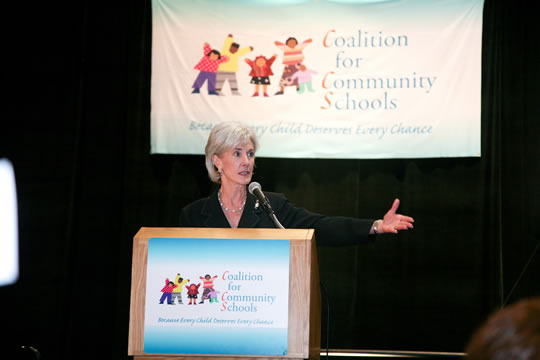Past News
IEL Celebrates White House Champions of Change
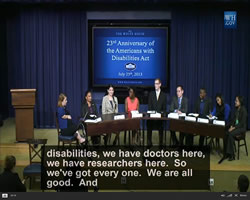 To commemorate the 23rd Anniversary of the passage of the Americans with Disabilities Act (ADA), the White House honored eight "Champions of Change," young people with disabilities who are having a significant impact on their communities. The Champions of Change participated in an engaging panel about issues affecting this generation of disability rights leaders. The Institute for Educational Leadership's (IEL) Center for Workforce Development (CWD) is proud to be connected with many of these emerging disability community leaders as they work across systemic and institutional boundaries to improve programs and services for people with disabilities.
To commemorate the 23rd Anniversary of the passage of the Americans with Disabilities Act (ADA), the White House honored eight "Champions of Change," young people with disabilities who are having a significant impact on their communities. The Champions of Change participated in an engaging panel about issues affecting this generation of disability rights leaders. The Institute for Educational Leadership's (IEL) Center for Workforce Development (CWD) is proud to be connected with many of these emerging disability community leaders as they work across systemic and institutional boundaries to improve programs and services for people with disabilities.
Zoe Gross, a current Patricia Morrissey Disability Policy Fellow at IEL spoke about her work organizing the Disability Day of Mourning, an annual event that remembers people with disabilities who have lost their lives at the hands of their family members or caregivers.
Lydia Brown, a former IEL Patricia Morrissey Disability Policy Fellow, discussed the improvements for people with disabilities she is making on her college campus and in her home state of Massachusetts where she has made efforts to close the Judge Rotenberg Center.
Zach Garafalo, the Assistant Director of YOUTH POWER! spoke about his work with IEL's Ready to Achieve Mentoring Program (RAMP) a career-focused mentoring program for youth involved with or at risk of becoming involved with the juvenile justice system. .
The panel was moderated by Rebecca Cokley, Executive Director of the National Council on Disability whose time at IEL helped form the basis of many of the youth-led materials and trainings used by the Center for Workforce Development. Cokley created the Patricia Morrissey Disability Policy Fellowship program and the National Consortium on Leadership and Disability for Youth while at IEL.
IEL is proud of these next generation disability community leaders and looks forward to more incredible work from all of the Champions of Change!
New Survey Reveals Impact of Disability Community on Political Landscape
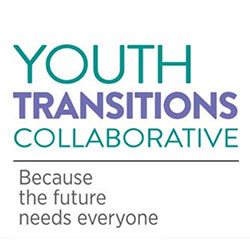 On July 12, the Youth Transitions Collaborative (YTC) released the results of its recent survey of over 1000 individuals with disabilities. YTC calls it "the first survey of its kind to study the political impact of this large community of people with disabilities, their families and caregivers." According to the U.S. Census, roughly one in five Americans has a disability.
On July 12, the Youth Transitions Collaborative (YTC) released the results of its recent survey of over 1000 individuals with disabilities. YTC calls it "the first survey of its kind to study the political impact of this large community of people with disabilities, their families and caregivers." According to the U.S. Census, roughly one in five Americans has a disability.
The survey highlights the views of an emerging generation of advocates and voters with disabilities who may be more engaged in the political process than previous generations. The survey found that people with disabilities are as politically diverse as the general populace and are not single-issue voters. Still, voters with disabilities across political affiliations—especially young voters—are likely to vote against candidates who support reducing or eliminating services and supports for people with disabilities.
The development of the survey was led by the YTC's Advocacy Working Group, which includes the American Association of People with Disabilities, Autistic Self Advocacy Network, The HSC Foundation, Institute for Educational Leadership, National Council on Independent Living, and United Cerebral Palsy.
Read the full YTC press release or executive summary of the survey.
IEL Seeks Director of Institutional Advancement and Communications
 Working with the IEL Leadership Team, this multi-faceted position has the Director responsible for a) coordinating and implementing IEL's development plan; b) guiding communications with external stakeholders and constituencies; c) planning and managing key IEL-wide events including 50th anniversary activities in 2014 and d) assisting with IEL Board Committee management.
Working with the IEL Leadership Team, this multi-faceted position has the Director responsible for a) coordinating and implementing IEL's development plan; b) guiding communications with external stakeholders and constituencies; c) planning and managing key IEL-wide events including 50th anniversary activities in 2014 and d) assisting with IEL Board Committee management.
IEL Releases New Paper on the Role of Community Schools in Place-Based Initiatives
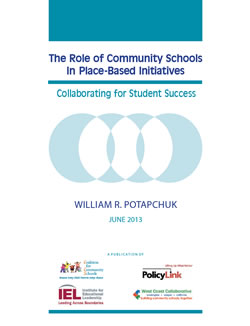 Across the United States, communities are thinking differently about how to transform their schools and neighborhoods. There is tremendous excitement about strategies that weave together resources in a clearly defined "place" to collectively improve outcomes for children, youth, families, and communities.
Across the United States, communities are thinking differently about how to transform their schools and neighborhoods. There is tremendous excitement about strategies that weave together resources in a clearly defined "place" to collectively improve outcomes for children, youth, families, and communities.
The Role of Community Schools in Place-Based Initiatives: Collaborating for Student Success explores the relationship between various place-based strategies and the potential associated with the alignment of these strategies operating within the same geographic areas. The paper demonstrates that community schools offer a powerful vision and strategy for what schools should look like within broader place based initiatives and how community schools can benefit from alignment with other efforts.
The paper is co-published by the Coalition for Community Schools, Institute for Educational Leadership, PolicyLink and the West Coast Collaborative.
IEL Staff Member to Compete in 2013 Para-Rowing World Championship
 On Monday, July 8, IEL staff member Dana Fink earned a place on the U.S. Para-Rowing Team. She will participate in the 2013 Para-Rowing World Championships in Chungju, South Korea next month. Fink competes in the arms and shoulder single sculler event, which she won at Monday's trials by over 30 seconds.
On Monday, July 8, IEL staff member Dana Fink earned a place on the U.S. Para-Rowing Team. She will participate in the 2013 Para-Rowing World Championships in Chungju, South Korea next month. Fink competes in the arms and shoulder single sculler event, which she won at Monday's trials by over 30 seconds.
Para-Rowing is rowing or sculling open to both male and female rowers with a disability. The sport is practiced by athletes in at least 27 countries from 5 regions and continues to grow. It was introduced into the Paralympic program in 2005 and held its first Paralympic events in Beijing in 2008. At the second appearance of rowing at the 2012 London Paralympic Games, 23 countries competed for 12 medals in four events with a total of 48 boats and 96 rowers.
"I've been a competitive athlete for a really long time, although I'm still kind of new to the rowing world. I've only been rowing for three years," says Fink. "I think I'm pretty good at getting into that competitive athlete mentality from my past experiences. Now I'm working on perfecting that technique for rowing and breaking some of those bad habits before they get ingrained."
Fink is an Assistant Project Coordinator in IEL's Center for Workforce Development (CWD) and helps coordinate IEL's DC Advocacy Partners initiative and manages social media for the IEL-housed National Collaborative on Workforce and Disability for Youth and other IEL/CWD initiatives. A graduate of the University of Illinois at Urbana-Champaign, Fink competed on the University's women's wheelchair basketball team on an athletic scholarship was a two-time wheelchair basketball national champion and an Academic All-American winner. She is training for and has her sights set on rowing in the 2016 Summer Paralympic Games.
U.S. Department of Education Launches Principal Ambassador Fellowship: Application Deadline 07/16
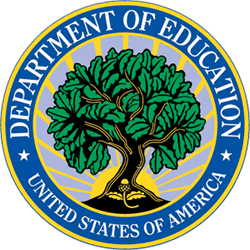 On June 12th the U.S. Department of Education announced the launch of its Principal Ambassador Fellowship. Based on the Teacher Ambassador Fellowship, the program brings school principals to Washington, DC in order to learn about key federal education policies and programs. Ambassadors spend one year in the program and work with Department staff, sharing experiences and expertise. This program helps to highlight the significant role principals play in instructional leadership and school environment. Read Full Press Release.
On June 12th the U.S. Department of Education announced the launch of its Principal Ambassador Fellowship. Based on the Teacher Ambassador Fellowship, the program brings school principals to Washington, DC in order to learn about key federal education policies and programs. Ambassadors spend one year in the program and work with Department staff, sharing experiences and expertise. This program helps to highlight the significant role principals play in instructional leadership and school environment. Read Full Press Release.
To apply for the 2013-2014 school year, please visit www.usajobs.gov and apply to Campus Principal Ambassador Fellowship by July 16, 2013 at 11:59 PM EDT.
Webinar to Solicit Feedback on Interagency Working Group on Youth Programs Draft Strategic Plan
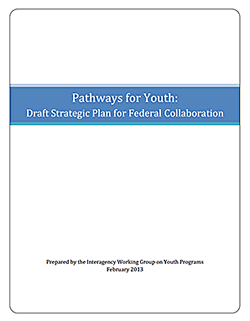 The Forum for Youth Investment, in partnership with the National Collaboration for Youth, the American Institutes for Research, the Campaign for Youth, and the Aspen Forum for Community Solutions, is convening a webinar for the public to learn about plans by the Obama administration to support comprehensive efforts for youth, especially disconnected youth. The webinar will focus on the need for coordinated federal polices to support comprehensive, place-based interagency efforts to enable community partnerships to have a stronger, positive collective impact on young people's lives.
The Forum for Youth Investment, in partnership with the National Collaboration for Youth, the American Institutes for Research, the Campaign for Youth, and the Aspen Forum for Community Solutions, is convening a webinar for the public to learn about plans by the Obama administration to support comprehensive efforts for youth, especially disconnected youth. The webinar will focus on the need for coordinated federal polices to support comprehensive, place-based interagency efforts to enable community partnerships to have a stronger, positive collective impact on young people's lives.
Martha Moorehouse, a recipient of the Ready by 21 Policymaker of the Year Award and chair of the Interagency Working Group on Youth Programs, and Sarah Oberlander, who leads the Working Group's production of FindYouthInfo.gov, will present Pathways for Youth, the working group's draft strategic plan for federal collaboration, and invites participants to provide feedback.
Kathy Stack of the White House Office of Management and Budget and Johan Uvin of the U.S. Department of Education will present the latest work from the Interagency Forum on Disconnected Youth, which they co-chair. Last year, on a webinar hosted by the Forum for Youth Investment, Stack asked participants to help shape the federal government's work through a Request for Information (RFI) about disconnected youth. Hundreds of organizations and individuals responded. Stack and Uvin will discuss what was learned through the RFI and the next steps they plan to advance this work. They invite your feedback.
Webinar Dates:
- July 17, 12:30-1:30 p.m. ET. Click here to RSVP
- July 17, 1:30-2:30 p.m. ET. Click here to RSVP
Join IEL & AERA for the ED Policy Forum: "Early Childhood Education in the U.S." 07/08/13
 The next AERA/IEL Education Policy Forum Luncheon on the topic of " Early Childhood Education in the U.S.: Problems, Prospects, and Politics " will be held on Monday, July 7, 2013 from noon until 2:00 pm at the American Association of Colleges for Teacher Education in the ground floor conference room (1307 New York Ave. NW). Thirteen dollars for the subsidized lunch will be collected at the door. Required reservations may be sent by email to Christy Talbot at AERA.
The next AERA/IEL Education Policy Forum Luncheon on the topic of " Early Childhood Education in the U.S.: Problems, Prospects, and Politics " will be held on Monday, July 7, 2013 from noon until 2:00 pm at the American Association of Colleges for Teacher Education in the ground floor conference room (1307 New York Ave. NW). Thirteen dollars for the subsidized lunch will be collected at the door. Required reservations may be sent by email to Christy Talbot at AERA.
Limited available seating is assigned according to the order in which reservations are received.
President Obama, in the State of the Union Address, called for a major initiative in early childhood education, declaring:
Every dollar we invest in high-quality early childhood education can save more than seven dollars later on -- by boosting graduation rates, reducing teen pregnancy, even reducing violent crime. In states that make it a priority to educate our youngest children, like Georgia or Oklahoma, studies show students grow up more likely to read and do math at grade level, graduate high school, hold a job, form more stable families of their own. We know this works. So let's do what works and make sure none of our children start the race of life already behind. Let's give our kids that chance.
In June, Senator Patty Murray, offering the keynote address at a CAP meeting, declared:
We've got decades of research showing that quality early childhood education can have enormous benefits for young children—and our country as a whole. And we know that expanding quality, affordable early education could help millions of working parents—and parents who want to work—right now.
We have a moral imperative to stop just talking about this and start getting something done.
Our discussion will consider the status of early childhood education in the U.S., policies now under consideration that might improve the circumstances of young children and their families, and the political realities confronting the Obama initiative.
Resources:
- Lisa Guernsey is Director of the New America Foundation's Early Education Initiative and editor of the Early Ed Watch blog. A journalist by training, Ms. Guernsey has been a technology and education writer at The New York Times and The Chronicle of Higher Education, and is the author of Screen Time: How Electronic Media – From Baby Videos to Educational Software – Affects Your Young Child.
*Required reservations may be sent by email to Christy Talbot at AERA.
Coalition for Community Schools Launches Expanded Learning Opportunities Blog Series
 Every Wednesday the Coalition will post a new blog on how districts and their community partners are finding effective ways to implement different ELO types, including: summer; after school; before school; intercessions; expanded school day, week and year; and ELO during the conventional school day.
Every Wednesday the Coalition will post a new blog on how districts and their community partners are finding effective ways to implement different ELO types, including: summer; after school; before school; intercessions; expanded school day, week and year; and ELO during the conventional school day.
USDOL Awards IEL $5M Juvenile Offender Grant for Right Turn Initiative
 On June 6, the U.S. Department of Labor's (USDOL) Employment and Training Administration awarded the Institute for Educational Leadership's (IEL) Center for Workforce Development a $5 million, 39-month grant to serve juvenile offenders in high-poverty, high-crime communities.
On June 6, the U.S. Department of Labor's (USDOL) Employment and Training Administration awarded the Institute for Educational Leadership's (IEL) Center for Workforce Development a $5 million, 39-month grant to serve juvenile offenders in high-poverty, high-crime communities.
In the next six months, IEL will competitively select five community organizations or partnerships in at least two different states to implement the proposed Right Turn program, based on decades of IEL's work promoting improved services for at risk youth, including youth with disabilities, youth in juvenile justice, and other disconnected populations.
The Right Turn initiative will adapt IEL's Making the Right Turn: A Guide About Improving Transition Outcomes for Youth Involved in the Juvenile Corrections System, the Guideposts for Success youth transition framework, the three career development phases gleaned from the Individualized Learning Plan research and demonstration project, and lessons learned from the Ready to Achieve Mentoring Program (RAMP).
Right Turn will serve 1000 juvenile offenders, 25% of which will be youth in confinement. Sites will work with youth to provide them with comprehensive reentry and transition services, including connection to educational opportunities, mentoring, soft skills and independent living skills development, work skills and workforce development opportunities, community violence prevention, and more. After a six-month site selection and project planning period, IEL will serve youth beginning in January 2014.
Read the full USDOL press release.
Coalition for Community Schools support the reintroduction of the Developing Innovative Partnerships and learning Opportunities that Motivate Achievement (DIPLOMA) Act
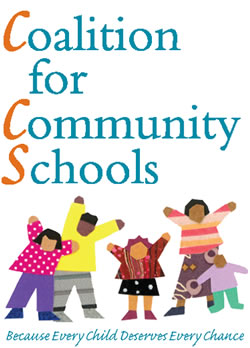 The Coalition for Community Schools and First Focus, representing millions of parents, teachers and other education professionals, students, higher education, youth development, health and social services and business leaders, commend Representative Judy Chu on the introduction of legislation to address the comprehensive needs of students through the Developing Innovative Partnerships and learning Opportunities that Motivate Achievement (DIPLOMA) Act. The legislation provides grants for states to strengthen student achievement in the classroom by addressing many challenges students face outside of school. Through tutoring, extended learning, health care and social support, the DIPLOMA Act will enable every student to reach his or her fullest potential.
The Coalition for Community Schools and First Focus, representing millions of parents, teachers and other education professionals, students, higher education, youth development, health and social services and business leaders, commend Representative Judy Chu on the introduction of legislation to address the comprehensive needs of students through the Developing Innovative Partnerships and learning Opportunities that Motivate Achievement (DIPLOMA) Act. The legislation provides grants for states to strengthen student achievement in the classroom by addressing many challenges students face outside of school. Through tutoring, extended learning, health care and social support, the DIPLOMA Act will enable every student to reach his or her fullest potential.
Join IEL & AERA for the ED Policy Forum: "Ever Shifting Federalism: Perspectives on the Shaping of Educational Policy" 6/12
 The next AERA/IEL Education Policy Forum Luncheon on the topic of "Ever Shifting Federalism: Perspectives on the Shaping of Educational Policy" will be held on Wednesday, June 12, 2013 from noon until 2:00 pm at the Charles Sumner School in the Richard L. Hurlbut Memorial Hall on the third floor (17th and M Street, NW). Thirteen dollars for the subsidized lunch will be collected at the door. Required reservations may be sent by email (ctalbot@aera.net) to Christy Talbot at AERA.
The next AERA/IEL Education Policy Forum Luncheon on the topic of "Ever Shifting Federalism: Perspectives on the Shaping of Educational Policy" will be held on Wednesday, June 12, 2013 from noon until 2:00 pm at the Charles Sumner School in the Richard L. Hurlbut Memorial Hall on the third floor (17th and M Street, NW). Thirteen dollars for the subsidized lunch will be collected at the door. Required reservations may be sent by email (ctalbot@aera.net) to Christy Talbot at AERA.
Limited available seating is assigned according to the order in which reservations are received.
Who is in charge now? The nation's federal system through which local, state and federal governments share education policy responsibilities is constantly undergoing change. Although education constitutionally remains a state responsibility, programs such as NCLB, Race to the Top, the current waiver process, and other initiatives have provided the federal government with unprecedented influence. However, as the state-driven "common core" issue begins to dominate the policy scene, changing federal-state relationships have raised the important question of the relative influence of the different policy sectors.
This Forum will focus upon the influence and perspectives of state policymakers as education once again is caught up in the dynamics of changing federal-state relationships.
Resource:
- Lee White Posey works with the Education Committee of the National Conference of State Legislators and conducts Washington-based lobbying activities on education issues for NCSL. She formerly worked as a Policy Analyst for the Georgia State Senate and the Georgia Governor's Office of Planning and Budget.
The Education Policy Fellowship Program (EPFP™) Seeks Applicants
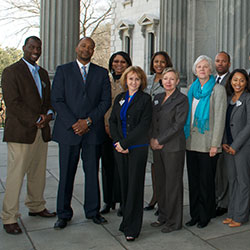
The Institute for Educational Leadership (IEL), in partnership with its thirteen state-based program sites, is now recruiting for the 2013-2014 cohort of the Education Policy Fellowship Program (EPFP™). EPFP™ is a professional development program for individuals whose work record reflects strong leadership ability and a concern for issues important to children and education. Participants hold full-time positions in diverse organizations at the local, state, and national levels. EPFP™ combines regular meetings and activities specific to each State site program with events of national scope to provide an enriching experience for more than 200 Fellows each year.
The program currently operates through sites in Colorado, Connecticut, Georgia, Massachusetts, Michigan, Minnesota, Mississippi, New York, North Carolina, Ohio, Pennsylvania, South Carolina, and Washington, DC. Click here to learn more about each state site program including application deadlines and how to apply.
Contact epfp@iel.org if you have any questions.
Webinar: "Using Individualized Learning Plans to Increase College & Career Readiness of All Students" 05/16
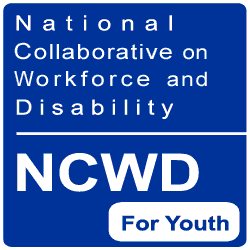 IEL, which houses NCWD/Youth, is hosting a webinar that will highlight key findings from NCWD/Youth's research on the use of Individualized Learning Plans (ILPs) on Monday, May 16th from 1:30-3:00pm ET. An ILP is both a document and a process that a student uses – with support from school counselors, teachers, and parents – to define their career goals and postsecondary plans in order to inform the student's decisions about courses and activities throughout high school. Many states have adopted policies that require all students to use ILPs starting in middle school as a way to personalize learning and increase college and career readiness. With funding from the U.S. Department of Labor's Office of Disability Employment Policy, NCWD/Youth has conducted longitudinal research to determine whether and how ILPs could be considered as a promising strategy for developing college and career readiness. In addition to sharing research findings, webinar presenters will recommend actions for educational leaders at the state and local levels interested in successful transitions of youth from adolescence to adulthood.
IEL, which houses NCWD/Youth, is hosting a webinar that will highlight key findings from NCWD/Youth's research on the use of Individualized Learning Plans (ILPs) on Monday, May 16th from 1:30-3:00pm ET. An ILP is both a document and a process that a student uses – with support from school counselors, teachers, and parents – to define their career goals and postsecondary plans in order to inform the student's decisions about courses and activities throughout high school. Many states have adopted policies that require all students to use ILPs starting in middle school as a way to personalize learning and increase college and career readiness. With funding from the U.S. Department of Labor's Office of Disability Employment Policy, NCWD/Youth has conducted longitudinal research to determine whether and how ILPs could be considered as a promising strategy for developing college and career readiness. In addition to sharing research findings, webinar presenters will recommend actions for educational leaders at the state and local levels interested in successful transitions of youth from adolescence to adulthood.
Webinar presenters will include:
- Dr. V. Scott Solberg, Associate Dean of Research, Boston University School of Education
- June Sanford, Connecticut State Department of Education
- Mindy Larson, Senior Program Associate, Center for Workforce Development, Institute for Educational Leadership
Learn more about the ILP Research & Demonstration Project and available resources including the ILP How-to Guide.
Join us for the Danzberger Memorial Lecture - "The Power of Their Ideas" – Reception & Book Signing Monday April, 22
 Join IEL for the 13th Annual Danzberger Memorial Lecture presented by Deborah Meier on Monday, April 22nd from 4:00 PM until 6:00 PM at the Renaissance Washington, DC Downtown Hotel (999 Ninth St, NW; Washington, DC 20001).
Join IEL for the 13th Annual Danzberger Memorial Lecture presented by Deborah Meier on Monday, April 22nd from 4:00 PM until 6:00 PM at the Renaissance Washington, DC Downtown Hotel (999 Ninth St, NW; Washington, DC 20001).
Working under the protection (aka leadership) of a risk-taking district superintendent, Deborah Meier and determined educators established Central Park East in East Harlem as a school inside the NYC public school system. The goal: "to provide at public expense for the least advantaged what the most advantaged bought privately for their children." Most students are from low-income, minority families; nearly all graduate, go on to college, and do well. Meier will reveal the strategies central to the school's success, and discuss how to design schools focused on equity and democracy while establishing an environment of trust. A few words about the recent cheating scandal(s) will highlight contrasting visions of schooling. In addition, she will discuss how to turn Central Park's vision of schooling into a reality and identify the leadership required at all levels.
Coalition for community schools launched the Community Schools Coordinators Network
 The Community Schools Coordinators Network is a forum for Community School Coordinators to share ideas and experiences, ask questions and get answers from their peers, as well as have a centralized online location to find resources and tools. Some community schools initiatives have many coordinators to support each other, others may only have a few, either way this network is a place to make connections so that no one has to reinvent the wheel and we can all learn from each other.
The Community Schools Coordinators Network is a forum for Community School Coordinators to share ideas and experiences, ask questions and get answers from their peers, as well as have a centralized online location to find resources and tools. Some community schools initiatives have many coordinators to support each other, others may only have a few, either way this network is a place to make connections so that no one has to reinvent the wheel and we can all learn from each other.
The Network members’ are people working in a coordinating position at local community schools. Their role broadly encompasses mobilizing and aligning partners with the work of the school and coordinating opportunities and supports for students, their families and the community. These individuals manage relationships between schools and external community partners including community-based organizations, businesses, health and human service agencies and institutions of higher education, among others.
Website Link: http://coordinators.communityschools.org
NCWD/Youth Releases Policy Brief on Using Individualized Learning Plans to Increase College & Career Readiness
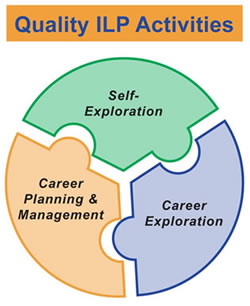 The National Collaborative on Workforce and Disability for Youth (NCWD/Youth), housed at IEL's Center for Workforce Development, has released the policy brief, Using Individualized Learning Plans to Produce College and Career Ready High School Graduates, summarizing findings and recommendations from a multi-year individualized learning plans (ILP) research and demonstration project funded by the U.S. Department of Labor's Office of Disability Employment Policy. Individualized learning plans (ILPs) are increasingly used by states and school districts to support youth in becoming college and career ready. An ILP is both a document and a process that students use – with support from school counselors, teachers, and parents – to define their career goals and postsecondary plans in order to inform the student’s decisions about their courses and activities throughout high school. Thirty-five states currently engage middle and/or high school students in ILPs.
The National Collaborative on Workforce and Disability for Youth (NCWD/Youth), housed at IEL's Center for Workforce Development, has released the policy brief, Using Individualized Learning Plans to Produce College and Career Ready High School Graduates, summarizing findings and recommendations from a multi-year individualized learning plans (ILP) research and demonstration project funded by the U.S. Department of Labor's Office of Disability Employment Policy. Individualized learning plans (ILPs) are increasingly used by states and school districts to support youth in becoming college and career ready. An ILP is both a document and a process that students use – with support from school counselors, teachers, and parents – to define their career goals and postsecondary plans in order to inform the student’s decisions about their courses and activities throughout high school. Thirty-five states currently engage middle and/or high school students in ILPs.
The policy brief highlights key findings from the ILP studies, which examined: whether and how ILPs may be considered a promising strategy for developing college and career readiness; and whether and how students with disabilities are participating in ILPs. The policy brief also recommends actions for a diversity of stakeholders including state officials, district/school officials, educators, organizations interested in supporting family engagement in schools, special education administrators and support organizations, national organizations, disability organizations, and Federal officials. Read or download the policy brief online. More information about the ILP Research & Demonstration Project including the ILP Fact Sheet, the ILP How-to Guide, journal articles, and details about the project partners is available at: http://www.ncwd-youth.info/ilp/.
Afterschool for America's Children Act Introduced
 "Studies have shown that afterschool programs are an enormous net-positive for our children," says Senator Lisa Murkowski, a member of a bipartisan coalition attempting to preserve programs that serve our neediest students. Over the last decade, millions of children have had access to after school programs because of the 21st Century Community Learning Centers (CCLC) program. Senators Barbara Boxer (D-CA), Lisa Murkowski (R-AK) and Patty Murray (D-WA) have introduced legislation that could reauthorize the CCLC program under the name, the Afterschool for America's Children Act. Read more about this important legislation that could potentially fund safe, and enriching afterschool programs for children across the U.S.
"Studies have shown that afterschool programs are an enormous net-positive for our children," says Senator Lisa Murkowski, a member of a bipartisan coalition attempting to preserve programs that serve our neediest students. Over the last decade, millions of children have had access to after school programs because of the 21st Century Community Learning Centers (CCLC) program. Senators Barbara Boxer (D-CA), Lisa Murkowski (R-AK) and Patty Murray (D-WA) have introduced legislation that could reauthorize the CCLC program under the name, the Afterschool for America's Children Act. Read more about this important legislation that could potentially fund safe, and enriching afterschool programs for children across the U.S.
IEL Staff Contribute Chapter to New Compendium on Expanded Learning Opportunities
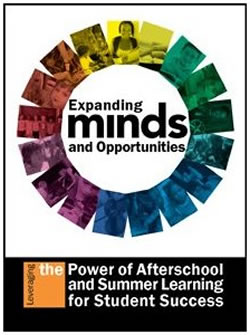 Expanding Minds and Opportunities: Leveraging the Power of Afterschool and Summer Learning for Student Success, edited by IEL's Coalition of Community Schools Steering Committee member Terry K. Peterson, Ph.D., is a groundbreaking compendium of studies, reports and commentaries by more than 100 thought leaders including community leaders, elected officials, educators, researchers, advocates and other prominent authors.
Expanding Minds and Opportunities: Leveraging the Power of Afterschool and Summer Learning for Student Success, edited by IEL's Coalition of Community Schools Steering Committee member Terry K. Peterson, Ph.D., is a groundbreaking compendium of studies, reports and commentaries by more than 100 thought leaders including community leaders, elected officials, educators, researchers, advocates and other prominent authors.
Supported by the C.S. Mott Foundation, this powerful collection of nearly 70 articles presents bold and persuasive evidence—as well as examples of effective practices, programs and partnerships—that demonstrate how opportunities after school and during the summer are yielding positive outcomes for authentic student, community and family engagement in learning. The compendium includes a chapter authored by IEL's Martin J. Blank and Reuben Jacobson which demonstrates the powerful connection between afterschool programs and community schools. Read the chapter.
Read Taking Expanded Learning to Scale: California's Road to Success by Coalition Steering Committee member Jennifer Peck.
Webinar 02/13: "Systemic Approaches to Improving Outcomes for Young Men of Color" Featuring Kwesi Rollins
 Explore how what we're learning about why some schools make more progress than others is beginning to inform a range of systemic efforts to improve outcomes for young men of color. Through the lens of full-service, community school initiatives we'll look at how a focus on early literacy; connections between early childhood education, transition and alignment in the early grades; family and community engagement linked to learning; good professional development; and school discipline policy reform provide the best context for achieving the results we want. Join S. Kwesi Rollins, Director of Leadership Programs at the Institute for Educational Leadership (home of the Coalition for Community Schools) for this important conversation on Wednesday, February 13, 2013 from 3:00 PM - 4:15 PM EST.
Explore how what we're learning about why some schools make more progress than others is beginning to inform a range of systemic efforts to improve outcomes for young men of color. Through the lens of full-service, community school initiatives we'll look at how a focus on early literacy; connections between early childhood education, transition and alignment in the early grades; family and community engagement linked to learning; good professional development; and school discipline policy reform provide the best context for achieving the results we want. Join S. Kwesi Rollins, Director of Leadership Programs at the Institute for Educational Leadership (home of the Coalition for Community Schools) for this important conversation on Wednesday, February 13, 2013 from 3:00 PM - 4:15 PM EST.
To register for this webinar, please go to: https://www1.gotomeeting.com/register/957808800
This webinar is sponsored by the National School Boards Association's Council of Urban Boards of Education
Event 02/05: Release of Expanding Minds and Opportunities: Leveraging the Power of Afterschool and Summer Learning for Student Success
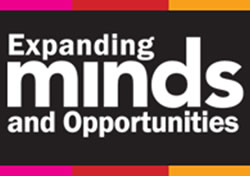 Tuesday, February 5, 2013
Tuesday, February 5, 2013
Live Webcast, 9-10am
Register Now!
Streamed live from the National Press Club in Washington, DC, this live webcast will unveil a groundbreaking new compendium, Expanding Minds and Opportunities: Leveraging the Power of Afterschool and Summer Learning for Student Success.
Edited by Terry K. Peterson, Ph.D., this seminal work features studies, reports and commentaries by more than 100 thought leaders including elected officials, educators, researchers, advocates and other prominent authors.
Join us as we highlight the bold and persuasive evidence from the field that engaging opportunities—drawing from robust partnerships—yield positive outcomes for students and for community and family engagement in learning.
In conjunction with the Expanded Learning and Afterschool Project, this event and publication are made possible by the C.S. Mott Foundation.
Speakers will include:
Mayor Christopher Coleman, City of St. Paul, MN
Gail Connelly, National Association of Elementary School Principals
Delia Pompa, National Council of La Raza
Ayeola Fortune, United Way Worldwide
Deborah Lowe Vandell, University of California, Irvine
Jim Kohlmoos. National Association of State Boards of Education
DC Public Schools Launches RAMP-Based Career Focused Mentoring Program
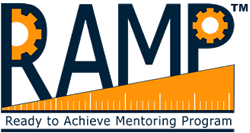 After consulting with IEL staff and using resources from the IEL's Ready to Achieve Mentoring Program (RAMP) and the National Collaborative on Workforce and Disability for Youth (NCWD/Youth), the District of Columbia Public Schools (DCPS) launched a new career-focused mentoring program for high school students with disabilities. The program, called Competitive Employment Opportunities (CEO), will connect high school students with disabilities to professional mentors who work in a range of competitive occupations. The CEO program will focus on providing students with career exploration, soft skills training, goal-setting support and paid internship opportunities. Approximately 20 students will participate in the program.
After consulting with IEL staff and using resources from the IEL's Ready to Achieve Mentoring Program (RAMP) and the National Collaborative on Workforce and Disability for Youth (NCWD/Youth), the District of Columbia Public Schools (DCPS) launched a new career-focused mentoring program for high school students with disabilities. The program, called Competitive Employment Opportunities (CEO), will connect high school students with disabilities to professional mentors who work in a range of competitive occupations. The CEO program will focus on providing students with career exploration, soft skills training, goal-setting support and paid internship opportunities. Approximately 20 students will participate in the program.
"This new program will engage our students with disabilities in a new way, and provide them with opportunities for real on-the-ground job experience. This program also supports our strategic goals by engaging students through interesting opportunities and preparing them for college and career. I'm very excited to see this program in action," says D.C. Mayor Vincent Gray. "The CEO Program is integral to ensuring not only that our students with disabilities get the best education possible, but also that they are prepared to compete in the new economy that is emerging in the District of Columbia. Every child in D.C. deserves the chance to learn the skills they need to enjoy a life of working to support themselves and contributing to their community."
The CEO Program design is based on best practices identified by the IEL's RAMP and NCWD/Youth initiatives. DCPS will gauge the success of the program based on increased student confidence and increased ability for students to display skills such as professionalism, communication, time management, budgeting and problem solving. The success of the program will also be gauged based on higher rates of student employment and students clearly defining postsecondary goals and next steps.
Key resources that DCPS pulled from include RAMP's Individualized Mentoring Plan and NCWD/Youth's Paving the Way to Work: A Guide to Career-Focused Mentoring for Youth with Disabilities.
Read the full DCPS press release.
IEL & AYPF to Host Feb. 15 Capitol Hill Forum on Individualized Learning Plans
 The Institute for Educational Leadership's Center for Workforce Development (CWD) is partnering with the American Youth Policy Forum (AYPF) to host a Capitol Hill Forum on February 15, 2013 at 12:00 to 1:30 p.m. on "The Use of Individualized Learning Plans to Help Students to be College and Career Ready." Those interested in attending are invited to register for this free event online.
The Institute for Educational Leadership's Center for Workforce Development (CWD) is partnering with the American Youth Policy Forum (AYPF) to host a Capitol Hill Forum on February 15, 2013 at 12:00 to 1:30 p.m. on "The Use of Individualized Learning Plans to Help Students to be College and Career Ready." Those interested in attending are invited to register for this free event online.
Preparing for college and careers requires far more than rigorous academic content. College and career exploration and planning activities can play a beneficial role in personalizing learning, engaging students, and preparing them for life beyond school. This event will highlight findings from the IEL CWD's research on the use of Individualized Learning Plans (ILP), which provide middle school and high school students with a tool to define their personal interests, goals, and course choices through postsecondary education and into careers. Many states have adopted policies that require the use of ILPs and research is starting to show the benefits. The Center for Workforce Development has conducted longitudinal research, funded by the U.S. Department of Labor's Office of Disability Employment Policy, to assess the effectiveness of ILPs, and it implemented a demonstration project to better understand their impact on post-school outcomes.
Presenters will summarize the research findings and discuss practitioners' and policymakers' experiences implementing and scaling up the use of ILPs. Presenters will include Dr. Terry Holliday, Kentucky Commissioner of Education, Joan Wills, Senior Policy Fellow, Center for Workforce Development, Institute for Educational Leadership, and Dr. Scott Solberg, Associate Dean of Research, Boston University. To learn more about the Capitol Hill Forum and register, visit the AYPF website. To learn more about IEL CWD's work on Individualized Learning Plans, visit the NCWD/Youth website.
Community Schools Make an Impact in Early Childhood Education
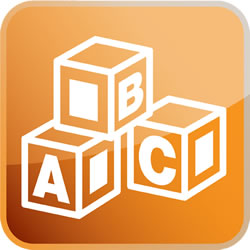 Community schools have been making tremendous breakthroughs in early childhood education. These breakthroughs were on display during a symposium hosted by the New America Foundation January 14 in Washington D.C where local community leaders were featured speakers on a panel of early childhood experts and practitioners.
Community schools have been making tremendous breakthroughs in early childhood education. These breakthroughs were on display during a symposium hosted by the New America Foundation January 14 in Washington D.C where local community leaders were featured speakers on a panel of early childhood experts and practitioners.
Young children in community schools had greater comfort with school and readiness to engage in the instructional program and showed improved attendance and academic achievement; parents had increased capacity and efficacy to support their children; and schools demonstrated better coordination between educators as children transition from preschool settings to kindergarten and primary school as a result of the early childhood systems in place in community schools. The Coalition for Community Schools released several new reports and resources demonstrating these results in early education in community schools in conjunction with the New America Foundation symposium. Read more.
Coalition for Community Schools Urges NY Gov. Cuomo to Adopt Community School Strategy
 An education task force convened by New York Governor Andrew Cuomo recommended restructuring its schools as community schools in a preliminary action plan presented to the governor Jan 2.
An education task force convened by New York Governor Andrew Cuomo recommended restructuring its schools as community schools in a preliminary action plan presented to the governor Jan 2.
The Coalition for Community Schools fully supports The New York Education Reform Commission call for the state to focus on providing more high-quality early childhood education for its neediest children, expanding learning opportunities for students, and integrating social, health, and other wraparound services through a community school strategy.
Members of the 25-person commission included former Time Warner CEO Richard Parsons, American Federation of Teachers President Randi Weingarten, Harlem Children's Zone Founder Geoffrey Canada, founder of the Campaign for Educational Equity Michael Rebell. The commission was appointed earlier this year with the task of reviewing the state's educational system and finding more efficient operating models that would produce financial savings and boost academic achievement. That commission cited the success of community schools in Cincinnati and across New York in its recommendations.
ED Announces 5 More Race to the Top Early-Learning Challenge Grant Winners
 Colorado, Illinois, New Mexico, Oregon, and Wisconsin will all receive a share of $133 million in funding under the second round of the Race to the Top-Early Learning Challenge. The grant competition focused on improving early learning and development programs for young children in order to give them a strong start to learning the skills needed to succeed in kindergarten through college and career. The competition guidelines called for an increase in the number of low-income children enrolled in high-quality early learning programs, the design and implementation of an integrated system of programs and services, and the use of assessments conforming to the recommendations of the National Research Council's reports on early childhood. Click here to learn more about the Early-Learning Challenge.
Colorado, Illinois, New Mexico, Oregon, and Wisconsin will all receive a share of $133 million in funding under the second round of the Race to the Top-Early Learning Challenge. The grant competition focused on improving early learning and development programs for young children in order to give them a strong start to learning the skills needed to succeed in kindergarten through college and career. The competition guidelines called for an increase in the number of low-income children enrolled in high-quality early learning programs, the design and implementation of an integrated system of programs and services, and the use of assessments conforming to the recommendations of the National Research Council's reports on early childhood. Click here to learn more about the Early-Learning Challenge.
IEL Board Member Leads the Charge on Family Engagement
 Dr. Karen Mapp, Lecturer on Education at the Harvard Graduate School of Education and Board member for IEL, presented at the Department of Education's Roundtable Discussion on Family Engagement, December 5, 2012. Dr. Mapp, joined by the Secretary of Education; Jim Shelton, Assistant Deputy Secretary; other department officials, as well as the Principal and staff from Stanton Elementary School, where the event was hosted, presented a new family engagement framework the DOE is rolling out. Utilizing families as partners with an emphasis on systemic, integrated work, the new Framework discusses the challenges, policies/initiatives, conditions, and outcomes for effective and meaningful family engagement. The overall goal as, Secretary Duncan frames it is – "to move from sort of feel good parental engagement, to results driven parental engagement." Check out the Flamboyan Foundation's video of the event, here.
Dr. Karen Mapp, Lecturer on Education at the Harvard Graduate School of Education and Board member for IEL, presented at the Department of Education's Roundtable Discussion on Family Engagement, December 5, 2012. Dr. Mapp, joined by the Secretary of Education; Jim Shelton, Assistant Deputy Secretary; other department officials, as well as the Principal and staff from Stanton Elementary School, where the event was hosted, presented a new family engagement framework the DOE is rolling out. Utilizing families as partners with an emphasis on systemic, integrated work, the new Framework discusses the challenges, policies/initiatives, conditions, and outcomes for effective and meaningful family engagement. The overall goal as, Secretary Duncan frames it is – "to move from sort of feel good parental engagement, to results driven parental engagement." Check out the Flamboyan Foundation's video of the event, here.
For more information regarding IEL's District Leaders Network on Family and Community Engagement (FCE) and additional resources on family engagement, visit the Network's website.
Join IEL & AERA for the ED Policy Forum 12/14- "Connecting Research to Policy: The Role of the Center on Education Policy"
 The next AERA/IEL Education Policy Forum Luncheon on the topic of " Connecting Research to Policy: The Role of the Center on Education Policy" will be held on Friday, December 14, 2012 from noon until 2:00 pm at the Charles Sumner School and Museum(17th and M St. NW).
The next AERA/IEL Education Policy Forum Luncheon on the topic of " Connecting Research to Policy: The Role of the Center on Education Policy" will be held on Friday, December 14, 2012 from noon until 2:00 pm at the Charles Sumner School and Museum(17th and M St. NW).
Thirteen dollars for the subsidized lunch will be collected at the door. Required reservations may be sent by email (ctalbot@aera.net) to Christy Talbot at AERA. Limited available seating is assigned according to the order in which reservations are received.
Founded by Jack Jennings, the Center on Education Policy (CEP) has been regarded by many as offering the most objective analysis of education policy. It has provided a platform for school reform by analyzing the impacts of federal policies as implemented by states and local districts, most recently with Race to the Top and the School Improvement Grants.
There have been some changes in CEP recently. With Jennings's retirement, CEP repositioned itself within the George Washington University's Graduate School of Education and Human Development and, most importantly, recruited a new Executive Director.
This policy forum will provide an introduction of Maria Ferguson, the new executive director of the CEP. Maria will stimulate a conversation about the continuing role of organization in analysis of education policy and practice in the context of the second Obama administration, and its future aspirations as a policy center.
Resource:
Maria Ferguson was Vice President for Policy at the Alliance for Excellent Education, following service as Director of the National School Boards Foundation, a nonprofit organization that works in conjunction with the National School Boards Association (NSBA) to strengthen and support school board leadership in local communities. She also was Director of Communication and Outreach Services for the U.S. Department of Education's Office of Elementary and Secondary Education during the Clinton administration.
Sign Up Today: Coalition for Community Schools Webinars (November and December)
 The Coalition for Community Schools is hosting several informative webinars over the next few weeks. Learn how to expand a community school initiative in your hometown, or what tax credits are available for low-income families, or how teacher unions can guide community school initiatives. To learn more about the webinars and how to register, visit www.communityschools.org/multimedia/webinars.aspx
The Coalition for Community Schools is hosting several informative webinars over the next few weeks. Learn how to expand a community school initiative in your hometown, or what tax credits are available for low-income families, or how teacher unions can guide community school initiatives. To learn more about the webinars and how to register, visit www.communityschools.org/multimedia/webinars.aspx
Community Schools Grab Media Spotlight
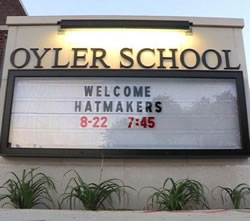 Community schools around the country are receiving significant attention and accolades. One community school initiative in particular, Cincinnati Public Schools’ Community Learning Centers community schools have been one of the hottest stories in education recently. From NBC News’ Education Nation to American Public Media’s Marketplace program, Community Learning Centers are showing that schools and their community, businesses, and union partners can work together to overcome poverty and raise the academic achievement of children. Community Learning Centers have helped make Cincinnati the highest performing urban school district in Ohio. Read more.
Community schools around the country are receiving significant attention and accolades. One community school initiative in particular, Cincinnati Public Schools’ Community Learning Centers community schools have been one of the hottest stories in education recently. From NBC News’ Education Nation to American Public Media’s Marketplace program, Community Learning Centers are showing that schools and their community, businesses, and union partners can work together to overcome poverty and raise the academic achievement of children. Community Learning Centers have helped make Cincinnati the highest performing urban school district in Ohio. Read more.
Apply Now & Save the Date: 2013 National Community Schools Awards for Excellence 06/06/13
 Are you a community school or community school initiative going above and beyond to create positive results for children, families, and your community? Applications to become a National Community Schools Award for Excellence Winner are now being accepted until December 15, 2012!
Are you a community school or community school initiative going above and beyond to create positive results for children, families, and your community? Applications to become a National Community Schools Award for Excellence Winner are now being accepted until December 15, 2012!
Awards ceremony will take place June 6, 2013 in Washington, DC. Following the awards ceremony join us for Education Day as we visit Capitol Hill to support Community Schools!
IEL Publication Recommended for Discussing Disability Disclosure in Schools
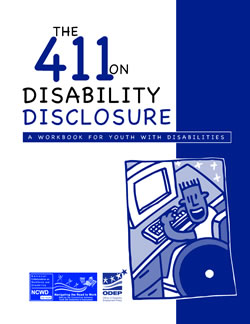 The article, “Meeting Matthew” in the Fall 2012 issue of Teaching Tolerance magazine tells the story of how one school helped students relate to a classmate with a hidden disability. The article describes how the school counselor collaborated with the teachers and family to assist a student with Asperger syndrome in disclosing his disability to classmates who were reacting negatively to his behaviors. The article recommends IEL’s publication, The 411 on Disability Disclosure: A Workbook for Youth with Disabilities, as a resource for discussing disability disclosure decisions with students and their families. Decisions about disclosing a disability are very personal and should always be left up to the student or individual with a disability. The workbook provides guidance to youth about the potential advantages and disadvantages of disability disclosure at school, in the workplace, and in social situations. Visit IEL’s National Collaborative on Workforce and Disability for Youth (NCWD/Youth) website to read or download the workbook and other publications on disability disclosure.
The article, “Meeting Matthew” in the Fall 2012 issue of Teaching Tolerance magazine tells the story of how one school helped students relate to a classmate with a hidden disability. The article describes how the school counselor collaborated with the teachers and family to assist a student with Asperger syndrome in disclosing his disability to classmates who were reacting negatively to his behaviors. The article recommends IEL’s publication, The 411 on Disability Disclosure: A Workbook for Youth with Disabilities, as a resource for discussing disability disclosure decisions with students and their families. Decisions about disclosing a disability are very personal and should always be left up to the student or individual with a disability. The workbook provides guidance to youth about the potential advantages and disadvantages of disability disclosure at school, in the workplace, and in social situations. Visit IEL’s National Collaborative on Workforce and Disability for Youth (NCWD/Youth) website to read or download the workbook and other publications on disability disclosure.
MA EPFP Event 11/08/12 – "Leadership: The Essential Foundation for Building the School Community Connection"
 IEL and the Massachusetts EPFP Coordinators invite you to join us for "Leadership: The Essential Foundation for Building the School Community Connection" a presentation by Martin J. Blank. Blank, who leads IEL and the Coalition for Community Schools will discuss the kinds of leaders we need to build deep and purposeful partnerships between schools and community partners. He will build on his experience in partnership development across the nation. The presentation will be held on Thursday, November 8th at the Egan Research Center’s Conference Room 440 at the Northeastern University Campus in Boston, MA. We hope that you can join us at 6:00 pm for networking. The talk will begin at 6:30 pm.
IEL and the Massachusetts EPFP Coordinators invite you to join us for "Leadership: The Essential Foundation for Building the School Community Connection" a presentation by Martin J. Blank. Blank, who leads IEL and the Coalition for Community Schools will discuss the kinds of leaders we need to build deep and purposeful partnerships between schools and community partners. He will build on his experience in partnership development across the nation. The presentation will be held on Thursday, November 8th at the Egan Research Center’s Conference Room 440 at the Northeastern University Campus in Boston, MA. We hope that you can join us at 6:00 pm for networking. The talk will begin at 6:30 pm.
To RSVP, please contact Angela Irving, MA EPFP Coordinator, at a.irving@neu.edu or 617-373-2630.
Personal Assistance Services Toolkit Now Available in E-Reader Format
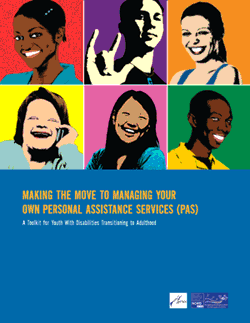 The U.S. Department of Labor’s Office of Disability Employment Policy’s popular publication Making the Move to Managing Your Own Personal Assistance Services (PAS) is now available for e-readers in both ePub and mobi formats. This toolkit is designed for youth with disabilities who are planning to live independently in the community but need help with daily tasks. It offers concrete steps to hiring, managing and paying for personal assistance services. IEL played a significant role in researching, writing and creating this toolkit. Access the PDF version on NCWD/Youth's website.
The U.S. Department of Labor’s Office of Disability Employment Policy’s popular publication Making the Move to Managing Your Own Personal Assistance Services (PAS) is now available for e-readers in both ePub and mobi formats. This toolkit is designed for youth with disabilities who are planning to live independently in the community but need help with daily tasks. It offers concrete steps to hiring, managing and paying for personal assistance services. IEL played a significant role in researching, writing and creating this toolkit. Access the PDF version on NCWD/Youth's website.
IEL Study Cited in New York Times Op-Ed written by Gary MacDougal
 On October 10th, Gary E. MacDougal wrote a New York Times op-ed piece focusing on government anti-poverty measures. He advocated for converting the current system – wherein the nearly $1 trillion of taxpayer money goes into a maze of federal, state, and local programs for low-income Americans – to a system of block grants to states, similar to Representative Paul Ryan's proposed Medicaid reform.
On October 10th, Gary E. MacDougal wrote a New York Times op-ed piece focusing on government anti-poverty measures. He advocated for converting the current system – wherein the nearly $1 trillion of taxpayer money goes into a maze of federal, state, and local programs for low-income Americans – to a system of block grants to states, similar to Representative Paul Ryan's proposed Medicaid reform.
MacDougal argues that programs need to be provided holistically and locally, and need to measure outcomes rather than inputs. He quoted a 1995 study by IEL's Policy Exchange Director Margaret Dunkle that identified 33 federal-level committees, subcommittees, cabinet departments, and agencies that all participate in the oversight of at least one anti-poverty program. The study describes a family applying for assistance from major public programs and highlights how difficult it can be to figure out how to make the programs work effectively.
Learn more about the study and access additional resources.
USDOL Awards Grant to Institute for Educational Leadership for National Center for Preparing Youth with Disabilities for Employment
 The U.S. Department of Labor's (USDOL) Office of Disability Employment Policy (ODEP) has awarded a grant to the Institute for Educational Leadership (IEL) to operate ODEP's National Technical Assistance and Demonstration Center on Preparing Youth with Disabilities for Employment. IEL is excited to receive this award to continue to build upon the last 11 years of work by the ODEP-funded National Collaborative on Workforce and Disability for Youth (NCWD/Youth). This is the third iteration of this technical assistance center.
The U.S. Department of Labor's (USDOL) Office of Disability Employment Policy (ODEP) has awarded a grant to the Institute for Educational Leadership (IEL) to operate ODEP's National Technical Assistance and Demonstration Center on Preparing Youth with Disabilities for Employment. IEL is excited to receive this award to continue to build upon the last 11 years of work by the ODEP-funded National Collaborative on Workforce and Disability for Youth (NCWD/Youth). This is the third iteration of this technical assistance center.
NCWD/Youth will continue to build capacity within and across youth service-delivery systems to improve employment and postsecondary education outcomes for all youth, including youth with disabilities.
NCWD/Youth will focus on three areas: career exploration, management and planning; youth development and leadership; and professional development for youth service professionals. It will provide technical assistance, training, and information to organizations running youth programs funded by the Workforce Investment Act, as well as current and former USDOL grantees. In order to improve transition outcomes for all youth, including youth with disabilities, NCWD/Youth looks forward to working in collaboration with federal, state, and local agencies across multiple youth-serving systems in the public and private sectors.
Read the USDOL news release here.
GAO Report on Students with Disabilities Highlights NCWD/Youth's Guideposts for Success
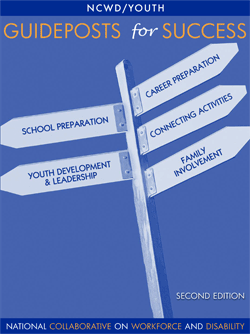 The U.S. Government Accountability Office recently released a report entitled "Students with Disabilities: Better Federal Coordination Could Lessen Challenges in the Transition from High School." The report highlights the challenges youth with disabilities face in transitioning from high school to postsecondary education and the workforce. The report identifies a variety of ways in which federal agencies can better coordinate to serve youth with disabilities, including implementing the IEL-led National Collaborative on Workforce and Disability for Youth's Guideposts for Success across multiple youth-serving federal agencies as a framework to support transition to adulthood for all youth, including youth with disabilities and other disconnected youth. According to the report, "Such a framework could also be used at the local level to identify gaps in communities and individual plans."
The U.S. Government Accountability Office recently released a report entitled "Students with Disabilities: Better Federal Coordination Could Lessen Challenges in the Transition from High School." The report highlights the challenges youth with disabilities face in transitioning from high school to postsecondary education and the workforce. The report identifies a variety of ways in which federal agencies can better coordinate to serve youth with disabilities, including implementing the IEL-led National Collaborative on Workforce and Disability for Youth's Guideposts for Success across multiple youth-serving federal agencies as a framework to support transition to adulthood for all youth, including youth with disabilities and other disconnected youth. According to the report, "Such a framework could also be used at the local level to identify gaps in communities and individual plans."
DC EPFP Application Deadline Extended to 08/20/12
Don't miss your opportunity to participate in the 2012-2013 DC EPFP cohort.
 The Institute for Educational Leadership (IEL) is recruiting participants for the 2012-2013 class of the Education Policy Fellowship Program (EPFP) at its Washington, DC site. EPFP is a professional development program for individuals whose work record reflects strong leadership ability and a concern for issues important to children and education. Participants hold full-time positions in diverse organizations at the local, state, and national levels. EPFP combines regular meetings and activities specific to each State site program with events of national scope to provide an enriching experience for more than 200 Fellows each year. Applications are being accepted through August 20th. Apply online today!
The Institute for Educational Leadership (IEL) is recruiting participants for the 2012-2013 class of the Education Policy Fellowship Program (EPFP) at its Washington, DC site. EPFP is a professional development program for individuals whose work record reflects strong leadership ability and a concern for issues important to children and education. Participants hold full-time positions in diverse organizations at the local, state, and national levels. EPFP combines regular meetings and activities specific to each State site program with events of national scope to provide an enriching experience for more than 200 Fellows each year. Applications are being accepted through August 20th. Apply online today!
EPFP currently operates in twelve state sites (CO, CT, GA, MA, MI, MN, MS, NY, NC, OH, PA, and SC) and the District of Columbia. For more information on each state site program, visit: http://epfp.iel.org/?page=Apply.
Please contact epfp@iel.org if you have any questions.
Campaign Pushes for Creation of Presidential Youth Council
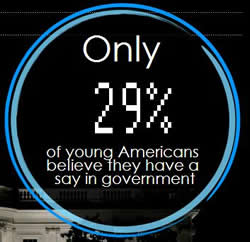 More than a year ago a group of remarkable young people came together to advocate for a new addition to government: youth leadership. Their proposal was to create a Presidential Youth Council that would advise the President and every federal department in the Cabinet. Now, the Campaign for the Presidential Youth Council has officially launched and is gaining traction with the support of more than 100 leading youth-focused organizations. Read on to learn more about this exciting initiative and the latest developments in the Campaign. The Presidential Youth Council, comprised of young Americans ages 16-24, will advise the President on the perspectives of youth, offer suggestions on how to make federally funded youth programs more efficient and effective, and will create shared recommendations on issues that will affect the long-term future of our country.
More than a year ago a group of remarkable young people came together to advocate for a new addition to government: youth leadership. Their proposal was to create a Presidential Youth Council that would advise the President and every federal department in the Cabinet. Now, the Campaign for the Presidential Youth Council has officially launched and is gaining traction with the support of more than 100 leading youth-focused organizations. Read on to learn more about this exciting initiative and the latest developments in the Campaign. The Presidential Youth Council, comprised of young Americans ages 16-24, will advise the President on the perspectives of youth, offer suggestions on how to make federally funded youth programs more efficient and effective, and will create shared recommendations on issues that will affect the long-term future of our country.
IEL Submits Recommendations to Administration on Proposed Performance Partnership Pilots for Disconnected Youth
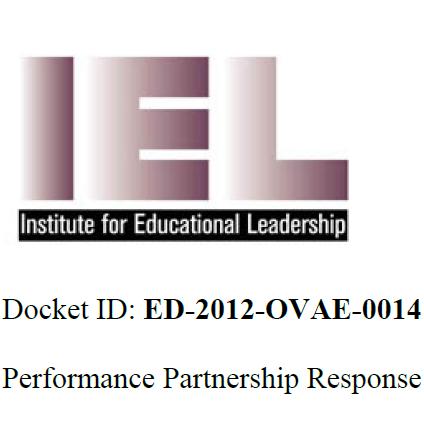 On July 31, IEL's Center for Workforce Development (IWL/CWD) submited comments to the U.S. Department of Education's Office of Vocational and Adult Education regarding proposed Performance Partnership Pilots designed to improve outcomes for disconnected youth. IEL/CWD encouraged officials to broaden their definition of "disconnected youth" to include youth with disabilities. IEL/CWD also encouraged the implementation of a national youth transition framework, such as the Guideposts for Success by the IEL-led National Collaborative on Workforce and Disbility for Youth. IEL CWD encouraged adoption of principles of Universal Design for Learning, including career exploration in youth programming, encouraging broad, cross-system, public and private partnerships, and rethinking outcomes to include a wide array of youth assessments, interim youth outcome measures, and performance expectations negotiated based on populations served. IEL/CWD also identified a number of barriers to working with disconnected youth, along with strategies to overcome these barriers, including eligibility alignment across systems, creating common definitions, and implementing common performance measures. Read the full recommendations here.
On July 31, IEL's Center for Workforce Development (IWL/CWD) submited comments to the U.S. Department of Education's Office of Vocational and Adult Education regarding proposed Performance Partnership Pilots designed to improve outcomes for disconnected youth. IEL/CWD encouraged officials to broaden their definition of "disconnected youth" to include youth with disabilities. IEL/CWD also encouraged the implementation of a national youth transition framework, such as the Guideposts for Success by the IEL-led National Collaborative on Workforce and Disbility for Youth. IEL CWD encouraged adoption of principles of Universal Design for Learning, including career exploration in youth programming, encouraging broad, cross-system, public and private partnerships, and rethinking outcomes to include a wide array of youth assessments, interim youth outcome measures, and performance expectations negotiated based on populations served. IEL/CWD also identified a number of barriers to working with disconnected youth, along with strategies to overcome these barriers, including eligibility alignment across systems, creating common definitions, and implementing common performance measures. Read the full recommendations here.
NGA and Senate HELP Committee Focus on Employment Among Individuals with Disabilities
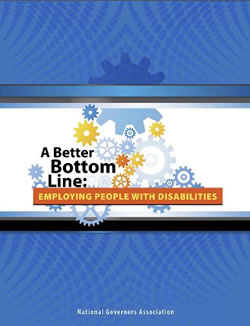 On July 15, Delaware Gov. Jack Markell officially became chair of the National Governors Association (NGA), and he announced his chair's initiative, A Better Bottom Line: Employing People with Disabilities, which aims to increase employment among individuals with disabilities. Specifically, the initiative will focus on the employment challenges that affect individuals with intellectual and other significant disabilities and the role that both state government and business can play in facilitating and advancing opportunities for these individuals to be gainfully employed in the competitive labor market.
On July 15, Delaware Gov. Jack Markell officially became chair of the National Governors Association (NGA), and he announced his chair's initiative, A Better Bottom Line: Employing People with Disabilities, which aims to increase employment among individuals with disabilities. Specifically, the initiative will focus on the employment challenges that affect individuals with intellectual and other significant disabilities and the role that both state government and business can play in facilitating and advancing opportunities for these individuals to be gainfully employed in the competitive labor market.
"The bottom line is that there are so many people with disabilities who have the time, talent and desire to make meaningful contributions to interested employers," Gov. Markell said. "More companies are recognizing that creating greater economic opportunity for these workers improves their own bottom line as well. It doesn't matter whether you were born with additional challenges to face or – in the case of our wounded veterans for example – acquired them later in life. What matters is what you have to offer."
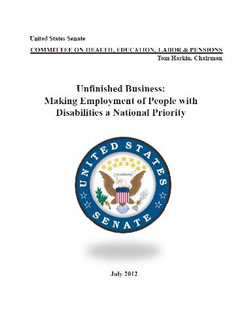 On July 16, the U.S. Senate Committee on Health, Education, Labor & Pensions released a report entitled "Unfinished Business: Making Employment of People with Disabilities a National Priority." The report details the current state of employment for adults with disabilities and describes policy recommendations that could help to increase labor force participation. Following a series of bipartisan HELP Committee hearings to explore the persistently low employment rate of people with disabilities, this report outlines the next steps to achieve Chairman Tom Harkin's goal of raising the number of Americans with disabilities in the labor force to six million by 2015.
On July 16, the U.S. Senate Committee on Health, Education, Labor & Pensions released a report entitled "Unfinished Business: Making Employment of People with Disabilities a National Priority." The report details the current state of employment for adults with disabilities and describes policy recommendations that could help to increase labor force participation. Following a series of bipartisan HELP Committee hearings to explore the persistently low employment rate of people with disabilities, this report outlines the next steps to achieve Chairman Tom Harkin's goal of raising the number of Americans with disabilities in the labor force to six million by 2015.
"As someone who has sought to expand rights and opportunities for children and adults with disabilities for almost four decades, I am convinced America is ready to address this next great barrier of disability employment," Harkin wrote in the report. "At this time we are seeing a convergence of strong bipartisan leadership from the public and private sectors with the coming of age of a new generation of young adults with disabilities who have high expectations for themselves and have the education and skills to succeed in the modern workplace. If we make this issue the priority that it deserves to be, in the next few years we will see a real change in employment outcomes for Americans with disabilities."
IEL to Help Bring Career-Focused Mentoring for Youth with Disabilities to D.C. Public Schools
 In November, District of Columbia Public Schools (DCPS) will launch the Competitive Employment Opportunities (CEO) Program, which will connect high school juniors with disabilities to professionals who work in a range of competitive occupations, in order to provide them with career exploration, soft skill training, and internship opportunities. As DCPS Transition Coordinator Raymond Hutchison explains, "Unfortunately, youth with disabilities are traditionally not seen as ideal candidates for employment in some of the District's fastest growing industries, therefore they are discouraged, either implicitly or explicitly, from pursuing certain careers. The CEO Program aims to erase this type of flawed thinking."
In November, District of Columbia Public Schools (DCPS) will launch the Competitive Employment Opportunities (CEO) Program, which will connect high school juniors with disabilities to professionals who work in a range of competitive occupations, in order to provide them with career exploration, soft skill training, and internship opportunities. As DCPS Transition Coordinator Raymond Hutchison explains, "Unfortunately, youth with disabilities are traditionally not seen as ideal candidates for employment in some of the District's fastest growing industries, therefore they are discouraged, either implicitly or explicitly, from pursuing certain careers. The CEO Program aims to erase this type of flawed thinking."
IEL's Center for Workforce Development (CWD) is aiding DCPS in the program's design by identifying and providing resources regarding best practices in the field of career-focused mentoring. IEL/CWD has developed several research- and practice-based mentoring resources, including Paving the Way to Work: A Guide to Career-Focused Mentoring for Youth with Disabilities, produced by the IEL/CWD-led National Collaborative on Workforce and Disability for Youth and "Plotting the Course for Success: An Individualized Mentoring Plan for Youth with Disabilities," produced by the IEL/CWD-led National Consortium on Workforce and Disability for Youth. DCPS approached IEL after learning about the Ready to Achieve Mentoring Program (RAMP), IEL's career-focused mentoring program for at-risk and court-involved youth with disabilities and youth involved in the juvenile justice system. RAMP has served over 1100 youth since 2010.
EPFP Alumna Zabrina Epps Reveals How EPFP Impacted Decision to Run for Prince George's County (MD) Board of Education
 Zabrina Epps, 2010-11 alumna of the Education Policy Fellowship Program (EPFP) of the Institute for Educational Leadership (IEL), has decided to enter the race for the District 1 seat on the Prince George's County Board of Education.
Zabrina Epps, 2010-11 alumna of the Education Policy Fellowship Program (EPFP) of the Institute for Educational Leadership (IEL), has decided to enter the race for the District 1 seat on the Prince George's County Board of Education.
Epps is currently employed as an academic advisor at the Community College of Baltimore County. Her experience with students that are unprepared to enter college was instrumental in pushing her to run for school board.
"I'm running on behalf of the students who I meet as a community college Academic Advisor who, after 12 years of education, do not meet college standards," Epps said. "My goal is to engage parents, students, teachers, school workers, politicians and the community in solution-oriented discussions so we can raise the profile of Prince George's County Public Schools to one of Maryland's top school systems."
Epps said that her participation in EPFP "had a profound effect" on how she views her own role in the educational system.
"The most important takeaway [from EPFP] was all that we learned about leadership and how we can lead from a myriad of positions," Epps said.
A complete article from the Baltimore Sun covering an interview with Epps can be found here. To find more information about the campaign, visit Epps's official campaign site.
GEPFP Application Deadline to Extended to July 16, 2012
 Don't miss your opportunity to study global education policy and travel to China as a Fellow in the 2012-2013 Global Education Policy Fellowship Program (GEPFP).
Don't miss your opportunity to study global education policy and travel to China as a Fellow in the 2012-2013 Global Education Policy Fellowship Program (GEPFP).
The Institute for Educational Leadership, in partnership with Michigan State University (MSU), is accepting applications through July 16th for a professional development program focused on education policy in the Age of Globalization called the GEPFP.
GEPFP is a unique experience open to senior level leaders with an interest in global education policy, combining online learning with international travel to China. View the program description and tentative schedule of GEPFP meetings for 2012-2013.
To apply; please complete the GEPFP online application. The application—along with an $950 deposit—is due by July 16, 2012. For more information about Global EPFP, please email epfp@iel.org.
NCWD/Youth, ODEP Host Webinar on New Soft Skills Curriculum
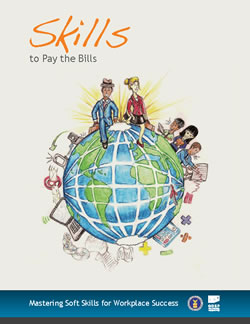 NCWD/Youth and the U.S. Department of Labor's Office of Disability Employment Policy (ODEP) hosted a webinar on ODEP's new curriculum entitled "Skills to Pay the Bills: Mastering Soft Skills for Workplace Success." The curriculum focuses on teaching "soft" or workforce readiness skills to youth, including youth with disabilities. Created for youth development professionals as an introduction to workplace interpersonal and professional skills, the curriculum is targeted for youth ages 14 to 21 in both in-school and out-of-school environments. The basic structure of the program is comprised of modular, hands-on, engaging activities that focus on six key skill areas: communication, enthusiasm and attitude, teamwork, networking, problem solving and critical thinking, and professionalism. Access the webinar recording, PowerPoint presentation, and learn more about the curriculum.
NCWD/Youth and the U.S. Department of Labor's Office of Disability Employment Policy (ODEP) hosted a webinar on ODEP's new curriculum entitled "Skills to Pay the Bills: Mastering Soft Skills for Workplace Success." The curriculum focuses on teaching "soft" or workforce readiness skills to youth, including youth with disabilities. Created for youth development professionals as an introduction to workplace interpersonal and professional skills, the curriculum is targeted for youth ages 14 to 21 in both in-school and out-of-school environments. The basic structure of the program is comprised of modular, hands-on, engaging activities that focus on six key skill areas: communication, enthusiasm and attitude, teamwork, networking, problem solving and critical thinking, and professionalism. Access the webinar recording, PowerPoint presentation, and learn more about the curriculum.
IEL Announces New Mind in the Making/Community School Sites
 IEL is excited to announce it has selected 3 new sites for its Mind in the Making Project/Community Schools Project (MITM-CS) - Providence, RI; Hartford, CT; and, Evansville, IN. A relatively new project (launched June 2011), MITM-CS is designed to use Ellen Galinsky's Mind in the Making and the Seven Essential Skills as a focal point for building bridges between early childhood systems and community schools. It also is intended to promote educational innovation in community schools, and serve as a model for all educators and families throughout the country. The Family and Works Institute is the primary Kellogg grantee, working in partnership with IEL and the Coalition for Community Schools.
IEL is excited to announce it has selected 3 new sites for its Mind in the Making Project/Community Schools Project (MITM-CS) - Providence, RI; Hartford, CT; and, Evansville, IN. A relatively new project (launched June 2011), MITM-CS is designed to use Ellen Galinsky's Mind in the Making and the Seven Essential Skills as a focal point for building bridges between early childhood systems and community schools. It also is intended to promote educational innovation in community schools, and serve as a model for all educators and families throughout the country. The Family and Works Institute is the primary Kellogg grantee, working in partnership with IEL and the Coalition for Community Schools.
The MITM approach and resources will be key to cultivating communities of engaged, lifelong learners across the 0-8 continuum by providing deeper understanding of the science of children's learning and support for trying out how to apply this research to parenting and teaching practices. Using a training of trainers capacity-building model, each community will identify members of key constituencies to serve as Mind in the Making "Learning Facilitators". We will work with these Learning Facilitators to bring Mind in the Making to parents, teachers, principals and other school staff; we will also make these learning communities and resources available to programs that might not otherwise have access to these kinds of professional development opportunities (e.g. home-based child care, home visiting programs and other parent support programs).
The three new sites will join Tulsa, OK; Multnomah County - Portland, OR; and, New York City, who are already participating in the project, in Albuquerque July 23-24 for an orientation meeting.
The Education Policy Fellowship Program (EPFP™) Seeks Applicants: Deadline September 2012
 The Institute for Educational Leadership (IEL) is now recruiting participants for the 2012-2013 class of the Education Policy Fellowship Program (EPFP™). EPFP is a professional development program for individuals whose work record reflects strong leadership ability and a concern for issues important to children and education. Participants hold full-time positions in diverse organizations at the local, state, and national levels. EPFP™ combines regular meetings and activities specific to each State site program with national events to provide an enriching experience for more than 200 Fellows each year. Applications are being accepted through September 2012.
The Institute for Educational Leadership (IEL) is now recruiting participants for the 2012-2013 class of the Education Policy Fellowship Program (EPFP™). EPFP is a professional development program for individuals whose work record reflects strong leadership ability and a concern for issues important to children and education. Participants hold full-time positions in diverse organizations at the local, state, and national levels. EPFP™ combines regular meetings and activities specific to each State site program with national events to provide an enriching experience for more than 200 Fellows each year. Applications are being accepted through September 2012.
EPFP currently operates in twelve state sites (CO, CT, GA, MA, MI, MN, MS, NY, NC, OH, PA, and SC) and the District of Columbia. For more information on each state site program, visit: http://epfp.iel.org/?page=Apply.
Please contact epfp@iel.org if you have any questions.
Support Community Schools Language in New Race to the Top Grant Guidelines
 IEL and the Coalition for Community Schools are very excited about the Department of Education's new Race to the Top – District competition. We are pleased that the draft guidelines reflect many of the principles found in community schools. Federal officials are accepting feedback on the grant guidelines until Friday June 8. We are calling on all community school advocates to voice their support for school-community partnerships in the guidelines.
IEL and the Coalition for Community Schools are very excited about the Department of Education's new Race to the Top – District competition. We are pleased that the draft guidelines reflect many of the principles found in community schools. Federal officials are accepting feedback on the grant guidelines until Friday June 8. We are calling on all community school advocates to voice their support for school-community partnerships in the guidelines.
ACT NOW! Support the Coalition's comments by going to the Education Department's website and voting "up" on the Coalition's recommendations. Search for "Coalition for Community Schools" to find our comment and vote. Feel free to post your own comments supporting community schools. Read the Coalition's comments.
In Memoriam: Van Mueller, Minnesota EPFP Coordinator Emeritus
 Van D. Mueller, long time (1977-Present) Coordinator of the Institute for Educational Leadership's (IEL) Education Policy Fellowship Program (EPFP) in Minnesota passed away on March 8, 2012. His many contributions to the field of education and to IEL personified the advice often attributed to another Minnesota-based leader of note, Harlan Cleveland: think globally; act locally.
Van D. Mueller, long time (1977-Present) Coordinator of the Institute for Educational Leadership's (IEL) Education Policy Fellowship Program (EPFP) in Minnesota passed away on March 8, 2012. His many contributions to the field of education and to IEL personified the advice often attributed to another Minnesota-based leader of note, Harlan Cleveland: think globally; act locally.
Van, a "Yooper" (a native of Manistique in Michigan's Upper Peninsula), earned degrees from Central Michigan University and the University of Michigan; he earned his Ed.D. from Michigan State University. He spent 10 years as a teacher and administrator in Michigan public schools and in the Michigan Department of Education.
For thirty-three years, Van taught in the University of Minnesota's Educational Administration Department (now Health and Human Development). In addition to his teaching duties at the 'U', he advised over 150 graduate students, completed school finance studies in ten states and testified in equity law suits in state courts in seven states. Van was passionate about education and equity.
In his "spare time," Van coordinated the Minnesota EPFP (most recently with Dan Loritz, Randy Johnson, Tim McDonald, and Mary Donaldson), helping to prepare over 300 leaders for education – individuals who had a deeper understanding of national education policy and its implications for state and local education systems. In addition, these leaders had access to a broader national network of professional colleagues on whom to call for assistance. In 2007, IEL awarded Van its Distinguished Service Award.
For two years, Van served as president of the Minnesota PTA, and as vice-president and treasurer of the National PTA. He co-founded the American Education Finance Association where he served as a board member, vice-president, president, and co-edited two AEFA yearbooks; one of his specialty areas was a focus on rural school finance. Van also held several offices with the local, state and national Phi Delta Kappa, an honorary professional education association.
Van is survived by his wife of sixty years, Mildred (Mike), EPFP 1984-1985; two daughters, Vanessa Mueller, Kerry Fritze; and four grandchildren. He was preceded in death by his daughter, Edith Irene in 1982. In lieu of flowers, the family requests that contributions be made to the Edith I. Mueller scholarship fund at the Department of Kinesiology, University of Minnesota or the Eva Burrell Animal Shelter in Manistique, Michigan.
Join us for the Danzberger Memorial Lecture - "Surpassing Shanghai" – Reception & Book Signing Monday April, 23
 Join IEL for the 12th Annual Danzberger Memorial Lecture presented by Marc Tucker on Monday, April 23rd from 4:15 PM until 5:15 PM at the Renaissance Washington, DC Downtown Hotel (999 Ninth St, NW; Washington, DC 20001).
Join IEL for the 12th Annual Danzberger Memorial Lecture presented by Marc Tucker on Monday, April 23rd from 4:15 PM until 5:15 PM at the Renaissance Washington, DC Downtown Hotel (999 Ninth St, NW; Washington, DC 20001).
Internationally recognized education reform expert and leader in benchmarking the policies and practices of the countries with the best education systems in the world, Marc Tucker, will try to answer a simple question: "How would one redesign the American education system if the aim was to take advantage of everything that has been learned by countries with the world's best education systems?" He will lay out his proposed "Agenda for American Education" and talk about why our nation needs such a bold agenda; he also will talk about the likelihood that the agenda will ever be implemented. Immediately following the Lecture, join IEL for an informal reception and book signing. Copies of Marc's new book "Surpassing Shanghai" will be available for purchase.
Senate Confirms RAMP Team Member to Join National Council of Disability
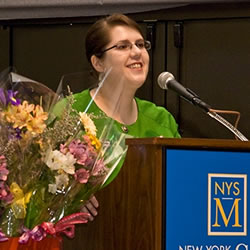 The National Council on Disability (NCD) -- an independent federal agency that advises the president, Congress, and other federal agencies on the policies and programs that affect the lives of people with disabilities -- welcomed Stephanie Orlando to the agency. Orlando works for YOUTH POWER!, a program of Families Together in New York State. YOUTH POWER! is the state coordinating entity for IEL's Ready to Achieve Mentoring Program (RAMP) in New York State, and Families Together in Albany Countyis one of the three New York RAMP sites.
The National Council on Disability (NCD) -- an independent federal agency that advises the president, Congress, and other federal agencies on the policies and programs that affect the lives of people with disabilities -- welcomed Stephanie Orlando to the agency. Orlando works for YOUTH POWER!, a program of Families Together in New York State. YOUTH POWER! is the state coordinating entity for IEL's Ready to Achieve Mentoring Program (RAMP) in New York State, and Families Together in Albany Countyis one of the three New York RAMP sites.
NCWD/Youth Releases How-to Guide for Implementing Individualized Learning Plans
 The National Collaborative on Workforce and Disability for Youth (NCWD/Youth), housed at IEL's Center for Workforce Development, has released "Promoting Quality Individualized Learning Plans: A 'How to Guide' Focused on the High School Years", a new online guide for schools, educators, and other professionals who assist youth with college and career readiness and transition planning. This guide was developed in response to feedback from schools indicating a need for curriculum and implementation guidelines to support whole-school buy-in for implementing individualized learning plans (ILPs). A key goal of the Guide is to help schools develop a bridge between college and career readiness efforts through the use of ILPs and help youth achieve prosperous and productive lives. The career development activities and resources in this guide are also useful for youth service professionals in the workforce development system. The Guide contents include: 1) Section I – a range of curriculum resources organized according to three career development phases that are necessary in order to support students' development of high quality ILPs: self-exploration, career exploration, and career planning and management; 2) Section II – an overview of several strategies that can facilitate school-wide ILP implementation and addresses how to connect it to broader institutional goals; 3) Section III – how to develop, implement, and monitor the ILP process; 4) Section IV – links to a number of additional resources, including those commercially available that schools can consider in support of implementing ILPs. The Guide is available online and also in PDF version.
The National Collaborative on Workforce and Disability for Youth (NCWD/Youth), housed at IEL's Center for Workforce Development, has released "Promoting Quality Individualized Learning Plans: A 'How to Guide' Focused on the High School Years", a new online guide for schools, educators, and other professionals who assist youth with college and career readiness and transition planning. This guide was developed in response to feedback from schools indicating a need for curriculum and implementation guidelines to support whole-school buy-in for implementing individualized learning plans (ILPs). A key goal of the Guide is to help schools develop a bridge between college and career readiness efforts through the use of ILPs and help youth achieve prosperous and productive lives. The career development activities and resources in this guide are also useful for youth service professionals in the workforce development system. The Guide contents include: 1) Section I – a range of curriculum resources organized according to three career development phases that are necessary in order to support students' development of high quality ILPs: self-exploration, career exploration, and career planning and management; 2) Section II – an overview of several strategies that can facilitate school-wide ILP implementation and addresses how to connect it to broader institutional goals; 3) Section III – how to develop, implement, and monitor the ILP process; 4) Section IV – links to a number of additional resources, including those commercially available that schools can consider in support of implementing ILPs. The Guide is available online and also in PDF version.
Join IEL & AERA for the ED Policy Forum: "Reinventing the GED" 04/04
 The next AERA/IEL Education Policy Forum Luncheon on the topic of"Reinventing the GED" will be held on Wednesday, April 4, 2012 from noon until2:00 pm at the American Association of State Colleges and Universities (1307 NewYork Ave, NW). Thirteen dollars for the subsidized lunch will be collected atthe door. Required reservations may be sent by email (ctalbot@aera.net) toChristy Talbot at AERA. Limited available seating is assigned according to theorder in which reservations are received.
The next AERA/IEL Education Policy Forum Luncheon on the topic of"Reinventing the GED" will be held on Wednesday, April 4, 2012 from noon until2:00 pm at the American Association of State Colleges and Universities (1307 NewYork Ave, NW). Thirteen dollars for the subsidized lunch will be collected atthe door. Required reservations may be sent by email (ctalbot@aera.net) toChristy Talbot at AERA. Limited available seating is assigned according to theorder in which reservations are received.
Note: At last month's EPF on the Common Core Standards there was a gooddeal of interest expressed in the changes planned for the GED. This forum willbe an opportunity to fully explore the role and potential of theGED.
College and career readiness typically implies a track wherestudents progress from the K-12 system to postsecondary education. Indeed,reports indicate that those who do not graduate from high school are not aslikely to be employed, and if they are, they will likely earn much less thantheir counterparts who have graduated from high school.
In light of these trends, a new version of the GED, GED 20/20, is set to bereleased. The assessment itself will be aligned with the Common Core StateStandards, but there are many questions to be answered: What are the componentsof this new GED? How will these changes impact test-takers, high schooldropouts, and employers who will hire adult learners who take this assessment?
Resource: Martin Kehe, vice president of products atthe GED Testing Service, has been involved in the development of the new GED20/20 assessment, and will describe the proposed updates to the GED. Kehe hasbeen with the GED Testing Service since 2008. Prior to this, he served as theBranch Chief for Assessment at the Maryland State Department of Education.
Photo taken from this photostream and used with permission of a Creative Commons license.
Join us for the "The Influence of Teachers: A Conversationwith John Merrow" 04/05
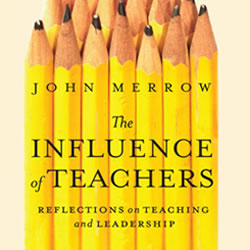 Register now toparticipate in a conversation with John Merrow about his book "The Influence ofTeachers" on Thursday,April 5 at 2:00 PM ET. During this webinar, Merrow willdiscuss his book and the possibilities and solutions for a new education system.IEL President Martin J. Blank will start the conversation by asking Merrowquestions submitted by participants. Submit your pressing question(s) by fillingout the registration form.
Register now toparticipate in a conversation with John Merrow about his book "The Influence ofTeachers" on Thursday,April 5 at 2:00 PM ET. During this webinar, Merrow willdiscuss his book and the possibilities and solutions for a new education system.IEL President Martin J. Blank will start the conversation by asking Merrowquestions submitted by participants. Submit your pressing question(s) by fillingout the registration form.
Members of the IEL and EPFP network can purchase "The Influence ofTeachers" for a special discounted price of $10 (includes shipping). Click here to learn how to place your order.
Education Week Runs Front Page Feature on CommunitySchools
 The community schools movement is growing – and it continues to capture national attention. This time it's thefront page of Education Week. Reporter Christina Samuels takes an in-depth lookat community schools in Multnomah County, Oregon and its nearly two decades ofsuccess.
The community schools movement is growing – and it continues to capture national attention. This time it's thefront page of Education Week. Reporter Christina Samuels takes an in-depth lookat community schools in Multnomah County, Oregon and its nearly two decades ofsuccess.
SUN(Schools Uniting Neighborhoods) Community Schools in and around Portland hasbeen lauded by national education leaders and media as a shining example of howschools and communities working together can achieve sustaining positiveoutcomes for students even in the economic downturn. While it features SUN, thisin-depth, three-page story also covers the growth of community schools in recentyears in cities like New York and Chicago and its growing favor with federaleducation leaders, including Secretary Duncan and President Obama.
Read the Education Week story here (Registrationrequired).
Community Schools Making News in the Bay Area
 Communityschools are becoming a hot subject of interest in the Bay Area. Oakland is inthis midst of transforming its entire school district into full-servicecommunity schools. Across the bay, San Francisco is looking to scale up itscommunity schools initiative. Two major newspapers in San Francisco, The Chronicle and The Examiner,decided wrote about community schools in the Bay in February.
Communityschools are becoming a hot subject of interest in the Bay Area. Oakland is inthis midst of transforming its entire school district into full-servicecommunity schools. Across the bay, San Francisco is looking to scale up itscommunity schools initiative. Two major newspapers in San Francisco, The Chronicle and The Examiner,decided wrote about community schools in the Bay in February.
Justin time for the Coalition for Community Schools 2012 National Forum May 9-12 atthe Marriott Marquis in downtown San Francisco. Register now!
SecretaryDuncan Affirms Support for Community Schools Strategy
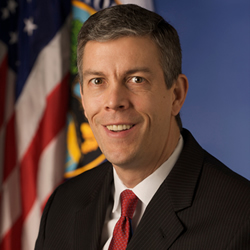 Speakingat the February 6th Askwith Forum, Harvard University's Graduate School ofEducation's lecture series, U.S. Secretary of Education Arne Duncan reaffirmedhis support for full-service community schools as one of the most effectiveeducation reforms, especially in impoverished communities.
Speakingat the February 6th Askwith Forum, Harvard University's Graduate School ofEducation's lecture series, U.S. Secretary of Education Arne Duncan reaffirmedhis support for full-service community schools as one of the most effectiveeducation reforms, especially in impoverished communities.
Thisis not the first time Secretary Duncan has publically support community schoolssince his appointment to the Obama Administration. Duncan also appeared in aninterview with Charlie Rose on PBS and talked about his for support of communityschools.
Read an excerpt of Secretary Duncan's remarks.
National Education Startup Challenge Invites Youth to Propose EducationSolutions
 The U. S. Department of Education has launched the National Education Startup Challenge, which invites studentsin middle school, high school, and college students and out-of-school youth todevelop innovative, real world solutions to improve education. Youth from acrossthe country are encouraged to submit a business plan and a video pitch for afor-profit or non-profit startup that includes an innovative strategy, productor service designed to address one of these four topics:
The U. S. Department of Education has launched the National Education Startup Challenge, which invites studentsin middle school, high school, and college students and out-of-school youth todevelop innovative, real world solutions to improve education. Youth from acrossthe country are encouraged to submit a business plan and a video pitch for afor-profit or non-profit startup that includes an innovative strategy, productor service designed to address one of these four topics:
- Middle GradesMatter: Helping middleschool students transition to high school and stay on track to graduate.
- Skills, Skills,Skills: Providingstudents in rural, urban, and/or high-poverty communities with opportunities forinternships or other work- and community-based learning experiences that helpthem develop skills for success in postsecondary education, 21st centurycareers, and civic life.
- Education Pays: Making it easierfor students and families to find and select high-quality, affordablepostsecondary programs – whether colleges, universities, or career trainingprograms – that provide good value.
- Finishing Faster: Increasing thelikelihood that postsecondary students complete their degrees and decreasing thetime it takes them to finish, such as by improving and speeding up remedialeducation.
All submissions are due by 5:00 p.m. EST on May 1, 2012.Submissions will be judged by a panel of prominent educators and entrepreneursand awards will be made in four categories: 6th – 8th grade students; 9th –12th grade students; Undergraduate students; and Out-of-school youth. Youthwho win the challenge will be celebrated by senior White House and Department ofEducation officials, and may qualify for additional recognition opportunities. To learn more, visit the website at http://nesc.challenge.gov.
Webpage onIndividualized Learning Plans Launched by NCWD/Youth
 The NationalCollaborative on Workforce and Disability for Youth (NCWD/Youth), housed atIEL's Center for Workforce Development, has a new webpage on Individualized Learning Plans (ILPs) featuringvarious publications and resources for understanding and using ILPs. An ILP is atool that students in secondary school use – with support from school counselorsand parents – to define their personal interests and goals related to theircareer and postsecondary education and to plan what courses to take and whatactivities to participate in during high school to further their interests andachieve their goals. The webpage contains information about the latest ILPresearch, policies, and practices including findings and resources developedthrough NCWD/Youth's ILP Research and Demonstration Project in four states and14 schools that use Individualized Learning Plans to guide high school studentstoward college and careers. For more information and resources, visit the ILP webpage.
The NationalCollaborative on Workforce and Disability for Youth (NCWD/Youth), housed atIEL's Center for Workforce Development, has a new webpage on Individualized Learning Plans (ILPs) featuringvarious publications and resources for understanding and using ILPs. An ILP is atool that students in secondary school use – with support from school counselorsand parents – to define their personal interests and goals related to theircareer and postsecondary education and to plan what courses to take and whatactivities to participate in during high school to further their interests andachieve their goals. The webpage contains information about the latest ILPresearch, policies, and practices including findings and resources developedthrough NCWD/Youth's ILP Research and Demonstration Project in four states and14 schools that use Individualized Learning Plans to guide high school studentstoward college and careers. For more information and resources, visit the ILP webpage.
NCWD/YouthReleases Three New InfoBriefs on Learning Disabilities
 The NationalCollaborative on Workforce and Disability for Youth (NCWD/Youth), housed atIEL's Center for Workforce Development released threenew InfoBriefs on working with youth with learning disabilities. " Helping Youth with Learning Disabilities Chart the Course: AGuide for Youth Service Professionals" describes challenges faced by youthand young adults with learning disabilities as they reach adulthood, whilehighlighting strategies youth service professionals can implement to help youthto transition successfully into the workplace. " Learning How to Learn: Successful Transition Models forEducators Working with Youth with Learning Disabilities" identifies andexplains selected classroom-based strategies that incorporate strategiclearning. General and special educators can implement the strategies describedto engage students with disabilities (particularly those with learningdisabilities) in order to prepare students to transition from secondary topostsecondary and workplace settings. " Using Universal Design for Learning: Successful TransitionModels for Educators Working with Youth with Learning Disabilities" identifies and explains selected classroom-based strategies within the UniversalDesign for Learning (UDL) model. These InfoBriefs and more are available to read or download on NCWD/Youth's website.
The NationalCollaborative on Workforce and Disability for Youth (NCWD/Youth), housed atIEL's Center for Workforce Development released threenew InfoBriefs on working with youth with learning disabilities. " Helping Youth with Learning Disabilities Chart the Course: AGuide for Youth Service Professionals" describes challenges faced by youthand young adults with learning disabilities as they reach adulthood, whilehighlighting strategies youth service professionals can implement to help youthto transition successfully into the workplace. " Learning How to Learn: Successful Transition Models forEducators Working with Youth with Learning Disabilities" identifies andexplains selected classroom-based strategies that incorporate strategiclearning. General and special educators can implement the strategies describedto engage students with disabilities (particularly those with learningdisabilities) in order to prepare students to transition from secondary topostsecondary and workplace settings. " Using Universal Design for Learning: Successful TransitionModels for Educators Working with Youth with Learning Disabilities" identifies and explains selected classroom-based strategies within the UniversalDesign for Learning (UDL) model. These InfoBriefs and more are available to read or download on NCWD/Youth's website.
NewSoft Skills Curriculum in English & Spanish Available from USDOLODEP
 "Skills to Pay the Bills: Mastering Soft Skills for WorkplaceSuccess," is a curriculum developed by the U.S. Department of Labor's Officeof Disability Employment Policy (ODEP) focused on teaching "soft" or workforcereadiness skills to youth, including youth with disabilities. The curriculum wascreated for youth development professionals to use with youth ages 14 to 21 inboth in‐school and out‐of‐school environments as an introductionto workplace interpersonal and professional skills. It consists of modular,hands‐on, engaging activities that focus onsix key skill areas: communication, enthusiasm and attitude, teamwork,networking, problem solving and critical thinking, and professionalism. Thecurriculum is available in both English and Spanish on the ODEP website.
"Skills to Pay the Bills: Mastering Soft Skills for WorkplaceSuccess," is a curriculum developed by the U.S. Department of Labor's Officeof Disability Employment Policy (ODEP) focused on teaching "soft" or workforcereadiness skills to youth, including youth with disabilities. The curriculum wascreated for youth development professionals to use with youth ages 14 to 21 inboth in‐school and out‐of‐school environments as an introductionto workplace interpersonal and professional skills. It consists of modular,hands‐on, engaging activities that focus onsix key skill areas: communication, enthusiasm and attitude, teamwork,networking, problem solving and critical thinking, and professionalism. Thecurriculum is available in both English and Spanish on the ODEP website.
Letterfrom U. S. Department of Education Addresses DisabilityDiscrimination
 The U. S. Department ofEducation Office for Civil Rights (OCR) has released a Dear Colleague letter and FAQ concerning the Americans with Disabilities Act AmendmentsAct (Amendments Act). The letter guidance reiterates the Department's commitmentto ensure that educational opportunity is provided free from disabilitydiscrimination. The documents discuss the various obligations of schooldistricts, such as the requirement to evaluate students for disability, andprovide a free appropriate public education to students with disabilities, aswell as the changes made by the Amendments Act. Read or download the Dear Colleague letter and FAQ online.
The U. S. Department ofEducation Office for Civil Rights (OCR) has released a Dear Colleague letter and FAQ concerning the Americans with Disabilities Act AmendmentsAct (Amendments Act). The letter guidance reiterates the Department's commitmentto ensure that educational opportunity is provided free from disabilitydiscrimination. The documents discuss the various obligations of schooldistricts, such as the requirement to evaluate students for disability, andprovide a free appropriate public education to students with disabilities, aswell as the changes made by the Amendments Act. Read or download the Dear Colleague letter and FAQ online.
Community Learning Exchange Attendees Bring the WorkHome
 In this blog post from the Mi Casa Resource Center, Katherine Brenton highlightsThe Community Learning Exchange's (CLE) four importantprinciples to cultivate social change: collective leadership, gracious space,racial equity, and youth engagement. Mi Casa Resource Center is an originalmember of the Community Learning Exchange – a Kellogg Leadership for CommunityChange (KLCC) project. KLCC offers grassroots community leaders the opportunityto share challenges and solutions through local and regional Community LearningExchanges and to contribute to national policy conversations. Since 2002, IEL hasworked with communities in 11 states to develop community-based leadershipfocused on engaging communities, families, and children living on the margins.The CLE aims to use collective leadership to address community problemsof the 21st century. To learn more about the impact the CLE had ontheir work, read the full blog post from Mi Casa here.
In this blog post from the Mi Casa Resource Center, Katherine Brenton highlightsThe Community Learning Exchange's (CLE) four importantprinciples to cultivate social change: collective leadership, gracious space,racial equity, and youth engagement. Mi Casa Resource Center is an originalmember of the Community Learning Exchange – a Kellogg Leadership for CommunityChange (KLCC) project. KLCC offers grassroots community leaders the opportunityto share challenges and solutions through local and regional Community LearningExchanges and to contribute to national policy conversations. Since 2002, IEL hasworked with communities in 11 states to develop community-based leadershipfocused on engaging communities, families, and children living on the margins.The CLE aims to use collective leadership to address community problemsof the 21st century. To learn more about the impact the CLE had ontheir work, read the full blog post from Mi Casa here.
Register Now: Coalition for Community Schools 2012 National Forum
 This May 9-12, 2012, the Coalition for Community Schoolsjoins California community school leaders and advocates to convene a diversegroup of stakeholders committed to better results for young people across thenation. The 2012 NationalForum will engage a broad audience of policymakers,administrators and practitioners who want to learn how to put together schooland community assets to support student success.
This May 9-12, 2012, the Coalition for Community Schoolsjoins California community school leaders and advocates to convene a diversegroup of stakeholders committed to better results for young people across thenation. The 2012 NationalForum will engage a broad audience of policymakers,administrators and practitioners who want to learn how to put together schooland community assets to support student success.
This year's theme, Scaling up Schooland Community Partnerships: The Community Schools Strategy reflects the Coalition's new guide. We want participants to learn from schools andcommunities that are planning, or are in the midst of scale up, as well as thosewho are at scale and working to deepen their efforts and improve effectiveness.This conference will enable participants to gain the knowledge and skills tocreate, sustain, and scale up community schools through workshop sessions andnetworking with other professionals in similar fields of work. Join us atthis exciting event and register NOW: http://www.cvent.com/d/hdqyw1/4W.
Join IEL & AERA for the ED Policy Forum: "An Optimistic Critique of the Common Core Standards and Assessments" 02/15
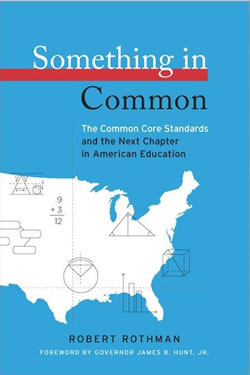 The next AERA/IEL Education Policy Forum Luncheon on the topic of "An Optimistic Critique of the Common Core Standards and Assessments" will be held on Wednesday, February 15, 2012 from noon until 2:00 pm at the American Federation of Teachers (555 New Jersey Ave., NW). Thirteen dollars for the subsidized lunch will be collected at the door. Required reservations may be sent by email (ctalbot@aera.net) to Christy Talbot at AERA. Limited available seating is assigned according to the order in which reservations are received.
The next AERA/IEL Education Policy Forum Luncheon on the topic of "An Optimistic Critique of the Common Core Standards and Assessments" will be held on Wednesday, February 15, 2012 from noon until 2:00 pm at the American Federation of Teachers (555 New Jersey Ave., NW). Thirteen dollars for the subsidized lunch will be collected at the door. Required reservations may be sent by email (ctalbot@aera.net) to Christy Talbot at AERA. Limited available seating is assigned according to the order in which reservations are received.
Something in Common: The Common Core Standards and the Next Chapter in American Education is a comprehensive review of the trials and tribulations of achieving common standards in the U.S. While this new book identifies four major challenges to the current movement, any one of which could catapult the CCS down the well worn path of previous efforts (remember Voluntary National Standards?), it offers reasons as to why things will be different this time. Our discussion will consider opportunities and challenges for the standards movement in the present political culture; it will also consider the first question: Is this a good thing?
Resource: Robert Rothman, author of Something In Common, will share his thinking about CCS. His expertise in standards and assessments has been derived from work as a reporter for Education Week, and a senior scholar with the National Center on Education and the Economy, Achieve, and the National Research Council. Rothman is currently a senior fellow at the Alliance for Excellent Education.
NCWD/Youth Seeks Feedback via Online Survey
 The National Collaborative on Workforce and Disability for Youth (NCWD/Youth) is conducting an online survey to learn whether and how individuals and organizations use the Guideposts for Success, a national framework that identifies what all youth need for successful transition to adulthood. NCWD/Youth is a national technical assistance center funded by the U. S. Department of Labor's Office of Disability Employment Policy and housed at the Institute for Educational Development's Center for Workforce Development. Please share your feedback by taking a few minutes to complete the survey online by December 22, 2011.
The National Collaborative on Workforce and Disability for Youth (NCWD/Youth) is conducting an online survey to learn whether and how individuals and organizations use the Guideposts for Success, a national framework that identifies what all youth need for successful transition to adulthood. NCWD/Youth is a national technical assistance center funded by the U. S. Department of Labor's Office of Disability Employment Policy and housed at the Institute for Educational Development's Center for Workforce Development. Please share your feedback by taking a few minutes to complete the survey online by December 22, 2011.
GWU Offers New Online Graduate Program Informed by NCWD/Youth's Guideposts for Success
 The George Washington University (GWU) now offers an online graduate program in Youth Transition, Career, and Vocational Services that includes course content informed by the Guideposts for Success, developed by the National Collaborative on Workforce and Disability for Youth (NCWD/Youth) housed at IEL's Center for Workforce Development. The graduate program is designed to prepare professionals as change agents in teaching, leadership, and support roles that assist youth with disabilities and youth at-risk to make successful transitions through high school to post-secondary education, employment and independent adulthood. Tuition stipends are available. Learn more about GWU's Youth Transition, Career, and Vocational Services Master's Degree Program online.
The George Washington University (GWU) now offers an online graduate program in Youth Transition, Career, and Vocational Services that includes course content informed by the Guideposts for Success, developed by the National Collaborative on Workforce and Disability for Youth (NCWD/Youth) housed at IEL's Center for Workforce Development. The graduate program is designed to prepare professionals as change agents in teaching, leadership, and support roles that assist youth with disabilities and youth at-risk to make successful transitions through high school to post-secondary education, employment and independent adulthood. Tuition stipends are available. Learn more about GWU's Youth Transition, Career, and Vocational Services Master's Degree Program online.
Inclusive Schools Week, December 5-9, Celebrates Schools' Progress & Promotes Dialogue
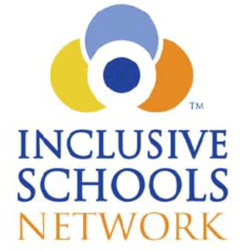 Inclusive Schools Week is December 5-9, 2011.This annual event sponsored by the Inclusive Schools Network celebrates the progress that schools have made in providing a supportive and quality education to an increasingly diverse student population, including students who are marginalized due to disability, gender, socio-economic status, cultural heritage, language preference and other factors. This year's celebration focuses on the theme, "Awareness to Action: Moving Forward." The event provides an opportunity for educators, students, and families to discuss what else needs to be done to ensure that schools continue to improve their ability to successfully educate all children. Learn more and download free celebration kits and promotional materials online at: http://inclusiveschools.org/inclusive-schools-week/.
Inclusive Schools Week is December 5-9, 2011.This annual event sponsored by the Inclusive Schools Network celebrates the progress that schools have made in providing a supportive and quality education to an increasingly diverse student population, including students who are marginalized due to disability, gender, socio-economic status, cultural heritage, language preference and other factors. This year's celebration focuses on the theme, "Awareness to Action: Moving Forward." The event provides an opportunity for educators, students, and families to discuss what else needs to be done to ensure that schools continue to improve their ability to successfully educate all children. Learn more and download free celebration kits and promotional materials online at: http://inclusiveschools.org/inclusive-schools-week/.
Submit By 12/16/11 to Present at the 2012 Community Schools National Forum
 This May, the Coalition for Community Schools joins California community school leaders to convene a diverse group of stakeholders committed to better results for young people across the nation.
This May, the Coalition for Community Schools joins California community school leaders to convene a diverse group of stakeholders committed to better results for young people across the nation.
The 2012 National Forum theme, Scaling up School and Community Partnerships: The Community Schools Strategy reflects the Coalition's new guide. We are consciously encouraging school and community leaders to develop long-term systemic approaches to community schools implementation – approaches that are consistent with our belief that community schools are fundamental to education reform. Scale up efforts are particularly important at a time when there is growing discussion about the influence non-school factors, particularly poverty, has on student achievement. The emphasis on scaling up also connects community schools to strategies such as Promise Neighborhoods, Choice Neighborhoods, P-20 initiatives, and Cradle-to-Career education.
WHAT'S DIFFERENT THIS YEAR? In addition to the emphasis on scale up, this year's Forum more than ever, seeks workshops that mirror the values of community schools – deep engagement and participation. We want people learning how to do the work…and not just listening to how it's been done. This means workshop designs should be engaging and interactive. Presenters should use methods that move beyond presentations and facilitated dialogue, such as: breaking participants into small groups for discussion around a set of relevant questions; creating an activity that participants can use to consider the relevance of your topic to their daily work; and putting together experiences that get participants up and moving.
Complete the workshop application online by clicking here.
Submission deadline is Friday, December 16, 2011
Join IEL & AERA for the 12/09/11 Education Policy Forum Luncheon: "Issues in Federal Research on Special Education"
 The next AERA/IEL Education Policy Forum Luncheon on the topic of "Issues in Federal Research on Special Education " will be held on Friday, December 9, 2011 from noon until 2:00 pm at the Charles Sumner School (17th and M Street NW). Thirteen dollars for the subsidized lunch will be collected at the door. Required reservations may be sent by email (ctalbot@aera.net) to Christy Talbot at AERA. Limited available seating is assigned according to the order in which reservations are received.
The next AERA/IEL Education Policy Forum Luncheon on the topic of "Issues in Federal Research on Special Education " will be held on Friday, December 9, 2011 from noon until 2:00 pm at the Charles Sumner School (17th and M Street NW). Thirteen dollars for the subsidized lunch will be collected at the door. Required reservations may be sent by email (ctalbot@aera.net) to Christy Talbot at AERA. Limited available seating is assigned according to the order in which reservations are received.
Resource: Deborah Speece is Commissioner of the National Center for Special Education Research (NCSER). Speece comes to her new position from the College of Education at the University of Maryland where she is a professor in the Department of Special Education. A former educator in the Toledo, Ohio public schools, Speece has also taught children with learning and behavioral disabilities. Speece is the co-editor of two books, Research on Classroom Ecologies: Implications for Inclusion of Children with Learning Disabilities and Developmental Perspectives on Children With High-Incidence Disabilities. Speece received her B.S. and M.Ed. in special education from Bowling Green State University and her Ph.D. in educational psychology from the University of North Carolina at Chapel Hill.
Speece provides leadership now to a research agency which sponsors a comprehensive program of special education research designed to expand the knowledge and understanding of infants, toddlers and children with disabilities. Topics to be discussed at the forum will include the federal organization of research in special education within the Institute of Education Sciences (IES), new research competitions, and specific topics such as working with children with reading disabilities.
IEL Awarded Two New Grants to Extend Its Work into DC
 IEL is pleased to announce that it has been awarded the following two grants to extend its work into the District of Columbia:
IEL is pleased to announce that it has been awarded the following two grants to extend its work into the District of Columbia:
The District of Columbia’s Ready to Achieve Mentoring Program TM, known as RAMP-DC, is a career-focused mentoring program for youth involved in the juvenile justice system. Through RAMP-DC, IEL will partner with the District’s Department of Youth Rehabilitation Services, Progressive Life Center, and East of the River Clergy-Police-Community Partnership to provide one-on-one, peer, and group mentoring for youth coming out of DC’s juvenile detention facilities to move toward employment. RAMP-DC is supported by the U.S. Department of Justice’s Office of Juvenile Justice & Delinquency Programs. To learn more, visit: www.ramp.iel.org.
The DC Advocacy Partners, known as Partners in Policymaking across the country, is a training opportunity designed to strengthen the knowledge and advocacy skills of participants to become policy influencers working to improve disability services in the District of Columbia. DC Advocacy Partners is a training program supported by the DC Developmental Disabilities Council. To learn more about DC Advocacy Partners, visit: www.dcpartners.iel.org.
NCWD/Youth Publishes Two Papers on Individualized Learning Plans
 IEL’s National Collaborative on Workforce & Disability for Youth (NCWD/Youth) is conducting a research and demonstration project in four states and 14 schools to learn how Individualized Learning Plans are guiding high school students toward college and careers. As a part of this work, two NCWD-Youth papers were recently published in scholarly journals. One, entitled “Education Alignment & Accountability in an Era of Convergence: Policy Insights from States with Individual Learning Plans & Policies,” appears in Education Policy Analysis Archives and can be found at http://epaa.asu.edu/ojs/article/view/921. The second manuscript, entitled “The Nature & Use of Individualized Learning Plans as a Career Intervention Strategy,” is available online and will appear in the Journal for Career Development due to be published early 2012.
IEL’s National Collaborative on Workforce & Disability for Youth (NCWD/Youth) is conducting a research and demonstration project in four states and 14 schools to learn how Individualized Learning Plans are guiding high school students toward college and careers. As a part of this work, two NCWD-Youth papers were recently published in scholarly journals. One, entitled “Education Alignment & Accountability in an Era of Convergence: Policy Insights from States with Individual Learning Plans & Policies,” appears in Education Policy Analysis Archives and can be found at http://epaa.asu.edu/ojs/article/view/921. The second manuscript, entitled “The Nature & Use of Individualized Learning Plans as a Career Intervention Strategy,” is available online and will appear in the Journal for Career Development due to be published early 2012.
Join IEL and AERA for the next Education Policy Forum Luncheon: "Achieving Education Success for All" on Nov. 18th
 The next AERA/IEL Education Policy Forum Luncheon on the topic of "Achieving Education Success for All" will be held on Friday, November 18, 2011 from noon until 2:00 pm at the Charles Sumner School (17th and M Street NW). Thirteen dollars for the subsidized lunch will be collected at the door. Required reservations may be sent by email (ctalbot@aera.net) to Christy Talbot at AERA. Limited available seating is assigned according to the order in which reservations are received
The next AERA/IEL Education Policy Forum Luncheon on the topic of "Achieving Education Success for All" will be held on Friday, November 18, 2011 from noon until 2:00 pm at the Charles Sumner School (17th and M Street NW). Thirteen dollars for the subsidized lunch will be collected at the door. Required reservations may be sent by email (ctalbot@aera.net) to Christy Talbot at AERA. Limited available seating is assigned according to the order in which reservations are received
Resource: Robert Slavin is Director of the Center for Research and Reform in Education at Johns Hopkins University, Director of the Institute for Effective Education at the University of York, and the co-founder and Chairman of the Success for All Foundation. Most recently his program received a $50 million Investing in Innovation (i3) award. His several books include Show Me the Evidence: Proven and Promising Programs for America's Schools, a title that typifies his approach to school reform. The titles of two other publications, written 7 years apart, indicate the dramatic growth and impact of the Success for All program even before the i3 grant: One Million Children: Success For All was written in 2001; Two Million Children: Success for All was written in 2008.
Join IEL President Martin Blank for a webinar on Expanded Learning Time and Opportunities
 IEL invites you to participate in the webinar, “Expanded Learning Time and Opportunities” on Wednesday, November 2 from 2:30 PM - 4:00 PM (Eastern Time). Martin Blank, President of IEL and Director of the Coalition for Community Schools, will discuss his chapter “Expanding the learning day: An essential component of the community schools strategy” featured in the new issue of New Directions for Youth Development. The chapter, co-authored with IEL’s Reuben Jacobson, discusses the similarities and differences between the community schools strategy and expanding learning opportunities. Register now to participate in the webinar.
IEL invites you to participate in the webinar, “Expanded Learning Time and Opportunities” on Wednesday, November 2 from 2:30 PM - 4:00 PM (Eastern Time). Martin Blank, President of IEL and Director of the Coalition for Community Schools, will discuss his chapter “Expanding the learning day: An essential component of the community schools strategy” featured in the new issue of New Directions for Youth Development. The chapter, co-authored with IEL’s Reuben Jacobson, discusses the similarities and differences between the community schools strategy and expanding learning opportunities. Register now to participate in the webinar.
Learn more about community schools.
Webcast to Feature Career Development Research by IEL CWD & Partners
 On November 5th, Joan Wills, Senior Fellow at the Institute for Educational Leadership (IEL)’s Center for Workforce Development (CWD), and Scott Solberg, of Boston University, will co-present the live webcast plenary session, “Challenges of Translating Vocational Psychology and Career Counseling Research into Career Policy,” at the Society for Vocational Psychology (SVP) conference. Solberg, Wills, and other partners have been conducting research on career development as a part of the Individualized Learning Plan (ILP) Research & Demonstration Project, supported through a cooperative agreement between the U.S. Department of Labor’s Office of Disability Employment Policy (ODEP) and the National Collaborative on Workforce and Disability for Youth (NCWD/Youth), which is housed at IEL CWD. Register in advance to watch free live webcast at http://www.bu.edu/sed/svp-conference-webcast-registration/. To learn more about the SVP conference on “Forging Career Policy for the Greater Good” being held on November 5-6, 2011 at Boston University, visit http://www.bu.edu/sed/2011-svp-biennial-conference/. To learn more about Individualized Learning Plans (ILP), see NCWD/Youth’s resources online.
On November 5th, Joan Wills, Senior Fellow at the Institute for Educational Leadership (IEL)’s Center for Workforce Development (CWD), and Scott Solberg, of Boston University, will co-present the live webcast plenary session, “Challenges of Translating Vocational Psychology and Career Counseling Research into Career Policy,” at the Society for Vocational Psychology (SVP) conference. Solberg, Wills, and other partners have been conducting research on career development as a part of the Individualized Learning Plan (ILP) Research & Demonstration Project, supported through a cooperative agreement between the U.S. Department of Labor’s Office of Disability Employment Policy (ODEP) and the National Collaborative on Workforce and Disability for Youth (NCWD/Youth), which is housed at IEL CWD. Register in advance to watch free live webcast at http://www.bu.edu/sed/svp-conference-webcast-registration/. To learn more about the SVP conference on “Forging Career Policy for the Greater Good” being held on November 5-6, 2011 at Boston University, visit http://www.bu.edu/sed/2011-svp-biennial-conference/. To learn more about Individualized Learning Plans (ILP), see NCWD/Youth’s resources online.
NCWD/Youth Releases Policy Brief on Improving High School Outcomes for All Youth
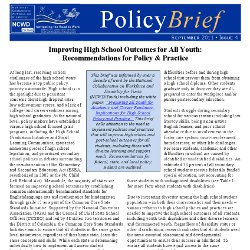 This week, the Senate Health, Education, Labor, and Pensions (HELP) Committee is scheduled to mark up an Elementary and Secondary Education Act (ESEA) reauthorization bill. The Policy Brief, "Improving High School Outcomes for All Youth: Recommendations for Policy & Practice," by the National Collaborative on Workforce & Disability for Youth (NCWD/Youth), housed at the Institute for Educational Leadership’s Center for Workforce Development, calls for various reforms aimed at improving high school and post-school outcomes for all students, including those with diverse learning and support needs. As Congress deliberates on ESEA reauthorization, the brief calls upon policy makers to consider the following issues:
This week, the Senate Health, Education, Labor, and Pensions (HELP) Committee is scheduled to mark up an Elementary and Secondary Education Act (ESEA) reauthorization bill. The Policy Brief, "Improving High School Outcomes for All Youth: Recommendations for Policy & Practice," by the National Collaborative on Workforce & Disability for Youth (NCWD/Youth), housed at the Institute for Educational Leadership’s Center for Workforce Development, calls for various reforms aimed at improving high school and post-school outcomes for all students, including those with diverse learning and support needs. As Congress deliberates on ESEA reauthorization, the brief calls upon policy makers to consider the following issues:
- Using common graduation requirements and limiting diploma options;
- Furthering adoption of universal design for learning;
- Improving educator professional development and support infrastructure; and
- Ensuring appropriate accommodations and accessibility of assessments.
Read the brief online or download a copy.
NCWD/Youth InfoBrief Looks at Bullying and Disability Harassment in the Workplace: What Youth Should Know
 October is National Bullying Prevention Month and a lot of attention is being given to bullying at school or on college campuses. However, bullying doesn't stop at the schoolyard; for many, it continues in the workplace. As part of the National Bullying Prevention Coalition, IEL's National Collaborative on Workforce & Disability for Youth (NCWD/Youth) released an InfoBrief, "Bullying and Disability Harassment in the Workplace: What Youth Should Know," which aims to help youth, including youth with disabilities, recognize signs of bullying in the workplace, and to recognize how bullying differs from disability harassment. The brief includes examples of bullying situations at work and offers strategies to help address the issue. Read the brief online or download a copy.
October is National Bullying Prevention Month and a lot of attention is being given to bullying at school or on college campuses. However, bullying doesn't stop at the schoolyard; for many, it continues in the workplace. As part of the National Bullying Prevention Coalition, IEL's National Collaborative on Workforce & Disability for Youth (NCWD/Youth) released an InfoBrief, "Bullying and Disability Harassment in the Workplace: What Youth Should Know," which aims to help youth, including youth with disabilities, recognize signs of bullying in the workplace, and to recognize how bullying differs from disability harassment. The brief includes examples of bullying situations at work and offers strategies to help address the issue. Read the brief online or download a copy.
Join IEL President Martin Blank on October 13th at the Harvard Law School Colloquium on Comprehensive Educational Opportunity
 Martin Blank, President of IEL and Director of the Coalition for Community Schools, will be speaking at a colloquium on Comprehensive Educational Opportunity at the Harvard Law School on Thursday, October 13th at 7:00 pm. He will be discussing how community schools are the vehicle for providing comprehensive opportunities to our young people. Please join us. View event flyer.
Martin Blank, President of IEL and Director of the Coalition for Community Schools, will be speaking at a colloquium on Comprehensive Educational Opportunity at the Harvard Law School on Thursday, October 13th at 7:00 pm. He will be discussing how community schools are the vehicle for providing comprehensive opportunities to our young people. Please join us. View event flyer.
Learn more about community schools.
USDOL Awards Another Year of Funding for NCWD/Youth
 The U.S. Department of Labor’s Office of Disability Employment Policy awarded an additional year of funding ($950,000) for the National Collaborative on Workforce and Disability for Youth (NCWD/Youth) to the Institute for Educational Leadership. Now entering its eleventh year, NCWD/Youth is a national technical assistance center focused on improving employment, education, and transition outcomes for youth, including youth with disabilities. Read ODEP’s press release.
The U.S. Department of Labor’s Office of Disability Employment Policy awarded an additional year of funding ($950,000) for the National Collaborative on Workforce and Disability for Youth (NCWD/Youth) to the Institute for Educational Leadership. Now entering its eleventh year, NCWD/Youth is a national technical assistance center focused on improving employment, education, and transition outcomes for youth, including youth with disabilities. Read ODEP’s press release.
With support from ODEP, NCWD-Youth is a collaboration between the Institute for Educational Leadership’s Center for Workforce Development, the PACER Center, the National Association of Workforce Development Professionals (NAWDP), the University of Minnesota’s Institute for Community Integration, and Boston University’s School of Education.
Disability Mentoring Day to Be Celebrated October 19
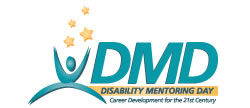 Organized by the American Association of People with Disabilities (AAPD), Disability Mentoring Day (DMD) is a program that connects nationally nearly 20,000 students and jobseekers with all types of disabilities to thousands of employers each year and currently takes place in more than 300 locations in every US State and Territory. This year, DMD falls on October 19, but many schools and programs participate throughout the month of October. DMD promotes career development for students and jobseekers with disabilities through hands-on career exploration, on-site job shadowing, and ongoing mentoring leading to internship and employment opportunities. To learn about how to participate and connect to AAPD’s national DMD employer sponsors, visit www.disabilitymentor.net.
Organized by the American Association of People with Disabilities (AAPD), Disability Mentoring Day (DMD) is a program that connects nationally nearly 20,000 students and jobseekers with all types of disabilities to thousands of employers each year and currently takes place in more than 300 locations in every US State and Territory. This year, DMD falls on October 19, but many schools and programs participate throughout the month of October. DMD promotes career development for students and jobseekers with disabilities through hands-on career exploration, on-site job shadowing, and ongoing mentoring leading to internship and employment opportunities. To learn about how to participate and connect to AAPD’s national DMD employer sponsors, visit www.disabilitymentor.net.
Community Schools Featured in New USDOE Handbook!
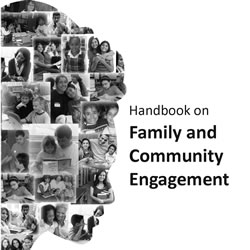 Community schools are quickly becoming embedded in the U.S. Department of Education’s school reform strategy as an innovative and efficient method for turning around schools.
Community schools are quickly becoming embedded in the U.S. Department of Education’s school reform strategy as an innovative and efficient method for turning around schools.
Community schools are quickly becoming embedded in the U.S. Department of Education’s school reform strategy as an innovative and efficient method for turning around schools. A new publication entitled the Handbook for Family and Community Engagement (aka. FACE Handbook), funded by the Department, dedicates an entire chapter, Engaging the Entire Community: The Community Schools’ Way (page 45), to the community schools strategy.
The Handbook comes at a time when educators and policymakers alike, are trying to crack the code on family and community engagement. It shares best practices for practitioners and policymakers at the local, state, and national level around family and community engagement.
The community schools chapter draws from the Coalition’s soon to be released publication: Scaling Up Schools and Community Partnerships. The guide is now accessible at www.communityschools.org/scalingup.
Click here for the PDF version of the Handbook.
National Center for Learning Disabilities Releases State of Learning Disabilities Report
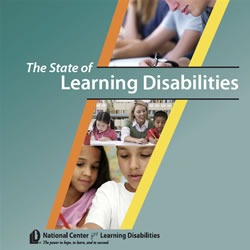 The National Center for Learning Disabilities released "The State of Learning Disabilities: Facts, Trends, and Indicators". This biennial publication includes key facts and current statistics, information on learning disabilities in secondary schools, postsecondary education, and the workforce. About 5% of public students (2.5 million) in the U.S. have a learning disability, of which, almost two-thirds are male. And only about a third of students with a learning disability are provided with assistive technology to support their instruction and learning. The report's conclusions underline the overlying challenges ahead and outlines some directions to move to improve outcomes for individuals with learning disabilities.
The National Center for Learning Disabilities released "The State of Learning Disabilities: Facts, Trends, and Indicators". This biennial publication includes key facts and current statistics, information on learning disabilities in secondary schools, postsecondary education, and the workforce. About 5% of public students (2.5 million) in the U.S. have a learning disability, of which, almost two-thirds are male. And only about a third of students with a learning disability are provided with assistive technology to support their instruction and learning. The report's conclusions underline the overlying challenges ahead and outlines some directions to move to improve outcomes for individuals with learning disabilities.
National Workforce Week of Action to be held August 15 – 19
 The National Association of Workforce Development Professionals and other national workforce organizations are organizing the National Workforce Week of Action, August 15- 19, while members of Congress are in their home districts. Individuals and organizations concerned about funding for employment and training programs are encouraged to schedule a meeting with their Senators and Representative at their in-district offices. Employment and training programs can use this opportunity to educate members of Congress about the benefits of workforce development and how your program or organization contributes to economic recovery and has successfully assisted job seekers and employers. To learn more about the National Workforce Week of Action and obtain tip sheets and other resources, visit NAWDP's website and the Facebook page.
The National Association of Workforce Development Professionals and other national workforce organizations are organizing the National Workforce Week of Action, August 15- 19, while members of Congress are in their home districts. Individuals and organizations concerned about funding for employment and training programs are encouraged to schedule a meeting with their Senators and Representative at their in-district offices. Employment and training programs can use this opportunity to educate members of Congress about the benefits of workforce development and how your program or organization contributes to economic recovery and has successfully assisted job seekers and employers. To learn more about the National Workforce Week of Action and obtain tip sheets and other resources, visit NAWDP's website and the Facebook page.
Apply Now! DC EPFP Application Deadline 8/12/11
 Grow your network by interacting with colleagues from leading research, policy and practice organizations from the DC metro area. Build strong leadership skills to create change at all levels. Become a part of the movement to create effective education policy!
Grow your network by interacting with colleagues from leading research, policy and practice organizations from the DC metro area. Build strong leadership skills to create change at all levels. Become a part of the movement to create effective education policy!
The Institute for Educational Leadership (IEL) is now recruiting participants for the 2012 class of the Education Policy Fellowship Program (EPFPTM) at its Washington, DC, site.
DC EPFP provides unparalleled opportunities for Fellows to develop leadership skills and an understanding of public policy. The program is sponsored and supported by the Institute for Educational Leadership (IEL). The program capitalizes on the area's wealth of resources, including an extensive DC metropolitan alumni network of over 950, as well as on the talented Fellows in the program each year.
EPFP currently operates in eleven state sites (CT, GA, MA, MI, MN, MS, NY, NC, OH, PA, and SC) and the District of Columbia, and combines regular meetings and activities specific to each state site program with events of national scope to provide an enriching experience for more than 200 Fellows each year. Click here for more information on each state site program.
DC EPFP applications are available online and will be accepted through August 12, 2011.
Please contact Stefani Wilcox, Program Coordinator, with any questions.
NCWD/Youth Releases New Podcast Series - "Helping Youth Develop Soft Skills for Job Success"
 The National Collaborative on Workforce and Disability for Youth (NCWD/Youth) has just released a new podcast series for parents and families titled, "Helping Youth Develop Soft Skills for Job Success." The podcast series includes the following four episodes:
The National Collaborative on Workforce and Disability for Youth (NCWD/Youth) has just released a new podcast series for parents and families titled, "Helping Youth Develop Soft Skills for Job Success." The podcast series includes the following four episodes:
Podcast Episode #1: "Helping Youth Develop Soft Skills for Job Success"
Podcast Episode #2: "How to Build Communication Skills for Job Success"
Podcast Episode #3: "How to Build Interpersonal Skills for Job Success"
Podcast Episode #4: "How to Build Lifelong Learning Skills for Job Success"
This podcast series provides ideas for parents and families on activities they can do at home and include in their child's Individualized Education Program (IEP) to ensure he or she develops skills needed for job success by the time he or she completes high school. Learn more and listen to the podcasts.
NCWD/Youth Blogs Daily for Americans with Disabilities Act Week
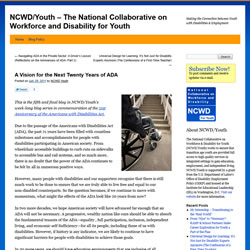 The week of July 25 was Americans with Disabilities Act (ADA) Week. Twenty-one years ago, President H.W. Bush signed into law this groundbreaking civil rights legislation for persons with disabilities. The ADA prohibits discrimination based on disability and allows equal access in the areas of employment, public entities and transportation, public accommodations and commercial facilities, telecommunications, and other areas. To celebrate the passage of this legislation, honor the progress made in the past 21 years, and to acknowledge the distance our country has yet to go, NCWD/Youth is posting a blog every day during ADA week. These blog entries include:
The week of July 25 was Americans with Disabilities Act (ADA) Week. Twenty-one years ago, President H.W. Bush signed into law this groundbreaking civil rights legislation for persons with disabilities. The ADA prohibits discrimination based on disability and allows equal access in the areas of employment, public entities and transportation, public accommodations and commercial facilities, telecommunications, and other areas. To celebrate the passage of this legislation, honor the progress made in the past 21 years, and to acknowledge the distance our country has yet to go, NCWD/Youth is posting a blog every day during ADA week. These blog entries include:
"The Americans with Disabilities Act (ADA) – An "ADA Generation" Perspective" – 7/25/2011
"Getting My First Job: If Only... What If??? (Reflections on the Anniversary of ADA)" – 7/26/2011
"The Disability Rights Movement and 21 Years of the Americans with Disabilities Act" –/ 7/27/2011
"Navigating ADA in the Private Sector: A Driver's Lesson (Reflections on the Anniversary of ADA: Part 2)" – 7/28/2011
"A Vision for the Next 20 Years of the ADA" – 7/29/2011
To read other NCWD/Youth blog entries, go to www.ncwd-youth.info/blog.
NCWD/Youth and Ready to Achieve Mentoring Program™ Blog about Career Exploration
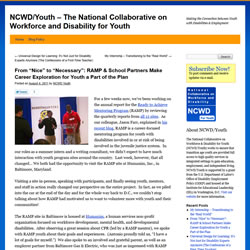 The National Collaborative on Workforce and Disability for Youth (NCWD/Youth) and the Ready to Achieve Mentoring Program (RAMP)™, both programs of IEL, recently posted blogs on the value and practice of providing career exposure activities to youth and young adults. Career exposure is a key youth development activity necessary for the successful transition of all youth, including youth with disabilities, into the world of work, independence, and healthy adulthood, as outlined in NCWD/Youth's Guideposts for Success. NCWD/Youth is a national technical assistance center funded by the U.S. Department of Labor's Office of Disability Employment Policy. RAMP™, funded by the U.S. Department of Justice's Office of Juvenile Justice and Delinquency Prevention, is a career-focused mentoring program for youth with disabilities involved in or at risk of becoming involved in the juvenile justice system.
The National Collaborative on Workforce and Disability for Youth (NCWD/Youth) and the Ready to Achieve Mentoring Program (RAMP)™, both programs of IEL, recently posted blogs on the value and practice of providing career exposure activities to youth and young adults. Career exposure is a key youth development activity necessary for the successful transition of all youth, including youth with disabilities, into the world of work, independence, and healthy adulthood, as outlined in NCWD/Youth's Guideposts for Success. NCWD/Youth is a national technical assistance center funded by the U.S. Department of Labor's Office of Disability Employment Policy. RAMP™, funded by the U.S. Department of Justice's Office of Juvenile Justice and Delinquency Prevention, is a career-focused mentoring program for youth with disabilities involved in or at risk of becoming involved in the juvenile justice system.
Follow the links below to read the career exploration blog entries.
- "From 'Nice' to 'Necessary': RAMP and School Partners Make Career Exploration for Youth a Part of the Plan" – www.ncwd-youth.info, 8/4/2011
- "Youth and Employers Connect Through Summer Career Exploration" – ramp.iel.org, 7/21/2011
Individualized Learning Plans Webinar on July 26th - Register Now
 NCWD/Youth invites you to participate in the webinar, “The Nature of Effective Individualized Learning Plans and Their Promise in Supporting College and Career Readiness” on Tuesday, July 26 from 3:00 to 4:30 pm Eastern. NCWD/Youth partner Scott Solberg, Ph. D. at Boston University and Taryn Williams, from the Office of Disability Employment Policy (ODEP), U.S. Department of Labor, will share information from an on-going national study sponsored by ODEP. This webinar will describe the nature of individualized learning plans (ILPs), share promising ILP implementation practices, identify how ILPs serve as a bridge in supporting both college and career readiness outcomes, and describe empirical research results related to these efforts.
NCWD/Youth invites you to participate in the webinar, “The Nature of Effective Individualized Learning Plans and Their Promise in Supporting College and Career Readiness” on Tuesday, July 26 from 3:00 to 4:30 pm Eastern. NCWD/Youth partner Scott Solberg, Ph. D. at Boston University and Taryn Williams, from the Office of Disability Employment Policy (ODEP), U.S. Department of Labor, will share information from an on-going national study sponsored by ODEP. This webinar will describe the nature of individualized learning plans (ILPs), share promising ILP implementation practices, identify how ILPs serve as a bridge in supporting both college and career readiness outcomes, and describe empirical research results related to these efforts.
To register for this free webinar, visit the TA&D Network iLinc website, select the Effective Individualized Learning Plans webinar, and click the “Register” button at the bottom of the page. Questions? Please contact Catherine Fowler, chfowler@uncc.edu.
Oakland Unified School District Releases 5 Year Strategic Plan: Community Schools, Thriving Students
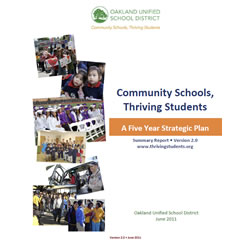 The Oakland Unified School District (OUSD) just released their 5 Year strategic plan, Community Schools, Thriving Students. In this plan, OUSD outlines goal areas and landmarks to align, coordinate, and leverage resources for the well being of Oakland’s children and families. Read full report here.
The Oakland Unified School District (OUSD) just released their 5 Year strategic plan, Community Schools, Thriving Students. In this plan, OUSD outlines goal areas and landmarks to align, coordinate, and leverage resources for the well being of Oakland’s children and families. Read full report here.
Member of IEL’s RAMP Team Nominated by President Obama to Serve on National Council of Disability
 President Obama announced his intent to nominate Stephanie Orlando to serve on the presidentially appointed National Council on Disability (NCD). Orlando works for YOUTH POWER!, a program of Families Together in New York State. YOUTH POWER! is the state coordinating entity for the Ready to Achieve Mentoring Program in New York State; and Families Together in Albany County is one of the three New York RAMP sites.
President Obama announced his intent to nominate Stephanie Orlando to serve on the presidentially appointed National Council on Disability (NCD). Orlando works for YOUTH POWER!, a program of Families Together in New York State. YOUTH POWER! is the state coordinating entity for the Ready to Achieve Mentoring Program in New York State; and Families Together in Albany County is one of the three New York RAMP sites.
NCD is a small, independent federal agency charged with advising the President, Congress, and other federal agencies regarding policies, programs, practices, and procedures that affect people with disabilities. NCD is comprised of a team of fifteen Senate-confirmed Presidential appointees , an Executive Director appointed by the Chairman, and eleven, full-time professional staff.
Orlando is the Director of YOUTH POWER! of Families Together in New York State, a statewide advocacy network comprised of young people who have disabilities and experience in state child-serving systems. After receiving children’s mental health, special education and residential services herself, Orlando has become a strong advocate for youth with disabilities on county, state and national levels. Beginning in 2006, she served a term as Chairperson of the Youth Advisory Committee to the National Council on Disability. Orlando serves on the New York State Commissioners’ Committee on Cross-Systems Services for Children & Youth, the New York State Commissioner’s Advisory Panel for Special Education Services, the New York Mental Health Services Planning Council, and the Board of Directors of the Children’s Mental Health Coalition of Western New York. She received the Diana Vietz Award in 2008 from the National Council on Independent Living, the mpower Award in 2006 from Mental Health America (formerly National Mental Health Association) and the 2004 Erie County Executive Award for Disability Employment Awareness Month. Orlando earned her Bachelor of Arts in 2005 from the State University of New York at Buffalo.
Read the White House press release here.
IEL’s Education Policy Fellowship Program (EPFP™) Seeks Applicants: Deadline September 2011
 IEL, in partnership with its thirteen state-based program sites, is now recruiting for the 2011-2012 cohort of the Education Policy Fellowship Program (EPFPTM). EPFP™ is a professional development program for individuals whose work record reflects strong leadership ability and a concern for issues important to children and education. Participants hold full-time positions in diverse organizations at the local, state, and national levels. EPFP™ combines regular meetings and activities specific to each State site program with events of national scope to provide an enriching experience for more than 200 Fellows each year.
IEL, in partnership with its thirteen state-based program sites, is now recruiting for the 2011-2012 cohort of the Education Policy Fellowship Program (EPFPTM). EPFP™ is a professional development program for individuals whose work record reflects strong leadership ability and a concern for issues important to children and education. Participants hold full-time positions in diverse organizations at the local, state, and national levels. EPFP™ combines regular meetings and activities specific to each State site program with events of national scope to provide an enriching experience for more than 200 Fellows each year.
The program currently operates through sites in Connecticut, Georgia, Massachusetts, Michigan, Minnesota, Mississippi, Missouri, New York, North Carolina, Ohio, Pennsylvania, South Carolina, and Washington, DC. Click here for more information about each state site program and to download an application.
Contact epfp@iel.org if you have any questions.
Jerry Weast, Retiring Montgomery County (MD) Superintendent, Joins the IEL Board
 The Institute for Educational Leadership (IEL), a 47-year old non-profit, nonpartisan organization, has elected Jerry Weast to its Board of Directors. Jerry Weast has served as the Superintendent of Montgomery County Public Schools (MCPS) for 12 years. Dr. Weast has served during a period of great demographic change in Montgomery County and has kept the focus on narrowing the achievement gap for the district’s nearly 145,000 students. Under his leadership, MCPS has been recognized in three consecutive years for achieving the highest student graduation rate among the nation’s 50 largest school systems. MCPS received the Malcolm Baldrige National Quality Award (2010), and was a finalist for the Broad Prize in Education (2010). Dr. Weast has been named superintendent of the year in two states.
The Institute for Educational Leadership (IEL), a 47-year old non-profit, nonpartisan organization, has elected Jerry Weast to its Board of Directors. Jerry Weast has served as the Superintendent of Montgomery County Public Schools (MCPS) for 12 years. Dr. Weast has served during a period of great demographic change in Montgomery County and has kept the focus on narrowing the achievement gap for the district’s nearly 145,000 students. Under his leadership, MCPS has been recognized in three consecutive years for achieving the highest student graduation rate among the nation’s 50 largest school systems. MCPS received the Malcolm Baldrige National Quality Award (2010), and was a finalist for the Broad Prize in Education (2010). Dr. Weast has been named superintendent of the year in two states.
Upon his selection, Mr. Weast commented, “IEL has a long history of developing effective education leaders, and that is where I want to put my energy in the coming years. Joining the IEL board gives me an important vehicle for pursuing that goal.”
“Our nation needs more school leaders like Jerry Weast,” said Martin Blank, president of IEL. “We are honored to have him join our board, and look forward to working with him to develop the kind of leaders who will provide an equal opportunity for all children and youth to learn, develop, and become contributing citizens of our democracy.”
Read the full press release (PDF).
Ready to Achieve Mentoring Program Launches New Website
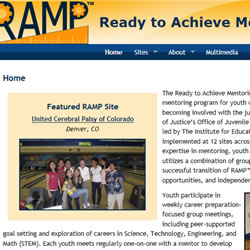 The Ready to Achieve Mentoring Program (RAMP)TM has launched its newly redesigned website. The new website has a large multimedia gallery that includes photos and videos from RAMP sites, as well as multi-site and national events. Don’t miss the new RAMP blog, which will be updated regularly by RAMP staff, mentors, youth, and other stakeholders. The website provides RAMP coordinators a password-protected “Coordinators’ Corner,” where they can share documents, resources, and tools; have online discussions with each other on a variety of topics; and stay up-to-date on RAMP events with an online calendar.
The Ready to Achieve Mentoring Program (RAMP)TM has launched its newly redesigned website. The new website has a large multimedia gallery that includes photos and videos from RAMP sites, as well as multi-site and national events. Don’t miss the new RAMP blog, which will be updated regularly by RAMP staff, mentors, youth, and other stakeholders. The website provides RAMP coordinators a password-protected “Coordinators’ Corner,” where they can share documents, resources, and tools; have online discussions with each other on a variety of topics; and stay up-to-date on RAMP events with an online calendar.
Led by the Institute for Educational Leadership’s Center for Workforce Development, RAMP is a high-tech, career-focused mentoring program for youth with disabilities involved in or at risk of becoming involved in the juvenile justice system. RAMP is funded by the U.S. Department of Justice’s Office of Juvenile Justice and Delinquency Prevention.
Visit the new website at http://ramp.iel.org.
Individualized Learning Plan Webinar Recording & Transcript Now Available
 The National Collaborative on Workforce & Disability for Youth (NCWD/Youth) has posted recording and transcript from the May 12, 2011 webinar, “The Nature of Effective Individualized Learning Plans and Their Promise in Supporting College and Career Readiness.” In this webinar, Scott Solberg, Ph. D. with the Center on Education and Work (CEW) at University of Wisconsin – Madison, a NCWD/Youth partner, shared findings from an on-going national study sponsored by the U.S. Department of Labor’s Office of Disability Employment Policy (ODEP). This webinar describes the nature of individualized learning plans (ILPs), highlights promising ILP implementation practices, identifies how ILPs serve as a bridge in supporting both college and career readiness outcomes, and describes empirical research results related to these efforts. Access the webinar recording and transcript here.
The National Collaborative on Workforce & Disability for Youth (NCWD/Youth) has posted recording and transcript from the May 12, 2011 webinar, “The Nature of Effective Individualized Learning Plans and Their Promise in Supporting College and Career Readiness.” In this webinar, Scott Solberg, Ph. D. with the Center on Education and Work (CEW) at University of Wisconsin – Madison, a NCWD/Youth partner, shared findings from an on-going national study sponsored by the U.S. Department of Labor’s Office of Disability Employment Policy (ODEP). This webinar describes the nature of individualized learning plans (ILPs), highlights promising ILP implementation practices, identifies how ILPs serve as a bridge in supporting both college and career readiness outcomes, and describes empirical research results related to these efforts. Access the webinar recording and transcript here.
To learn more about Individual Learning Plans, see NCWD/Youth’s Individual Learning Plan Fact sheet, the overview of the ODEP-funded Research and Demonstration Project, and the Info Brief, Understanding the Role of Individual Learning Plans in Transition Planning for Youth with Disabilities.
NCWD/Youth Releases New Brief for Families on Helping Youth Develop Soft Skills
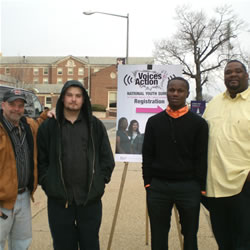 IEL’s NCWD/Youth's latest Info Brief, Helping Youth Develop Soft Skills for Job Success: Tips for Parents and Families, is now available online. Parents and family members can help young people prepared for job success by working with them and encouraging them to develop soft skills. "Soft skills" are common sense skills that are important in all aspects of life and have been identified by employers as particularly important for success at work. By improving these skills, all youth, including youth with disabilities, can enhance their social life, do better in postsecondary education pursuits, and be more successful at finding and maintaining employment. This Info Brief describes several strategies that families can use to help youth develop soft skills. Read the brief online or download it as a PDF or Word document.
IEL’s NCWD/Youth's latest Info Brief, Helping Youth Develop Soft Skills for Job Success: Tips for Parents and Families, is now available online. Parents and family members can help young people prepared for job success by working with them and encouraging them to develop soft skills. "Soft skills" are common sense skills that are important in all aspects of life and have been identified by employers as particularly important for success at work. By improving these skills, all youth, including youth with disabilities, can enhance their social life, do better in postsecondary education pursuits, and be more successful at finding and maintaining employment. This Info Brief describes several strategies that families can use to help youth develop soft skills. Read the brief online or download it as a PDF or Word document.
Ready to Achieve Mentoring Program in New York Recognized During Mental Health Awareness Month
 Staff of the Ready to Achieve Mentoring Program (RAMP) in Albany, NY, which is operated by Youth Power – Families Together in New York State, will be recognized by the New York State Office of Mental Health, Division of Children’s and Families (OMH) for their hard work and innovation in promoting children’s social emotional development through RAMP. RAMP Coordinator Zach Garafalo, youth and families involved in the program have been invited to speak at the OMH award ceremony and celebration on May 9th, 2011. May is National Mental Health Awareness Month and the first week of May is Children’s Mental Health Awareness Week.
Staff of the Ready to Achieve Mentoring Program (RAMP) in Albany, NY, which is operated by Youth Power – Families Together in New York State, will be recognized by the New York State Office of Mental Health, Division of Children’s and Families (OMH) for their hard work and innovation in promoting children’s social emotional development through RAMP. RAMP Coordinator Zach Garafalo, youth and families involved in the program have been invited to speak at the OMH award ceremony and celebration on May 9th, 2011. May is National Mental Health Awareness Month and the first week of May is Children’s Mental Health Awareness Week.
Many youth in the RAMP program have mental health needs as well as other disabilities. Based on the NCWD/Youth’s Paving the Way to Work career-focused mentoring guide and Guideposts for Success framework, RAMP provides high tech, career-focused group, peer, and one-on-one mentoring for youth with disabilities involved with or at-risk of becoming involved with the juvenile justice system. RAMP operates in 12 sites nationwide under the leadership of the Institute for Educational Leadership (IEL) Center for Workforce Development with funding from the Department of Justice’s Office of Juvenile Justice and Delinquency Prevention (OJJDP).
IEL CWD also houses the NCWD/Youth, funded by the U.S. Department of Labor Office of Disability Employment Policy (ODEP), and has published various resources on practices and policies for serving youth with mental health needs. Learn more about RAMP and NCWD/Youth’s mental health resources.
May 12th Webinar on Individual Learning Plans
 The Center on Education and Work (CEW) at University of Wisconsin – Madison will host a webinar on May 12, 2011 at 3:30 pm Central/ 4:30 pm Eastern on “The Nature of Effective Individualized Learning Plans and Their Promise in Supporting College and Career Readiness.” CEW is a partner in the National Collaborative on Workforce & Disability for Youth (NCWD/Youth) housed at the Institute for Educational Leadership Center for Workforce Development. Based on an on-going national study sponsored by the U.S. Department of Labor’s Office of Disability Employment Policy (ODEP), Scott Solberg, Ph. D. will present on the nature of individualized learning plans (ILPs), share promising ILP implementation practices, identify how ILPs serve as a bridge in supporting both college and career readiness outcomes, and describe empirical research results related to these efforts.
The Center on Education and Work (CEW) at University of Wisconsin – Madison will host a webinar on May 12, 2011 at 3:30 pm Central/ 4:30 pm Eastern on “The Nature of Effective Individualized Learning Plans and Their Promise in Supporting College and Career Readiness.” CEW is a partner in the National Collaborative on Workforce & Disability for Youth (NCWD/Youth) housed at the Institute for Educational Leadership Center for Workforce Development. Based on an on-going national study sponsored by the U.S. Department of Labor’s Office of Disability Employment Policy (ODEP), Scott Solberg, Ph. D. will present on the nature of individualized learning plans (ILPs), share promising ILP implementation practices, identify how ILPs serve as a bridge in supporting both college and career readiness outcomes, and describe empirical research results related to these efforts.
Registration is required and free. Register online.
To learn more about Individual Learning Plans, see NCWD/Youth’s Individual Learning Plan Fact sheet, the overview of the ODEP-funded Research and Demonstration Project, and the Info Brief, Understanding the Role of Individual Learning Plans in Transition Planning for Youth with Disabilities.
New Workplace Mentoring Primer Helps Foster Diversity & Inclusion
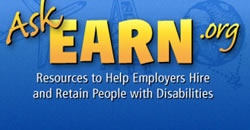 A new, online Federal Workplace Mentoring Primer provides strategies and resources for developing, implementing, and improving formal workplace mentoring programs, including tips for fostering diversity and inclusion.
A new, online Federal Workplace Mentoring Primer provides strategies and resources for developing, implementing, and improving formal workplace mentoring programs, including tips for fostering diversity and inclusion.
The Primer was developed by the Institute for Educational Leadership (IEL) Center for Workforce Development in partnership with the Cornell National Technical Assistance, Policy and Research Center for Employers on Employment of People with Disabilities as part of a federally funded grant from the Office of Disability Employment Policy (ODEP), U. S. Department of Labor.
The Primer contents include:
- How to develop a mentoring culture
- Ten approaches to mentoring
- Mentoring program practices and tools
- Structured activities for protégés and mentors
- Other resources on mentoring, diversity, and inclusion
In developing this new resource, the IEL Center for Workforce Development built upon its expertise and resources on career-focused mentoring for youth and young adults developed as a part of the ODEP supported National Collaborative on Workforce & Disability for Youth (NCWD/Youth). The Primer contents were informed by a working group of federal employees and build on the U. S. Office of Personnel Management’s Best Practices: Mentoring.
While this resource was developed for any federal government employee interested in learning the basics of workplace mentoring and how to apply them within the federal government, those working outside the federal government may also find it helpful for establishing and improving formal mentoring programs in non-federal workplaces.
Evansville, IN Community Schools Initiative Featured in Ed Week 04/20/11
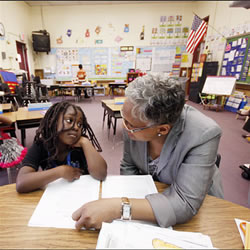 Evansville Vanderburgh School Corporation (EVSC) in Evansville, IN, is one of the many school districts across the Nation that is implementing the community school strategy to meet the needs of their students, families, and communities. Ed Week reporter, Mary Ann Zehr, shares stories from first person accounts with families, school faculty, and students from Lincoln K-8 School and Glenwood Leadership Academy. The article highlights, the innovative approaches that EVSC is using in their district to meet the needs of the community. These stories illuminate the partnerships and resources that EVSC weaves together to provide for its schools and community through this strategy.
Evansville Vanderburgh School Corporation (EVSC) in Evansville, IN, is one of the many school districts across the Nation that is implementing the community school strategy to meet the needs of their students, families, and communities. Ed Week reporter, Mary Ann Zehr, shares stories from first person accounts with families, school faculty, and students from Lincoln K-8 School and Glenwood Leadership Academy. The article highlights, the innovative approaches that EVSC is using in their district to meet the needs of the community. These stories illuminate the partnerships and resources that EVSC weaves together to provide for its schools and community through this strategy.
Key to their community schools strategy is partnerships with local churches, social service providers, and community-based organizations that have been fostered over the years. Additionally, they have been able to implement this strategy as a result of their ability to leverage grants from 14 federal funding (e.g., Titles I, II, III, IV, Full Service Community Schools grant, Even Start, and others) streams as well as community resources. EVSC has been recognized by education scholars and practitioners around the country as an exemplar model of a community school strategy.
Fundamental to their success has been the support from their Superintendent Dr. Vince Bertram, a strong advocate of this strategy. Dr. Bertram credits the community school strategy with helping to raise student achievement. Four school years ago, only one of the district’s schools was "exemplary," the top ranking of five in Indiana’s accountability system. Last school year, 17 district schools were deemed "exemplary."
Community Schools National Advocacy Event: June 15-16, 2011
 On June 15- 16, 2011, the Coalition for Community Schools invites you to join peers from across the Nation in Washington, DC to educate your Members of Congress on the community school strategy and illustrate to them the importance of why we need more community schools to flourish in thousands of communities.
On June 15- 16, 2011, the Coalition for Community Schools invites you to join peers from across the Nation in Washington, DC to educate your Members of Congress on the community school strategy and illustrate to them the importance of why we need more community schools to flourish in thousands of communities.
As a community school leader, practitioner, and/or advocate, you know best how the community school strategy has impacted your community. Has your school’s chronic absentee rate been cut in half over the past 5 years? Do more youth and families in your community have access to health services? Are families more engaged in their child’s education? Are your students acing their math and reading exams?
We need you to share these successes on Capitol Hill!
Your presence and power at this important event will help push pending bills that support community schools: DIPLOMA, FSCS, and the Supporting Community School Acts.
Save the dates June 15-16, 2011 and plan to participate in the Community Schools National Advocacy Event! Check back for additional details and registration information in the coming weeks.
Tapping into the Power of Families Info Brief from NCWD/Youth
 IEL's National Collaborative on Workforce & Disability for Youth (NCWD/Youth) has a new Info Brief, Tapping into the Power of Families: How Families of Youth with Disabilities Can Assist in Job Search and Retention. Families are often the first, most knowledgeable, and most consistent case manager youth with disabilities have. Families possess valuable information about a youth's strengths, interests, and needs. The purpose of this brief is to give families and other caring adults information on how their involvement can make a positive impact on a youth's work readiness, career exploration, and workplace success. Educators and other youth service professionals can also use this information to consider how to involve family members in a young person's work readiness and career development.
IEL's National Collaborative on Workforce & Disability for Youth (NCWD/Youth) has a new Info Brief, Tapping into the Power of Families: How Families of Youth with Disabilities Can Assist in Job Search and Retention. Families are often the first, most knowledgeable, and most consistent case manager youth with disabilities have. Families possess valuable information about a youth's strengths, interests, and needs. The purpose of this brief is to give families and other caring adults information on how their involvement can make a positive impact on a youth's work readiness, career exploration, and workplace success. Educators and other youth service professionals can also use this information to consider how to involve family members in a young person's work readiness and career development.
House & Senate Re-introduce
Full Service Community Schools Act
 On March 15, Representative Steny H. Hoyer and Senator Ben Nelson reintroduced the Full-Service Community Schools Act of 2011. In a statement about the re-introduction, Rep. Hoyer said:
On March 15, Representative Steny H. Hoyer and Senator Ben Nelson reintroduced the Full-Service Community Schools Act of 2011. In a statement about the re-introduction, Rep. Hoyer said:
"…Full-service community schools…tap into community resources to ensure that when children go to school, they are ready to learn and their families are prepared to support learning. Students and their families are able to access a wide range of services – from early childhood programs, to health clinics and dental care, to English lessons and career advice for parents. These services remove serious obstacles that would prevent children from succeeding.
"…The results speak for themselves: these schools see higher student achievement, better parent participation, and higher attendance…and I hope that the full-service community school model will be included in the reauthorization of the Elementary and Secondary Education Act which is under discussion."
Diverse Coalition of National Organizations Calls for “Workforce Day of Action” on March 24
 A coalition of 18 youth- and adult-related national organizations have united to call for a “Workforce Day of Action” on March 24, 2011. During this time, federal lawmakers will be away from Washington, DC and back in their home offices, providing an ideal time for individuals and organizations interested in supporting federally funded workforce development programming.
A coalition of 18 youth- and adult-related national organizations have united to call for a “Workforce Day of Action” on March 24, 2011. During this time, federal lawmakers will be away from Washington, DC and back in their home offices, providing an ideal time for individuals and organizations interested in supporting federally funded workforce development programming.
This coalition called for the Workforce Day of Action in response to attempts by leaders in the U.S. House of Representatives to completely eliminate funding for the Workforce Investment Act (WIA), which forms the backbone of our country’s workforce development infrastructure. Over the past two years, WIA participation rates have increased by 234%, but funding levels have remained level since 2008. WIA Youth Activities funding has steadily declined in the last decade. There are additional dramatic cuts in other federal workforce programs, including the Perkins Career and Technical Education Act, Youth Build, Job Corps, and others.
The coalition calling for the Workforce Day of Action includes the American Association of Community Colleges, Association for Career and Technical Education, Center for Law and Social Policy, Corps Network, Jobs for the Future, National Association of Workforce Boards, National Association of Workforce Development Professionals, National Council of La Raza, National Skills Coalition, U.S. Conference of Mayors, and many others.
- Learn more about the Workforce Day of Action.
- Learn more about contacting your representatives for the Workforce Day of Action.
IEL’s National Consortium on Leadership & Disability for Youth Release Internship Guide
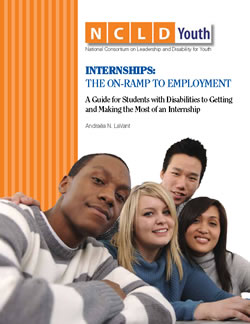 A new guide developed by IEL’s National Consortium on Leadership & Disability for Youth (NCLD/Youth) titled Internships: The On-Ramp to Employment, A Guide for Students with Disabilities to Getting and Making the Most of an Internship leads young people through the step-by-step process of finding, applying for, participating in and even evaluating an internship. Completing an internship is an ideal way for young people with and without disabilities to prepare for their career field of choice.
A new guide developed by IEL’s National Consortium on Leadership & Disability for Youth (NCLD/Youth) titled Internships: The On-Ramp to Employment, A Guide for Students with Disabilities to Getting and Making the Most of an Internship leads young people through the step-by-step process of finding, applying for, participating in and even evaluating an internship. Completing an internship is an ideal way for young people with and without disabilities to prepare for their career field of choice.
With tools necessary to maintain a competitive advantage over fellow job seekers, this guide provides activities focused on career exploration, interview and resume building, goal setting, networking, and more to prepare young people to successfully complete an internship and transition toward employment. In addition, the guide includes information and tips of specific relevance to youth with disabilities, including finding accessible housing, navigating the transportation system, disclosing a disability, and employing a personal care attendant.
Learn more and download the guide.
IEL Staff to Model in American Association of People with Disabilities Gala Fashion Show
 On March 15, IEL Youth Development Specialist Andraéa LaVant will serve as a model for the American Association of People with Disabilities (AAPD) Fashion Show as a part of AAPD’s Annual Leadership Gala and Anniversary Celebration. For nine years, this event has brought together leaders from government, business, religious, and disability and civil rights communities to recognize the outstanding efforts of those who have made great strides for people with disabilities across various sectors.
On March 15, IEL Youth Development Specialist Andraéa LaVant will serve as a model for the American Association of People with Disabilities (AAPD) Fashion Show as a part of AAPD’s Annual Leadership Gala and Anniversary Celebration. For nine years, this event has brought together leaders from government, business, religious, and disability and civil rights communities to recognize the outstanding efforts of those who have made great strides for people with disabilities across various sectors.
This year’s Gala will provide a somewhat different experience for attendees, as the event will begin with the first ever AAPD Gala Fashion Show. It will feature the creative designs of fashion icon Norma Kamali. In an effort to depict the “accessibility” of fashion, all models to be featured are women who have various disabilities.
In addition to the fashion show, the Leadership Gala will celebrate multiple leaders, including: Congressman Jim Sensenbrenner, Jr. and Mrs. Cheryl Sensenbrenner, recipients of the Spirit of the ADA Awards; Jessica Lehman and Catharine McNally, recipients of the Paul G. Hearne Leadership Award; and the Cast and Creative Team behind the Fox Television show “Glee,” recipients of the Image Award.
For more information about the AAPD Leadership Gala and Anniversary Celebration, visit AAPD’s website.
Four Distinguished Leaders Join the Board of the Institute for Educational Leadership
 The Institute for Educational Leadership (IEL), a 47-year old non-profit, nonpartisan organization, has elected four new members to its board of directors to help the organization fulfill its mission: build the capacity of individuals, organizations, systems and communities to work together to prepare all children and youth for post-secondary education, careers, and citizenship. The new members are:
The Institute for Educational Leadership (IEL), a 47-year old non-profit, nonpartisan organization, has elected four new members to its board of directors to help the organization fulfill its mission: build the capacity of individuals, organizations, systems and communities to work together to prepare all children and youth for post-secondary education, careers, and citizenship. The new members are:
S. Decker Anstrom, Retired Chairman of the Weather Channel and President, Landmark Communications. Prior to his impressive career in cable television, Decker worked on the creation of the U.S. Department of Education for the Carter Administration.
June Atkinson, State Superintendent of Public Instruction, NC. June’s connection to IEL dates back over 25 years to her participation in the ‘84-‘85 cohort of IEL’s Education Policy Fellowship Program.
Karen L. Mapp, Lecturer and Faculty Director for the Education, Policy, and Management Master’s Program, Harvard Graduate School of Education. Karen has published extensively on family involvement in education, including Beyond the Bake Sale: The Essential Guide to Family –School Partnerships.
Jennifer Pryce, Portfolio Manager, U.S. Investments, The Calvert Foundation. Jennifer manages The Foundation’s social enterprise portfolio as well as investments in community development finance institutions, affordable housing and transit oriented development and green communities.
“These new members bring expertise and insight from business, education, family engagement, and community development to our board,” said Martin Blank, president of IEL. “Their selection reflects our institutional commitment to crossing organizational and disciplinary boundaries to harness the assets of schools and communities to help all young people succeed…”
New ETS Policy Notes - The Family: America’s Smallest School
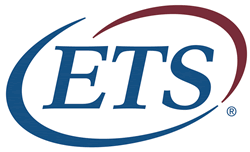 The Educational Testing Service’s “The Family: America’s Smallest School,” the 14th in its Addressing Achievement Gaps symposia series, looks at the challenges of helping families prepare for students’ school success. The October 18, 2010 conference in Washington, DC featured 15 academics, advocates, and government officials who discussed: the “Fragile Family” study and the implications for education; research and practice in early childhood education, fatherhood education, and parental involvement in schools; federal efforts at marriage promotion; and federal initiatives to involve families in schools.
The Educational Testing Service’s “The Family: America’s Smallest School,” the 14th in its Addressing Achievement Gaps symposia series, looks at the challenges of helping families prepare for students’ school success. The October 18, 2010 conference in Washington, DC featured 15 academics, advocates, and government officials who discussed: the “Fragile Family” study and the implications for education; research and practice in early childhood education, fatherhood education, and parental involvement in schools; federal efforts at marriage promotion; and federal initiatives to involve families in schools.
Many studies have linked the quality of family life to a child’s health, happiness, and school achievement. But education reformers tend to concentrate solely school-level reforms and often do not focus on the impact of families. Conference speaker Jeanne Brooks-Gunn, a development psychologist and co-director of the National Center for Children and Families at Columbia University’s Teachers College, stated that “…We talk about income and education and family structure as three separate things, but guess what? They come bundled in families.”
IEL President Martin Blank Blogs for the Huffington Post
 The Huffington Post’s latest featured blogger is Martin Blank, President of IEL. Check out his very first post, a commentary on the President’s State of the Union remarks on education:
The Huffington Post’s latest featured blogger is Martin Blank, President of IEL. Check out his very first post, a commentary on the President’s State of the Union remarks on education:
With education topping his agenda, President Obama sent a powerful message during last month's State of the Union address: No school is an island. "Education," Obama said, "begins not in our classrooms, but in our homes and communities."
"We know what's possible for our children," he continued, "when reform isn't just a top-down mandate, but the work of local teachers and principals, school boards and communities."
As someone who's fought for community-based schools for more than two decades, I couldn't agree more.
The President's words were a great start, but there is more to the message. Had he devoted more of his speech to education, here's what the President might have said…
IEL Participates in Congressional Briefing on Transition Policy for Youth with Significant Disabilities
 Please join the Institute for Educational Leadership and colleagues from the Collaboration to Promote Self-Determination on Friday, March 4, 2011 from 12:00-1:30 p.m. for a Congressional briefing entitled, Taking a TEAM Approach to Effective Transition Policy for Youth with Significant Disabilities: Using Data, Promising Practices, and Sound Policies to Promote Transitioning towards Excellence, Achievement & Mobility (TEAM).
Please join the Institute for Educational Leadership and colleagues from the Collaboration to Promote Self-Determination on Friday, March 4, 2011 from 12:00-1:30 p.m. for a Congressional briefing entitled, Taking a TEAM Approach to Effective Transition Policy for Youth with Significant Disabilities: Using Data, Promising Practices, and Sound Policies to Promote Transitioning towards Excellence, Achievement & Mobility (TEAM).
Curtis Richards, Director of IEL’s Center for Workforce Development, is one of several national experts ontransition policy who will present at the briefing about key recommendations recently introduced as a package of legislation known as the Transition towards Excellence in Achievement and Mobility (TEAM) Act. This trio of bills, including the TEAM-Education Act of 2011 (H.R. 602), the TEAM-Empowerment Act of 2011 (H.R. 603) and the TEAM-Employment Act of 2011 (H.R. 603), tackle the real challenges ever-present in our current myriad of federal policies and programs and breaks down barriers faced by youth with significant disabilities transitioning from school to adulthood. Learn more about the TEAM Act package.
This briefing will be held in Room 1310 Longworth House Office Building. Lunch will be served. Please RSVP by contacting Hannah Cary at hcary.asa@gmail.com.
Panelist Presentations include:
- What the Data Tells Us: Data on the Benefits of Post-Secondary Education & Integrated Employment among Youth with Significant Disabilities – Bill Kiernan, Institute for Community Inclusion, University of Boston; The Cost-Benefits of Supporting Integrated Employment Outcomes for Young Adults with Significant Disabilities & Opportunities for Improving Outcomes Further – Rob Cimera, Kent State University
- Transition & Education: The Role of the Education System as a Critical Preparatory Chapter into Adulthood: Why Transition Must Start Early and Aggressively – Curtis Richards, Institute for Educational Leadership and the National Collaborative on Workforce and Disability for Youth (NCWD/Youth); Starting with Schools -- Building Bridges with Schools and Communities to Align Transition Strategies Richard Luecking, President, TransCen, Inc. (Maryland)
- Transition & Empowerment: Promoting Systemic Change to Help Support Self-Advocates & Families: How State I/DD Authorities Could Play a Valuable Role in Effective Transition – Mary Lee Fay, Oregon State Intellectual & Developmental Disabilities Agency
- Transition & Employment: Integrated Employment is Achievable for Youth with Significant Disabilities: A Look at Innovative Practices and Policy Barriers preventing these Practices from Coming to Scale – Ellen Condon, Rural Institute on Disabilities, University of Montana
- Impact of the TEAM Legislation in the 112th Congress on Self-Advocates: The Perspective of Self-Advocates – Scott Robertson, Chair of the Board of Directors, Autistic Self-Advocacy Network; The Perspective of Families - Lisa Kelly, National Fragile X Foundation
Groundbreaking Transition Legislation for Youth with Significant Disabilities Introduced in House
 A trio of federal bills, called the Transitioning towards Excellence in Achievement and Mobility (TEAM) legislation , designed to improve transition outcomes of youth with significant disabilities was introduced in Congress in mid-February. The TEAM legislation--which consists of the TEAM-Education Act (H.R. 602), the TEAM-Empowerment Act (H.R. 603), and the TEAM-Employment Act (H.R. 604)--focus on realigning and strengthening federally funded programs to more successfully move youth with significant disabilities toward further education, integrated employment, and community living.
A trio of federal bills, called the Transitioning towards Excellence in Achievement and Mobility (TEAM) legislation , designed to improve transition outcomes of youth with significant disabilities was introduced in Congress in mid-February. The TEAM legislation--which consists of the TEAM-Education Act (H.R. 602), the TEAM-Empowerment Act (H.R. 603), and the TEAM-Employment Act (H.R. 604)--focus on realigning and strengthening federally funded programs to more successfully move youth with significant disabilities toward further education, integrated employment, and community living.
“The TEAM legislative package will help ensure that citizens with disabilities possess the same economic and social freedoms we all enjoy by focusing publicly funded supports on helping youth with disabilities attain desired outcomes, such as higher education, real jobs at real wages, and an opportunity to belong and contribute to one’s community,” said Madeleine Will, Vice President at the National Down Syndrome Society and founder of the Collaboration to Promote Self-Determination, which helped create the legislative package. Will has long championed the need to focus federal programs on supporting youth with disabilities to move from school to further education and work, from home to community living. “For decades now the rhetoric from Washington has emphasized employment and self-sufficiency for citizens with disabilities,” Will added. “Now it is time for the reality to match the rhetoric.”
- The TEAM-Education Act(H.R. 602) would amend the Individuals with Disabilities Education Act by requiring transition components to be included in Individual Education Plans (IEPs) for all IDEA-eligible students at the age of 14, expands the definition of transition services to include customized employment strategies and self-determination activities, and clarifies that Local Education Authorities can use discretionary dollars to bring in transition expertise or contract out transition services.
- The TEAM-Empowerment Act(H.R. 603) would amend the Developmental Disabilities Act to establish Transition Planning and Service Divisions within the State Developmental Disability Authorities, as well as Individual Transition Plans to advance best outcomes and self-determination. Additionally the bill would increase accountability of these authorities by providing the Secretary of DHHS through the Commissioner of the Administration on developmental Disabilities (ADD) the authority to disburse assistance to states which agree to participate.
- The TEAM-Employment Act(H.R. 604) would amend the Rehabilitation Act to realign preferred outcomes for individuals with significant disabilities, and streamlines public funding by requiring the VR systems to actively engage with other state entities. Additionally, the bill would promote innovation and accountability through demonstration grants aimed at implementing reform strategies.
“After more than 30 years of demonstration projects, research efforts and practical experience, transition has landed squarely on the congressional radar screen,” said Curtis Richards, director of the National Collaborative on Workforce & Disability for Youth (NCWD/Youth) housed at the Institute for Educational leadership with support from the U.S. Department of Labor’s Office of Disability Employment Policy. NCWD/Youth’s work served as a significant foundation for the content of the TEAM Act package. “We know what youth need to make a successful transition,” Richards said. “Now it’s time to align our federal goals, funding streams and programs to meet those needs.”
Click here to learn more about the TEAM Act package.
National Youth Employment Coalition Issues Action Alert on House CR Cuts
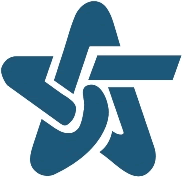 The National Youth Employment Coalition issued an action alert in response to the February 11 U.S. House of Representatives Appropriations Committee release of spending cuts (read the bill) to this year’s continuing resolution (CR). The CR is the mechanism that is currently funding government operations. These cuts would eliminate $3.77 billion dollars spent on workforce- and education-related programs, including completely eliminating the Workforce Investment Act (WIA); YouthBuild, Tech Prep State Grants, and more. WIA forms the backbone of the U.S. workforce development infrastructure, funding local OneStop Career Centers and programs that deliver job placement assistance and opportunities to acquire job skills for youth and adults.
The National Youth Employment Coalition issued an action alert in response to the February 11 U.S. House of Representatives Appropriations Committee release of spending cuts (read the bill) to this year’s continuing resolution (CR). The CR is the mechanism that is currently funding government operations. These cuts would eliminate $3.77 billion dollars spent on workforce- and education-related programs, including completely eliminating the Workforce Investment Act (WIA); YouthBuild, Tech Prep State Grants, and more. WIA forms the backbone of the U.S. workforce development infrastructure, funding local OneStop Career Centers and programs that deliver job placement assistance and opportunities to acquire job skills for youth and adults.
These proposed cuts come during one of America’s most challenging economy in decades, in which many youth and adults are unemployed or underemployed. The nation’s unemployment rate is 9% overall, but youth ages 20 – 24 experience 16.3% unemployment, and youth ages 16 – 19 experience 26.3%.
This bill would also reduce the maximum Pell Grant award by $845 and eliminate all funding ($1.6 billion) for AmeriCorps and other domestic service and service learning opportunities. This table provides more detail on the proposed cuts and program eliminations.
Learn more about contacting your representative.
Join IEL for our live webinar 02/17: The Federal Budget Outlook for Education
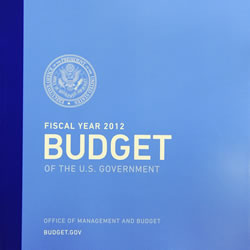 Participate in a live webinar discussionwith Joan Huffer,Director of the Federal Budget Initiative at the Center on Budget and Policy Priorities, to get an in-depth perspective of President Obama’s education funding priorities, see how your state might fare under the President's budget request, and learn how the education funding process is likely to unfold this year in Congress. Martin J. Blank, President of IEL, will facilitate.
Participate in a live webinar discussionwith Joan Huffer,Director of the Federal Budget Initiative at the Center on Budget and Policy Priorities, to get an in-depth perspective of President Obama’s education funding priorities, see how your state might fare under the President's budget request, and learn how the education funding process is likely to unfold this year in Congress. Martin J. Blank, President of IEL, will facilitate.
To help you make the most of this unique opportunity, take a look at the Center on Budget and Policy Priorities' (CBPP) Policy Basics: An Introduction to the Federal Budget Process. Also, check out the Department of Education’s state-level analysis of the President’s FY 2012 budget request.
Online registration is required for this free webinar. Space is limited so register by February 16th to reserve your spot.
A recording of the presentation and audio will posted to the webinar archives after the event.
IEL Organizes Youth to Attend National Summit
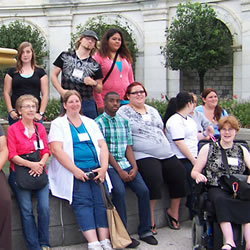 IEL’s Center for Workforce Development and Center for Leadership and Policy have organized a diverse group of 35 youth, including youth with disabilities and those at-risk of dropping out of high school, to attend the U. S. Department of Education’s Voices in Action: National Youth Summit to be held Saturday, February 26, 2011 in Washington, DC.
IEL’s Center for Workforce Development and Center for Leadership and Policy have organized a diverse group of 35 youth, including youth with disabilities and those at-risk of dropping out of high school, to attend the U. S. Department of Education’s Voices in Action: National Youth Summit to be held Saturday, February 26, 2011 in Washington, DC.
The National Youth Summit aims to galvanize youth to shape strategies and provide pathways for all students to be on track to achieve high school and postsecondary credentials. During the summit, young people will communicate their views and ideas directly to senior administration officials about how to improve school climate, ensure all youth graduate from high school, and increase college completion rates to reach President Obama’s 2020 goal.
The group of youth participants organized by IEL includes young people participating in IEL’s Ready to Achieve Mentoring Program (RAMP), funded by the U.S. Department of Justice, in the following communities: Chemung County (Elmira), NY; Baltimore, MD; Lansing, MI; Albany, NY; and the Florida Crown (Gilchrist, Dixie, Union, and Columbia Counties). The group also includes young people involved with IEL’s Leadership for Community Change Capstone Project, funded by the Kellogg Foundation, from Hawaii, California, South Texas, Minneapolis, MN, and Denver, CO.
IEL plans to convene the youth participants on Friday, February 25th prior to the Summit to share what they are doing and learning in their communities and to prepare for their participation in the Summit.
IEL encourages young people who are not able to attend the Summit in person to participate and make their voices heard through the following activities:
- Organize a watch party of the live Summit webcast.
- Share your questions for Secretary of Education Arne Duncan and vote for the questions you most want him to answer.
Learn more about the National Youth Summit.
Join IEL and AERA for the next Education Policy Forum Luncheon: “Challenges and Opportunities in the New Era of Data” on Feb. 18th
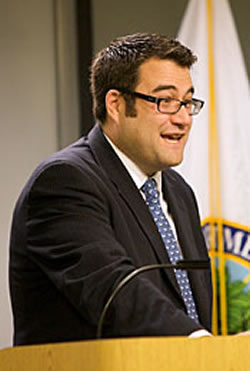 The next AERA/IEL Education Policy Forum Luncheon on the topic of “Challenges and Opportunities in the New Era of Data” will be held on Friday, February 18, 2011 from noon until 2:00 pm at the American Federation of Teachers. Thirteen dollars for the subsidized lunch will be collected at the door. Required reservations may be sent by email (programasst@aera.net) to Christy Talbot at AERA. Limited available seating is assigned according to the order in which reservations are received.
The next AERA/IEL Education Policy Forum Luncheon on the topic of “Challenges and Opportunities in the New Era of Data” will be held on Friday, February 18, 2011 from noon until 2:00 pm at the American Federation of Teachers. Thirteen dollars for the subsidized lunch will be collected at the door. Required reservations may be sent by email (programasst@aera.net) to Christy Talbot at AERA. Limited available seating is assigned according to the order in which reservations are received.
Event Details:
February 18, 2011, 12:00 pm - 2:00 pm
The American Federation of Teachers
555 New Jersey Ave., NW, 9th Floor Conference Room
Washington, DC 20001
(near Union Station metro stop)
Education data is ubiquitous. But unless systematically and carefully collected in some reasoned manner, synthesized, analyzed, and disseminated, it contributes absolutely nothing to our ability to form sound education policy. The Department of Education has, arguably, been engaged in gathering and interpreting data since 1867 in order to improve our prospects as a nation through education. Since 1965, this task has been assigned to the National Center for Education Statistics under the leadership of the U.S. Commissioner of Education Statistics.
The longitudinal data bases designed and implemented by NCES (e.g., the Condition of Education, High School and Beyond, and the Early Childhood Longitudinal Study) are well know to education researchers and policy makers. The current climate presents new opportunities and challenges, of course, through the development of statewide longitudinal data systems and through the heightened expectations for data based decision making in all areas of education.
Our forum will provide an opportunity to meet the new Commissioner, and to gain his perspective on the “challenges and opportunities in the new era of data.”
Jack Buckley was confirmed as U.S. Commissioner of Education Statistics in December 2010. Buckley has been an associate professor of applied statistics at New York University. He served as Deputy Commissioner of NCES from 2006 to 2008. He is known for his research on school choice, particularly charter schools, and on statistical methods for public policy. His term runs through June 21, 2015.
Community Schools Briefing: Integrating Community Resources to Increase Opportunities for Youth
 Please join colleagues at the U.S. Department of Education for an Education Policy Briefing and Discussion: Community Schools: Integrating Community Resources to Increase Opportunities for Youth in the Lyndon Baines Johnson Department of Education Building, Barnard Auditorium, 400 Maryland Avenue, SW, Washington, D.C. Click here for Dept. of Education Invitation.
Please join colleagues at the U.S. Department of Education for an Education Policy Briefing and Discussion: Community Schools: Integrating Community Resources to Increase Opportunities for Youth in the Lyndon Baines Johnson Department of Education Building, Barnard Auditorium, 400 Maryland Avenue, SW, Washington, D.C. Click here for Dept. of Education Invitation.
Panelists will discuss the vision and strategy of community schools, how successful community schools are improving outcomes for children, families, and communities on the ground, and how the principles of community schools can be embedded in the Elementary and Secondary Education Act.
Panelists include:
- Vince Bertram, Superintendent, and Cathlin Gray, Associate Superintendent of Family, Schools and Community Partnerships
- Darlene Kamine, Executive Director, Community Learning Centers Institute, and Julie Sellers, President, Cincinnati Federation of Teachers
- Lolenzo Poe, Director, Multnomah County Department of School and Community Partnerships and Karl Logan, Principal, Lane Middle School, Portland, Oregon
To RSVP, please contact Sarah Zevin at sarah.zevin@ed.gov or 202-260-8363 by Monday, Feb. 14, COB. You must bring a photo ID in order to enter the Department as an expected guest for the briefing.
IEL Co-Sponsors Feb. 15 Event - Powerful Relationships in Schools: The Heartbeat of Reform
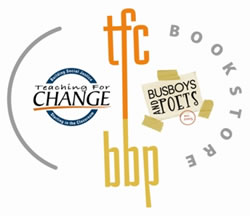 Lynda Tredway (co-author of Leading from the Inside Out) and Joey Feldman (author of Teaching Without Bells: What We Can Learn from Powerful Practice in Small Schools) will lead an interactive “world café” style exploration of teacher leadership and equity. Both books are part of the Teacher’s Toolkit edited by Brad Olsen. Book signing to follow.
Lynda Tredway (co-author of Leading from the Inside Out) and Joey Feldman (author of Teaching Without Bells: What We Can Learn from Powerful Practice in Small Schools) will lead an interactive “world café” style exploration of teacher leadership and equity. Both books are part of the Teacher’s Toolkit edited by Brad Olsen. Book signing to follow.
Time: 6:15pm meet and greet the authors, and the event starts promptly at 6:30pm.
Location: Busboys and Poets, 14th & V, NW, Washington, DC.
Co-sponsored by Teaching for Change. Download and share the event flyer.
IEL’s Coalition for Community Schools Releases Report on Financing Community Schools
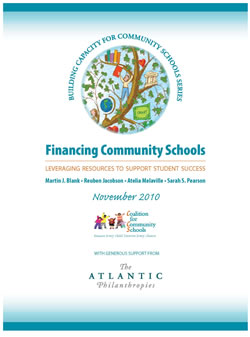 In a new Coalition for Community Schools report, Financing Community Schools: Leveraging Resources to Support Student Success, the Coalition finds that community schools have organized themselves to address constant financial challenges by breaking down funding silos and leveraging resources to support students. The report clearly shows that community schools efficiently leverage dollars to support student learning.
In a new Coalition for Community Schools report, Financing Community Schools: Leveraging Resources to Support Student Success, the Coalition finds that community schools have organized themselves to address constant financial challenges by breaking down funding silos and leveraging resources to support students. The report clearly shows that community schools efficiently leverage dollars to support student learning.
The report highlights five findings:
- Community schools use the bulk of their resources to directly assist schools in meeting their core instructional mission, while also strengthening the health and well-being of students, families and neighborhoods.
- Community schools leverage $3 for every dollar invested by school districts.
- Collaborative leadership structures support finance and other key functions at the school and system level.
- A mix of public and private sector partners expands financial, as well as technical and political capacity.
- Full-time site coordination contributes essential site level capacity at minimal cost.
See the full report or executive summary for more details on the findings, lessons for practitioners, and recommendations for policymakers.
Congress Recognizes January 23rd as Ed Roberts Day in honor of Disability Rights Leader
 On December 15, 2010, the U. S. House of Representatives passed House Resolution 1759, sponsored by Rep. George Miller (D-Martinez), to establish January 23rd as national “Ed Roberts Day” in recognition of the contributions of the late Berkeley disabled rights pioneer.
On December 15, 2010, the U. S. House of Representatives passed House Resolution 1759, sponsored by Rep. George Miller (D-Martinez), to establish January 23rd as national “Ed Roberts Day” in recognition of the contributions of the late Berkeley disabled rights pioneer.
Known as the father of the Independent Living Movement, Ed Roberts made history in 1962 when he fought for the right to attend college at the University of California, Berkeley when his admission was rejected due to his disability. Roberts went on to become a key figure in disability history by establishing the first Center for Independent Living (CIL).
Learning about Roberts and other leaders within the disability rights movement is an important youth development and leadership development experience for all youth, including youth with disabilities. Exposure to disability history gives young people awareness of where individuals with disabilities have been and a context for developing and feeling a sense of pride in themselves.
The National Collaborative on Workforce and Disability for Youth (NCWD/Youth) has supported organizations and grass-roots groups that strive to incorporate disability history into learning environments, including the Disability History Network. The Disability History Network consists of 15 states and academic professionals with disabilities that work to integrate Disability History and Awareness into K-12 public education. Since NCWD/Y’s inception, eight states have passed laws that require schools to teach disability history and awareness during the month of October, which also commemorates Disability Employment Awareness Month. More than 15 other states have either passed a resolution or are developing similar legislation.
Additionally, NCWD/Y supports the It’s Our Story project, a video oral history initiative that uncovers the pride, power, and struggles of more than 1,000 individuals with disabilities, including some of the most prominent figures in the disability rights movement.
The establishment of “Ed Roberts Day” serves as another victory for the disability rights movement, alongside achievements such as the 20th Anniversary of the American with Disabilities Act (ADA) and the 35th Anniversary of the Individuals with Disabilities Education Act (IDEA).
To learn more about Ed Roberts, House Resolution 1759, the Ed Roberts Campus, and Disability History, read and listen to the following:
- “Miller’s legislation recognizing disability advocate Ed Roberts passes House” – Press Release at: http://georgemiller.house.gov/2010/12/millers-legislation-recognizing-disability-advocate-ed-roberts-passes-house.shtml
- House Resolution 1759 - http://georgemiller.house.gov/media/EDRobertsFinal_xml.pdf
- “House Passes Ed Roberts Day” – NPR news report from December 16, 2010 at: http://www.kqed.org/a/kqednews/RN201012160604
- “Berkeley's Ed Roberts Campus has access for all” – Article from the San Francisco Chronicle, December 13, 2010 at:http://www.sfgate.com/cgi-bin/article.cgi?f=/c/a/2010/12/12/BA6N1GOEPT.DTL#ixzz18OHSrHha
- Ed Roberts Campus – Website at: http://edrobertscampus.org/
- Information on Disability History from the National Consortium on Leadership and Disability for Youth (NCLD/Youth) – Website at:www.ncld-youth.info
NCWD/Youth's Latest Guidance on Graduation Requirements Featured in National PTA Magazine
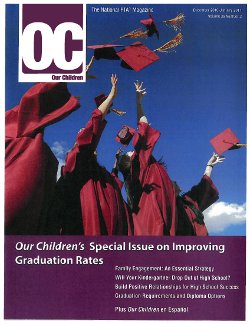 NCWD/Youth's latest article, "Graduation Requirements and Diploma Options: What Families Need to Know" is featured in the December 2010/January 2011 issue of Our Children, the National PTA Magazine. The article provides guidance for parents and families on helping students understand graduation requirements and diploma options. Families play a critical role in helping their children understand the options, define college and career goals, and choose a pathway to earning a diploma. For parents of students with disabilities, it is especially important to understand the differences between the standard diploma and any alternatives offered by the school. Read the article in English or Spanish at: http://www.ncwd-youth.info/GradReqPTA.
NCWD/Youth's latest article, "Graduation Requirements and Diploma Options: What Families Need to Know" is featured in the December 2010/January 2011 issue of Our Children, the National PTA Magazine. The article provides guidance for parents and families on helping students understand graduation requirements and diploma options. Families play a critical role in helping their children understand the options, define college and career goals, and choose a pathway to earning a diploma. For parents of students with disabilities, it is especially important to understand the differences between the standard diploma and any alternatives offered by the school. Read the article in English or Spanish at: http://www.ncwd-youth.info/GradReqPTA.
IEL, NCWD/Youth and RAMP Sites Celebrate National Mentoring Month during January
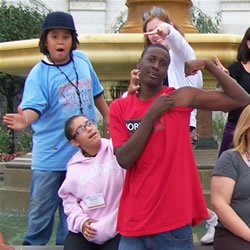 IEL and NCWD/Youth are celebrating National Mentoring Month throughout January by highlighting the Ready to Achieve Mentoring Program (RAMP) sites and ways the youth participants are honoring their mentors this month. Mentoring is one of the most important strategies for assisting youth in making a positive transition into adulthood. Organizations serving transition age youth, including youth with disabilities and other disconnected youth, should foster mentoring relationships between youth and caring adults as well as between peers as a way to help youth develop social networks, interpersonal skills, and supportive relationships.
IEL and NCWD/Youth are celebrating National Mentoring Month throughout January by highlighting the Ready to Achieve Mentoring Program (RAMP) sites and ways the youth participants are honoring their mentors this month. Mentoring is one of the most important strategies for assisting youth in making a positive transition into adulthood. Organizations serving transition age youth, including youth with disabilities and other disconnected youth, should foster mentoring relationships between youth and caring adults as well as between peers as a way to help youth develop social networks, interpersonal skills, and supportive relationships.
In his December 21, 2010 proclamation, President Obama underlined the important role mentors play in young people’s lives: “Across our Nation, mentors steer our youth through challenging times and support their journey into adulthood. During National Mentoring Month, we honor these important individuals who unlock the potential and nurture the talent of our country, and we encourage more Americans to reach out and mentor young people in their community.”
Led by IEL, RAMP is a high tech, career-focused mentoring program for youth with disabilities involved with or at-risk of becoming involved with the juvenile justice system. Through funding from the Department of Justice’s Office of Juvenile Justice and Delinquency Prevention (OJJDP), RAMP is currently being operated at 12 sites across the country by state and local organizations with expertise in mentoring, youth development, and/or disability. The RAMP model utilizes a combination of group, peer, and one-on-one mentoring to promote the successful transition of RAMP youth to employment, continued learning opportunities, and independent living.
National Mentoring Month is the perfect time for individuals to get involved in mentoring a young person and for young people as well as adults to thank their mentors. Youth and staff at the RAMP sites are celebrating the occasion by holding special events with the mentors, families and community partners and sending thank you cards and videos created by the youth to the mentors. Youth and mentors from several sites are also participating in MLK Day service projects together.
In Albany, NY, RAMP youth and mentors from Families Together YOUTH POWER shared their mentoring experiences and discussed the value of mentoring with other community members at a special event at an area shopping mall. To show their appreciation, the youth are also planning to cook dinner for their mentors this month. In Lansing, MI, the Peckham RAMP site is holding a luncheon for the mentors and participating in a service project. RAMP mentors at the Louisiana State University Human Development Center are participating in a citywide mentor training event.
For more information about the RAMP model and the 12 sites, visit the program website at: http://ramp.iel.org.
The following resources on engaging youth with disabilities in mentoring are available from the National Collaborative on Workforce and Disability for Youth (NCWD/Youth) with support from the U. S. Department of Labor Office of Disability Employment Policy:
- Paving the Way to Work: A Guide to Career-Focused Mentoring: Despite all of the information available on mentoring generally, few resources provide guidance on mentoring youth with disabilities or about career-focused mentoring of older youth. This Guide was developed by the National Collaborative on Workforce and Disability for Youth (NCWD/Youth) specifically to address the needs of youth with disabilities during their transition from school to work.
- Plotting the Course for Success: An Individualized Mentoring Plan for Youth with Disabilities: This tool guides mentors and mentees through a number of activities to help them think about a young person’s developmental needs and goals, and what sorts of activities, experiences, and connections can help them achieve them. It also enables the mentor to express how he or she would like to see himself or herself grow in the relationship.
More information about National Mentoring Month is available from the Corporation for National and Community Service (CNCS) at: http://www.serve.gov/mentor.asp.
IEL’s President Honors John Dornan of the NC Public School Forum
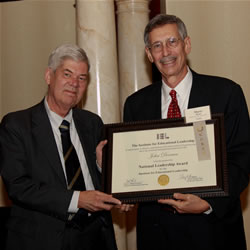 On October 26, 2010, Marty Blank, president for the Institute for Educational Leadership (IEL) awarded the North Carolina Public School Forum’s executive director, John Dornan with IEL’s National Leadership Award.
On October 26, 2010, Marty Blank, president for the Institute for Educational Leadership (IEL) awarded the North Carolina Public School Forum’s executive director, John Dornan with IEL’s National Leadership Award.
Blank traveled to the Public School Forum’s Annual Education Policy Fellowship Program (EPFP TM) graduation in Raleigh, NC to present the award. He thanked Dornan for his commitment to North Carolina EPFP and for his service to the pursuit of excellence in public education.
NCATE Blue Ribbon Panel Releases Report on Transforming Teacher Education Through Clinical Practice
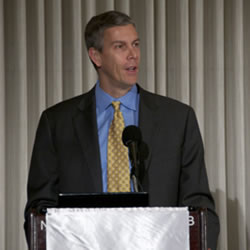 On Nov. 16, 2010, a national Blue Ribbon expert panel convened and supported by NCATE called for teacher education to be "turned upside down" by revamping programs to prioritize clinical practice and partnerships with school districts. The changes will pave the way for more effective training that better addresses student needs and shifts accountability closer to the classroom.
On Nov. 16, 2010, a national Blue Ribbon expert panel convened and supported by NCATE called for teacher education to be "turned upside down" by revamping programs to prioritize clinical practice and partnerships with school districts. The changes will pave the way for more effective training that better addresses student needs and shifts accountability closer to the classroom.
The panel, comprising national education leaders, policymakers, education school deans, and vocal critics of teacher preparation – and which included IEL President, Marty Blank – set out a new direction for how we deliver, monitor, evaluate, oversee, and staff clinically based preparation to incubate a whole new form of teacher education. Its report, Transforming Teacher Education through Clinical Practice: A National Strategy to Prepare Effective Teachers, offers recommendations focused on strengthening candidate selection and placement; revamping curricula, incentives, and staffing; strengthening partnerships; and expanding the knowledge base.
The report received the support of Secretary Duncan, as well as a number of national education groups. Eight states – California, Colorado, Louisiana, Maryland, New York, Ohio, Oregon, and Tennessee – have already agreed to implement the panel's recommendations. Read more…
Join IEL and AERA for the next Education Policy Forum Luncheon: " Accomplished Teachers: Institutional Perspectives” on Dec. 10th
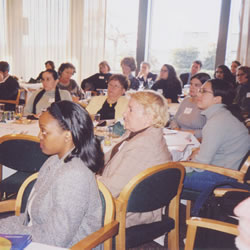 The next AERA/IEL Education Policy Forum Luncheon on the topic of “Accomplished Teachers: Institutional Perspectives” will be held on Friday, December 10, 2010 from noon until 2:00 pm at the American Federation of Teachers. Thirteen dollars for the subsidized lunch will be collected at the door. Required reservations may be sent by email (programasst@aera.net) to Christy Talbot at AERA. Limited available seating is assigned according to the order in which reservations are received.
The next AERA/IEL Education Policy Forum Luncheon on the topic of “Accomplished Teachers: Institutional Perspectives” will be held on Friday, December 10, 2010 from noon until 2:00 pm at the American Federation of Teachers. Thirteen dollars for the subsidized lunch will be collected at the door. Required reservations may be sent by email (programasst@aera.net) to Christy Talbot at AERA. Limited available seating is assigned according to the order in which reservations are received.
Event Details:
December 10, 2010, 12:00 pm - 2:00 pm
The American Federation of Teachers
555 New Jersey Ave., NW, 9th Floor Conference Room
Washington, DC 20001
(near Union Station metro stop)
Since 1987 the National Board for Professional Teaching Standards (NBPTS) has certified over 82,000 educators in 25 discipline areas and National Board Certification for principals has been announced and is currently in the pilot stage. Research provides that National Board certification enhances teacher performance on many measures, including student achievement.
A recent National Research Council report states that the National Board has produced a viable program for assessing teachers and certifying those who meet high standards. The report goes on to recommend that NBPTS continue to invest in its larger mission of influencing the teaching field in broad, comprehensive ways. To this end, NBPTS works closely with schools, school districts, colleges and universities as well as policymakers on a number of key issues, e.g., professional development and compensation.
Our forum will explore the education reforms associated with National Board Certification. Sabrina Hope-King, Chief Academic Officer, New York City Department of Education will present and Mary E. Dilworth, Vice President, Higher Education and Research Initiatives at NBPTS will moderate.
EPFP: 2010 Post-Election Update webinar recording now available
 IEL held its first webinar in the Window to Washington series: 2010 Post-Election Update for participants of the Education Policy Fellowship Program (EPFP) on Thursday, November 18, 2010. Jamie Ekatomatis, National Program Manager of EPFP, facilitated the conversation between Joel Packer, Executive Director of the Committee for Education Funding and Michael Usdan, past President and Senior Fellow of IEL, about what the midterm election results could mean for the reauthorization of the Elementary and Secondary Education Act, the future of the common standards movement, and other key education issues likely to come before the next Congress.
IEL held its first webinar in the Window to Washington series: 2010 Post-Election Update for participants of the Education Policy Fellowship Program (EPFP) on Thursday, November 18, 2010. Jamie Ekatomatis, National Program Manager of EPFP, facilitated the conversation between Joel Packer, Executive Director of the Committee for Education Funding and Michael Usdan, past President and Senior Fellow of IEL, about what the midterm election results could mean for the reauthorization of the Elementary and Secondary Education Act, the future of the common standards movement, and other key education issues likely to come before the next Congress.
IEL Congratulates the 2010 Full Service Community Schools Grantees, Including Two CCS Urban Network Communities
The federal Full Service Community Schools Program grantees for 2010 have been announced. There are eleven awards granted to communities from the following states: Arizona, Delaware, California, Indiana, Massachusetts, New Jersey, South Carolina and Texas. The Coalition for Community Schools would like to congratulate all of the winning communities!
The Full-Service Community Schools (FSCS) program, which is funded under the Fund for the Improvement of Education (FIE), encourages coordination of academic, social, and health services through partnerships among(1) public elementary and secondary schools; (2) the schools’ local educational agencies (LEAs); and (3) community-based organizations, nonprofit organizations, and other public or private entities. Congress appropriated 10 million dollars for this program, which is doubled from the previous appropriation. Each community will receive an average grant award between $483,560-$500,000 (U.S. Department of Education).
Two of the winning communities, the Evansville Vanderburgh School Corporation and Boston Public Schools, are part of the Coalition's Urban Network of Community Schools! See below for a list of all of this year's winners:
- Flowing Wells Full-Service Community Schools Program (Arizona)
- San Fernando Valley Full Service Community Schools Program (California)
- Locke Full-Service Community School Collaborative (California)
- Eastside Community Schools Initiative (ECS) (Delaware)
- Evansville Vanderburgh Full Service Community Schools (Indiana)
- The Martindale Brightwood Alliance for Educational Success (Indiana)
- Boston Public School’s Full Service Community School Grant (Massachusetts)
- South Lawrence East Full Service Community School Program (Massachusetts)
- Paterson Public Schools: A Renewed Commitment to Excellence through Full Service Community Schools (New Jersey)
- Family Circle: From Cradle to College (South Carolina)
- Community DREAM-Link (Delivering Resources for an Enrichment and Academic Mission) (Texas)
Find more information on the federal full service community schools program and read more about each of the winning communities and their abstracts.
21 Promise Neighborhood Award Winners Announced
 On September 21st, the U.S. Department of Education announced its 21 Promise Neighborhoods planning grant awardees.
On September 21st, the U.S. Department of Education announced its 21 Promise Neighborhoods planning grant awardees.
The Promise Neighborhood planning grants will help communities coordinate a web of services to improve the educational and health outcomes of children and youth. Services range from early learning to college and career, health care, safety, as well as, boosting family engagement in student learning. At the center of every Promise Neighborhood is a community school. Read more…
Policy Brief: CSBA and Community Schools
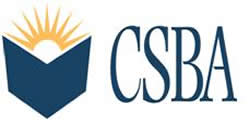 The California Schools Boards Association’s (CSBA) October 2010 policy brief focuses on the role school boards can have in implementing a community schools strategy, and it also reinforces the ways in which community schools maximize benefits and address multiple factors that influence students’ academic achievements.
The California Schools Boards Association’s (CSBA) October 2010 policy brief focuses on the role school boards can have in implementing a community schools strategy, and it also reinforces the ways in which community schools maximize benefits and address multiple factors that influence students’ academic achievements.
The CSBA finds community schools to be of great importance because they meet the needs of students and work towards closing the achievement gap. The article states that “the creation of “community schools” is a growing trend that is designed to support student achievement through service-based interventions, expanded learning time models and increased community engagement. When implemented together, the brief asserts that community school interventions maximize benefits and allow schools to address multiple factors in students’ lives.
Ed Honowitz, a school board Member from Pasadena Unified School District notes that, “school boards can play a pivotal leadership role in ensuring that schools are effective community centers that provide a hub for a wide range of coordinated services to help families and empower parents and their students. Truly effective community schools are... a strategic effort to link the academic program of the school with a set of support services driven by assessing the needs of school families.”
The school board’s role in implementing the community school strategy includes setting direction, establishing structure, providing support, ensuring accountability, and acting as community leaders. Read More….
Join IEL in Celebrating October as National Disability Employment Awareness Month
 Congress has designated October as National Disability Employment Awareness Month (NDEAM). This effort to educate the American public about issues related to disability and employment actually began in 1945, when Congress enacted a law declaring the first week in October each year "National Employ the Physically Handicapped Week."
Congress has designated October as National Disability Employment Awareness Month (NDEAM). This effort to educate the American public about issues related to disability and employment actually began in 1945, when Congress enacted a law declaring the first week in October each year "National Employ the Physically Handicapped Week."
In 1962, the word "physically" was removed to acknowledge the employment needs and contributions of individuals with all types of disabilities. In 1988, Congress expanded the week to a month and changed the name to "National Disability Employment Awareness Month."
This year’s NDEAM theme from the U.S. Department of Labor’s Office of Disability Policy is “Talent Has No Boundaries: Workforce Diversity Includes People with Disabilities.”
Read the White House press release.
Read the message from Assistant Secretary of Labor Kathy Martinez.
AERA/IEL Education Policy Forum: "Promise Neighborhoods: Rethinking the Approach to Supporting Students from Cradle to Career"
 On October 8, the Institute for Educational Leadership and the American Education Research Association co-hosted an Education Policy Forum on Promise Neighborhoods. The Promise Neighborhoods Initiative has received major national attention as the federal government seeks to encourage other communities to adapt the work of the Harlem Children's Zone. More than 300 local leaders submitted applications for federal planning grants and 21 communities have now been funded. During the Forum, presenters offered a thorough understanding of the Promise Neighborhoods theory and strategy from the Department of Education perspective as well an examination of the challenges of adapting and scaling up such an approach in other communities.
On October 8, the Institute for Educational Leadership and the American Education Research Association co-hosted an Education Policy Forum on Promise Neighborhoods. The Promise Neighborhoods Initiative has received major national attention as the federal government seeks to encourage other communities to adapt the work of the Harlem Children's Zone. More than 300 local leaders submitted applications for federal planning grants and 21 communities have now been funded. During the Forum, presenters offered a thorough understanding of the Promise Neighborhoods theory and strategy from the Department of Education perspective as well an examination of the challenges of adapting and scaling up such an approach in other communities.
Presenters:
- Larkin Tackett, Deputy Director, Promise Neighborhoods Program, Office of Innovation and Improvement, U.S. Department of Education
- Lisbeth Schorr, Senior Fellow, Center for the Study of Social Policy and Lecturer in Social Medicine, Harvard University
Teacher Incentive Pay Study Reveals No Effect on Student Achievement
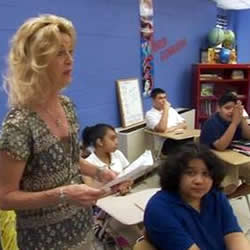 EdWeek reported last week on the release of a new study out of Vanderbilt University that reveals little evidence in support of a Nashville teacher incentive pay program's ability to boost student achievement (as measured by standardized test scores). The PBS NewsHour also did a piece last week that describes the Nashville experiment. Though this is but one of many studies on teacher incentive pay plans, it is one of the most rigorous to-date.
EdWeek reported last week on the release of a new study out of Vanderbilt University that reveals little evidence in support of a Nashville teacher incentive pay program's ability to boost student achievement (as measured by standardized test scores). The PBS NewsHour also did a piece last week that describes the Nashville experiment. Though this is but one of many studies on teacher incentive pay plans, it is one of the most rigorous to-date.
Supporters of incentive pay plans were quick to mention in the EdWeek article that the "real" lever of change offered by these plans -- recruitment and retention of effective teachers -- wasn't covered by the three-year study. The article also noted that supplements to cash bonuses employed by other cities' teacher incentive plans, like professional development and differentiated roles for effective teachers, were not a part of this experiment.
As the NewsHour segment points out, teacher incentive pay plans feature prominently in the Obama Administration's Race to the Top competition, with 11 of the 12 awardees having signed on to institute plans in their states. An un-named Education Department spokewoman quoted in the EdWeek article claims that the Vanderbilt study is too narrow to deter the hope that incentive pay plans will help to "change the culture of teaching by giving all educators the feedback they need to get better while rewarding and incentivizing the best to teach in high need schools and hard-to-staff subjects.”
View the NewsHour segment now.
Leadership Learning Community Report Looks to Develop Leaders for Racial Justice
 A new report from the Leadership Learning Community examines the characteristics of leadership development programs that can either help solve racial inequalities or help exacerbate them. According to the report's authors, leadership programs with an individualistic focus can ignore the impact of structural racism (i.e. policy, culture, and institutional practices that limit opportunity).
A new report from the Leadership Learning Community examines the characteristics of leadership development programs that can either help solve racial inequalities or help exacerbate them. According to the report's authors, leadership programs with an individualistic focus can ignore the impact of structural racism (i.e. policy, culture, and institutional practices that limit opportunity).
The report recommends a more collective approach to leadership that encourages greater participation by people of color and an understanding of how race limits access to opportunity. Other recommendations include:
- Open Conversation about Race: Provide time and space for participants to talk about race and their racial identity. This gives participants an opportunity to transform their thoughts and feelings about race and how it impacts their work.
- Training: Incorporate elements of racial justice training, i.e. an analysis of structural racism. This is different from diversity training, which focuses on interpersonal relations and cultural awareness.
- Tracking: Monitor changes in whether or not people of color have increased access to leadership in communities and organizations, and more of an impact on policy making. Track the changes over the long term.
- Funding: Provide adequate funding to leadership programs that promote racial justice. Programs should also help participants understand how to access resources.
Join IEL President Marty Blank September 22 at Center for American Progress Event on Community Schools
 IEL President and Director of the Coalition for Community Schools, Marty Blank, will be a featured speaker at the September 22nd Center for American Progress Event: Innovative Strategies for Community Schools. This luncheon event will take place from noon to 2:00 p.m. and admission is free. Space is extremely limited. RSVP required. Seating is on a first-come, first-served basis and not guaranteed.
IEL President and Director of the Coalition for Community Schools, Marty Blank, will be a featured speaker at the September 22nd Center for American Progress Event: Innovative Strategies for Community Schools. This luncheon event will take place from noon to 2:00 p.m. and admission is free. Space is extremely limited. RSVP required. Seating is on a first-come, first-served basis and not guaranteed.
Event Details:
September 22, 2010, 12:30 p.m. – 2:00 p.m.
Lunch will be served at 12:00 p.m.
Center for American Progress
1333 H St. NW, 10th Floor
Washington, DC 20005
Map & Directions
Opening Remarks:
Cynthia G. Brown, Vice President for Education Policy, Center for American Progress
Featured Speakers:
- Martin Blank, Director of the Coalition for Community Schools and President of the Institute for Educational Leadership
- Doris Terry Williams, Executive Director of the Rural School and Community Trust and Director of the Trust's Capacity Building Program
- Adeline Ray, Director, Chicago Community Schools Initiative
Moderated by:
Saba Bireda, Education Policy Analyst, Center for American Progress
Nationwide, educators and policymakers are increasingly looking to community schools to provide students with important in-school supports. The Obama Administration has shown support by encouraging schools and districts to implement wraparound services as part of reform strategies.
Community schools exist in districts across the country and utilize a variety of partnerships and services. Yet many consider community schools to be a strategy that only works in urban areas. In fact, rural community schools exist and can advantage rural students in many significant ways. Likewise, while most community schools keep the building open longer than traditional schools, few community schools have formally extended the length of the school day for all students.
Join us for a discussion on two new ways to develop and grow community schools—as a rural education strategy and through the use of expanded learning time. The Center for American Progress will release two new papers on these topics. The papers and event will encourage policymakers and advocates to consider ways that the community school strategy can be applied in settings not traditionally associated with the model.
Nearest Metro: Blue/Orange Line to McPherson Square or Red Line to Metro Center
For more information, call 202-682-1611.
IEL and its Partners Receive $3 million Kellogg Grant for Community-based Leadership Program
 IEL and the Center for Ethical Leadership have been awarded a $3 million, four-year grant by the W.K. Kellogg Foundation to support the Community Learning Exchange (CLE) program. The CLE is a growing national network of local communities, organizations and change agents who practice and promote the use of place-based, collective leadership to build local capacity of vulnerable communities to address issues and improve lives.
IEL and the Center for Ethical Leadership have been awarded a $3 million, four-year grant by the W.K. Kellogg Foundation to support the Community Learning Exchange (CLE) program. The CLE is a growing national network of local communities, organizations and change agents who practice and promote the use of place-based, collective leadership to build local capacity of vulnerable communities to address issues and improve lives.
The CLE is an outgrowth of the Kellogg Leadership for Community Change (KLCC) project. Under the place-based collective leadership model, community challenges are addressed, not by individual leaders, but by groups of local residents working collectively for sustainable change in 21st Century settings. Non-traditional leaders from diverse backgrounds are included in the collective decision-making processes of their communities. The CLE provides an opportunity for community leadership groups to openly examine their challenges, freely exchange successful approaches, and become familiar with tools that can enhance local change initiatives. Community organizations host learning exchanges that illuminate how local history and context affect approaches to addressing various social change topics such as educational equity, immigration reform, health, poverty, structural racism, etc. CLE participants are encouraged to attend learning exchanges as a team to make follow-up implementation of action plans more doable.
The teams participating in the 3-day learning exchanges are all grappling with similar issues. The topics for each learning exchange emerge from the interests of communities in the network and other groups wanting to become part of the network. Participation is welcomed from new funder initiatives, communities who want to break their isolation, and groups/networks working on specific change initiatives. The most recent learning exchange took place in Washington, DC July 14-17, 2010 on the topic: Youth, Families and Immigration Reform.
Connect to this effort by joining the Community Learning Exchange network…
IEL Director of Leadership Programs Weighs in About Atlanta Board of Education Conflict
 Kwesi Rollins, IEL Director of Leadership Programs, spoke with PBS radio station WABE on August 20, 2010 about the very public conflict between members of the Atlanta Board of Education. Rollins said many boards work with an outside consultant to undergo a board development process to clarify their role and build consensus about priorities. Elected members that are unwilling to focus on the important issues will face the consequences from voters.
Kwesi Rollins, IEL Director of Leadership Programs, spoke with PBS radio station WABE on August 20, 2010 about the very public conflict between members of the Atlanta Board of Education. Rollins said many boards work with an outside consultant to undergo a board development process to clarify their role and build consensus about priorities. Elected members that are unwilling to focus on the important issues will face the consequences from voters.
Listen or read the entire story now.
IEL’s National Collaborative on Workforce and Disability for Youth Enters its 10th Year with Labor Department Support
 The U.S. Department of Labor's Office of Disability Employment Policy recently announced that it will award IEL an additional $999,926 to continue funding the Youth Technical Assistance Center through the National Collaborative on Workforce and Disability for Youth.
The U.S. Department of Labor's Office of Disability Employment Policy recently announced that it will award IEL an additional $999,926 to continue funding the Youth Technical Assistance Center through the National Collaborative on Workforce and Disability for Youth.
NCWD/Youth, now in its 10th year, focuses its technical assistance efforts on state and local workforce development systems and assists them in better serving youth with disabilities. NCWD/Youth and its partners, including experts in disability, education, employment, and workforce development, strive to ensure that policy makers, youth service professionals, educators, families and youth receive cutting edge information on the connection between education, employment and independent living.
Find out more about the work of the NCWD Youth National Technical Assistance Center.
Nine States and the District of Columbia Win Second Round Race to the Top Grants
 From the Department of Education, August 24, 2010:
From the Department of Education, August 24, 2010:
U.S. Secretary of Education Arne Duncan announced today that 10 applicants have won grants in the second phase of the Race to the Top competition. Along with Phase 1 winners Delaware and Tennessee, 11 states and the District of Columbia have now been awarded money in the Obama Administration's groundbreaking education reform program that will directly impact 13.6 million students, and 980,000 teachers in 25,000 schools.
The 10 winning Phase 2 applications in alphabetical order are: the District of Columbia, Florida, Georgia, Hawaii, Maryland, Massachusetts, New York, North Carolina, Ohio, and Rhode Island. Read more…
IEL’s NCWD/Youth Guide Charts a Course for Professionals Working with Youth with Learning Disabilities
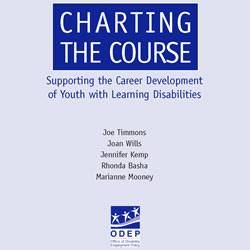 A new guide developed by IEL’s National Collaborative on Workforce and Disability for Youth, Charting the Course, seeks to help youth service professionals better understand issues related to learning disabilities, so that they can help youth with learning disabilities develop individual strategies that will enable them to succeed in the workplace.
A new guide developed by IEL’s National Collaborative on Workforce and Disability for Youth, Charting the Course, seeks to help youth service professionals better understand issues related to learning disabilities, so that they can help youth with learning disabilities develop individual strategies that will enable them to succeed in the workplace.
This Guide focuses on addressing the needs of youth with learning disabilities from a “disability rights” perspective—a model that concentrates less on remediation and more on skill acquisition through accommodated approaches. This includes ensuring appropriate and timely access to assistive technology; learning how to disclose one’s disability effectively; and understanding how to access civil rights protections in educational, vocational, and social settings.
It is intended to help practitioners, administrators, and policymakers in secondary and postsecondary education programs, transition programs, One-Stop Career Centers, youth employment programs, and community rehabilitation programs to improve services and outcomes for youth, ages 14 to 25, with diagnosed and undiagnosed learning disabilities.
Learn more and download the guide.
The Black-White Achievement Gap: How Community Schools can Help
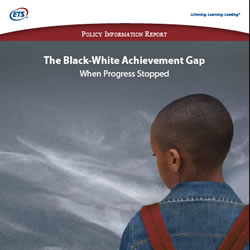 A recent report, “A recent report, "The Black-White Achievement Gap: When Progress Stopped”, from The Educational Testing Service, by Paul E. Barton and Richard J. Coley, explores the persistence of the Black-White achievement gap for students in the United States. The report highlights contributing factors to the fluctuations in the gap and attempts to find reasoning behind the narrowing of it between the 1970’s and the 1980’s. The researchers note the importance of “identifying approaches to uplift whole neighborhoods in terms of their economic and social capital, their school quality, and their recreational and health infrastructures.” Find out how community schools can help close the achievement gap.
A recent report, “A recent report, "The Black-White Achievement Gap: When Progress Stopped”, from The Educational Testing Service, by Paul E. Barton and Richard J. Coley, explores the persistence of the Black-White achievement gap for students in the United States. The report highlights contributing factors to the fluctuations in the gap and attempts to find reasoning behind the narrowing of it between the 1970’s and the 1980’s. The researchers note the importance of “identifying approaches to uplift whole neighborhoods in terms of their economic and social capital, their school quality, and their recreational and health infrastructures.” Find out how community schools can help close the achievement gap.
IEL President Speaks to MO Administrators about School and Community Leadership for Student Success
On August 3, 2010, IEL President Marty Blank provided the final keynote address at for a crowd of over 1,000 at Missouri’s 49th Cooperative Conference for School Administrators on the topic “School and Community Leadership for Student Success.” In his remarks, Blank stressed the importance of building bridges between schools and other institutions and individuals with assets that can support student success.
Use the video player controls to watch the full presentation (39 minutes, 22 seconds).
The Coalition for Community Schools Searches for Common Ground Between Civil Rights Leaders and the Obama Administration
 From the From the Coalition for Community Schools’ Blog…Education is a civil right. However, recently different groups have offered varying perspectives on how to secure this right. Responding to their perceptions that aspects of the President’s education agenda were moving in the wrong direction, several civil rights organizations released a counter proposal suggesting that the President abandon some of his policies (e.g., Race to the Top). The Obama Administration met with civil rights leaders about their concerns and both Secretary Duncan and President Obama publicly pushed back on the framework at the National Urban League’s conference. As the debates over manifestos and policy agendas continue, the Coalition for Community Schools feels it’s important to share the areas where we see common ground.
From the From the Coalition for Community Schools’ Blog…Education is a civil right. However, recently different groups have offered varying perspectives on how to secure this right. Responding to their perceptions that aspects of the President’s education agenda were moving in the wrong direction, several civil rights organizations released a counter proposal suggesting that the President abandon some of his policies (e.g., Race to the Top). The Obama Administration met with civil rights leaders about their concerns and both Secretary Duncan and President Obama publicly pushed back on the framework at the National Urban League’s conference. As the debates over manifestos and policy agendas continue, the Coalition for Community Schools feels it’s important to share the areas where we see common ground.
The civil rights framework cites community schools as strategy to provide opportunities to learn to ALL students. They state, "The best approach to school turnaround is to reinvent low-performing schools as community schools, offering high-quality programs, strong instruction, and wraparound services." (Click here for more.) We agree. Community schools across the nation (e.g., Cincinnati, Tulsa, Kansas City, New York City, Portland (OR), and South King County, WA) are producing positive results for our youth.
While the Administration isn’t always as explicit about their support for community-based strategies, we see areas of agreement between the Obama Administration’s education reform strategy with the aforementioned groups. Read more…
IEL Participates in Celebration of Landmark Disability Rights Legislation - American's With Disabilities Act
 July 26, 2010 marks the 20th anniversary of the enactment of federal disability civil rights legislation known as the Americans with Disabilities Act (ADA), which bars discrimination based on disability in employment, public and private sector services, transportation, and recreation. The ADA also codified disability public policy to promote inclusion, integration, full participation, independent living, and economic self-sufficiency for all youth and adults with disabilities. Over the past two decades, federal laws, programs, and services have been updated and aligned with the ADA.
July 26, 2010 marks the 20th anniversary of the enactment of federal disability civil rights legislation known as the Americans with Disabilities Act (ADA), which bars discrimination based on disability in employment, public and private sector services, transportation, and recreation. The ADA also codified disability public policy to promote inclusion, integration, full participation, independent living, and economic self-sufficiency for all youth and adults with disabilities. Over the past two decades, federal laws, programs, and services have been updated and aligned with the ADA.
To mark the historic nature of the ADA, organizations and government agencies are hosting a multitude of celebrations in Washington, DC and across the country. The Institute for Educational Leadership’s (IEL) Center for Workforce Development (CWD) is helping mark this anniversary by cosponsoring and participating in a number of these celebrations. Learn more...
New Cyber Disclosure Workbook for Youth with Disabilities Available from IEL’s National Collaborative on Workforce and Disability for Youth
 IEL’s new Cyber Disclosure for Youth with Disabilities Workbook is a supplement to The 411 on Disability Disclosure: A Workbook for Youth with Disabilities which helps youth learn about disability disclosure and what it means for them. Since the original workbook was written in 2005, there have been many advances in technology that have changed what youth need to know about disclosing their disability.
IEL’s new Cyber Disclosure for Youth with Disabilities Workbook is a supplement to The 411 on Disability Disclosure: A Workbook for Youth with Disabilities which helps youth learn about disability disclosure and what it means for them. Since the original workbook was written in 2005, there have been many advances in technology that have changed what youth need to know about disclosing their disability.
Search sites like Google, social networking sites like Facebook, and micro-blogging sites like Twitter have added a new element to disclosure. Now it is possible to disclose your disability on the internet without even being aware of it. This can be as simple as a picture of you using a wheelchair, a comment on your friend’s blog about disability, or your profile posted on a disability organization’s website. The goal of this document is to provide suggestions for youth with disabilities about how to make an informed decision about your own disability disclosure and to manage your disclosure online. Learn more…
IEL President Marty Blank Chats with Building Neighborhoods Blogger Patrick Lester about the Similarities between Promise Neighborhoods and Community Schools
 The Administration’s Promise Neighborhoods initiative has a lot in common with the community schools strategy. During a June 19, 2010 interview with Patrick Lester, Policy Director of United Neighborhood Centers of America, Marty Blank highlights the commonalities and connections between Promise Neighborhoods and the community schools strategy:
The Administration’s Promise Neighborhoods initiative has a lot in common with the community schools strategy. During a June 19, 2010 interview with Patrick Lester, Policy Director of United Neighborhood Centers of America, Marty Blank highlights the commonalities and connections between Promise Neighborhoods and the community schools strategy:
Schools are at the center of the Promise Neighborhoods strategy… from a community school perspective every school in a Promise Neighborhood will be a community school. [They] represent a paradigm shift from previous policies that relied solely on accountability to get results. They recognize that community issues are school issues.
According to Blank, who is also the Director of the Coalition for Community Schools, all schools in Promise Neighborhoods should be community schools – regardless of the type of school (traditional public school, charter public school, magnet school, alternative school); regardless of who operates the school (local school district, community-based organization -CBO, higher education institution, educational management organization); and regardless of size or curricular focus. Read more…
IEL Releases Initial Summary of Individualized Learning Plan Study
 States continue to refine graduation requirements to meet the now widely accepted goal that all students be ready for college and the workplace when they graduate from high school. In almost half of the states, one strategy employed is the requirement that all students develop an individualized learning plan (ILP) prior to graduation. ILPs refer to both a document that is created and maintained as well as a process that helps students engage in the career development activities necessary for them to identify their own career goals.
States continue to refine graduation requirements to meet the now widely accepted goal that all students be ready for college and the workplace when they graduate from high school. In almost half of the states, one strategy employed is the requirement that all students develop an individualized learning plan (ILP) prior to graduation. ILPs refer to both a document that is created and maintained as well as a process that helps students engage in the career development activities necessary for them to identify their own career goals.
Individual planning is not a new idea. Since the 1970s, federal requirements for students with disabilities have included an individualized education program (IEP). The U.S. Department of Labor’s Office of Disability Employment Policy (ODEP), charged with the responsibility to find promising practices to improve the employment outcomes for people with disabilities, is supporting a multi-year study to assess whether quality ILPs improve the readiness of all students, including youth with disabilities, for post-school outcomes.
The ODEP study launched in the 2008-09 school year and targeted for completion in 2012-13, is the first longitudinal research and demonstration project designed to understand the effectiveness of ILPs. It looks at ILPs in 14 (rural, urban and suburban) schools in four states (LA, NM, SC, and WA).
The research is built around core features included in the Guideposts for Success, a publication of the National Collaborative on Workforce and Disability/For Youth (NCWD/Youth), housed at IEL. NCWD/Youth and its partners, the Center for Education and Work at the University of Wisconsin, Madison and the Institute for Community Integration at the University of Minnesota are conducting the research project. Learn more…
American Federation of Teachers Passes Resolution Supporting Community Schools
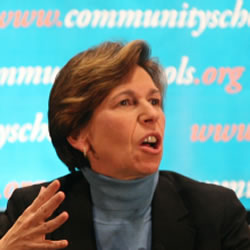 Johnson is a community school that gets the important pieces in place and lined up—great teachers and staff, strong curriculum, fun and engaging activities for summer and after school, and an amazing array of services that remove barriers to success for the kids and their families. These things make a huge, huge difference.
Johnson is a community school that gets the important pieces in place and lined up—great teachers and staff, strong curriculum, fun and engaging activities for summer and after school, and an amazing array of services that remove barriers to success for the kids and their families. These things make a huge, huge difference.
- Randi Weingarten, President of American Federation of
Teachers (AFT), praising a Minnesota community school
at the 2010 AFT national convention in Seattle
At the July, 2010 AFT Convention in Seattle, the AFT passed Resolution #75, recognizing the principles of community schools as one of their main priorities. It calls for community school support which would include legislation, funding, and staff development. The Resolution passed with a unanimous vote.
AFT advocates for five community school principles: a strong academic curriculum; partnerships that integrate services; a variety of providers and funders in those partnerships; multiple types of community service programs; and a written strategic plan. Read more…
U.S. Secretary of Health and Human Services, Kathleen Sebelius, calls for schools to become community havens.
Community Schools featured on Fox 29 News in Philadelphia!
ED's Blueprint for Reform: ESEA Reauthorization
The Administration's Blueprint, based on feedback from their listening tour, provides incentives for states to adopt academic standards that prepare students to succeed in college and the workplace and create accountability systems that measure student growth toward meeting the goal that all children graduate and succeed in college. Read the Blueprint and view President Obama's weekly address focused on the Blueprint.
Goffin Strategy Group (GSG) releases two new publications
Two publications from the Goffin Strategy Group (GSG) document that the field of early care and education (ECE) is at a crossroads, and assert that this defining moment calls for field-wide leadership.
Field-Wide Leadership: Insights from Five Fields of Practice reports on a GSG’s study to determine whether and how other fields of practice exercise leadership related to issues that are of field-wide importance and necessitate a broad swath of the community to resolve. Five fields of practice were explored ― Financial Planning, Nursing, Opportunity Finance, Quality Management, Social Work ― and a new term was coined as a part of the work. Field-wide leadership is internally directed leadership that has as its purpose the advancement of an overall field of practice in terms of coherence and effectiveness. The GSG study found that field-wide leadership is a viable construct and that examples of field-wide leadership are widely available.
Leadership Development in Early Care and Education: A View of the Current Landscape assesses the field of ECE’s progress in attending to leadership development, and identifies how the field defines leadership based a surface review of 87 self-identified ECE leadership development programs. The GSG found that the 87 programs fell into 3 primary categories: teacher preparation; program improvement; and leadership skill development, and that the programs varied greatly in terms of robustness and viability.
IEL served as the fiscal agent for both reports which were funded by the McCormick Foundation. The reports can be downloaded for free at www.goffinstrategygroup.com. As well, additional information about the Goffin Strategy Group can be obtained at www.goffinstrategygroup.com.
IEL Sits on NCATE’s Blue Ribbon Panel for Clinical Preparation, Partnerships and Improved Student Learning
President Blank recently attended NCATE’s work group meeting which included experts in education research, policy, teaching and learning and leaders in higher education and P-12 schools at the state and local level. The panel will make recommendations for restructuring the preparation of teachers to reflect teaching as a practice-based profession akin to medicine, nursing, or clinical psychology.
 Secretary Duncan Participates in DC VOICE Town Hall with IEL Staffers
Secretary Duncan Participates in DC VOICE Town Hall with IEL Staffers
Recently, as part of his Listening & Learning tour, Sec. Duncan paid a visit to Luke C. Moore Academy Senior High School in North East Washington, D.C., Ward 5. He joined more than 100 educators, parents, students, policymakers, and community members in a town hall discussion on improving education. Conversation at each table focused on two major topics: community schools and teacher quality. Read more and view video of this town hall.
IEL in partnership with ACES, Advanced Innovation, LSU, and SCSU will hold conference for Leaders in Education
This National Leadership Conference will be held on January 6-8, 2010 at the Cook Conference Center in Baton Rouge, LA. The conference will engage school leaders and school policymakers, who are working towards sustainable systemic change, in conversations about the leadership skills needed to navigate the politics and policies they encounter at a local, state and national level. Register.
NCWD/Youth Testifies at the U.S. Department of Labor on WIA Reauthorization
Joan Wills from the National Collaborative on Workforce and Disability for Youth (NCWD/Youth) testified before the Assistant Secretaries of the Office of Disability Employment Policy and the Employment and Training Administration at the Department of Labor’s Listening Session on the Workforce Investment Act (WIA). WIA has been up for reauthorization for several years and the listening session was designed to collect input from expert in the disability employment field. Wills laid out 5 broad strategy areas that need to be taken into account when improving the WIA.
Read the news release and testimony.
William “Bill” Turner (EPFP 77-78) receives Lifetime of Service Award from the Appalachian Studies Association
Dr. William “Bill” Turner (EPFP 77-78), the National Endowment for the Humanities (NEH) chair in Appalachian Studies at Berea College, received the Lifetime of Service Award from the Appalachian Studies Association for promoting the experience and histories of African Americans in Appalachia. For more information about Dr. Turner and his work read the Berea College Magazine.
How Can Schools Address Early Chronic Absence?
What is Early Chronic Absence? AERA and IEL invite you to the Education Policy Forum Luncheon on October 9th (12 pm ) to learn more about national and local early chronic absence data (New York City and Grand Rapids, MI). Also, a middle school principal will share strategies that have worked for him in tackling this issue. Download the flyer now!
IEL Receives $3.5 Million for National Mentoring Program
The Institute for Educational Leadership (IEL) announces its selection to receive approximately $3.5 million from the U.S. Department of Justice’s Office of Juvenile Justice and Delinquency Prevention for a 3-year national mentoring program to serve youth with disabilities at-risk of truancy or court-involvement. Through this infusion of resources, research-based strategies, and cross-system collaboration, the RAMP program will match trained mentors to youth with disabilities to reduce court involvement and/or recidivism; increase career preparation and development work-readiness skills for the youth in the program.
Youth Today names IEL's Education Policy Fellowship Program (EPFP) one of The Best Fellowships in Youth Work
Youth Today spotlights IEL's Education Policy Fellowship Program (EPFP), in their article: The Best Fellowships in Youth Work. EPFP led the list of 10 leadership development opportunities identified across the country. This program helps broaden your professional, peer assistance network, and increases your knowledge base about “what works, where” to support the growth and development of all children and youth. Learn more now! ![]()
IEL Partners with PBS’ POV to Promote Important Story About Principal Leadership and Principals Making a Difference
 The Principal Story by Tod Lending and David Mrazek will have its national premiere on September 15 at 10 PM on PBS (check your local listings)
The Principal Story by Tod Lending and David Mrazek will have its national premiere on September 15 at 10 PM on PBS (check your local listings)
The Principal Story tells two stories, painting a dramatic portrait of the challenges facing America's public schools — and of the great difference a dedicated principal can make. Tresa Dunbar is a second-year principal at Chicago's Nash Elementary, where 98% of students come from low-income families; in Springfield, Illinois, Kerry Purcell has led Harvard Park Elementary, with similar demographics, for six years. Tod Lending (Omar & Pete, POV 2005) and David Mrazek followed both women over the course of a school year, discovering each one's unique styles yet similar passions. The Principal Story takes the viewer along for an emotional ride that reveals what effective educational leadership looks like in the 21st century.
To find out more, visit: http://www.pbs.org/pov/principalstory/
IEL President Martin Blank quoted in AP story on St. Louis full-service schools
The St. Louis Public School District has revamped 13 schools to offer new academic, health and social services to students, their families and community members, ranging from onsite health checks for children to job support for the unemployed. For more information read the full article.
IEL Seeks Applicants for The Education Policy Fellowship Program (EPFP™): Deadline August 2009
IEL’s flagship leadership program is EPFP, a 10-month in-service professional development program celebrating its 46th year with the Class of 2009-10. With over 6500 alumni spread across the nation, it is designed to prepare mid-level leaders in public and private organizations to exercise greater responsibility in creating and implementing sound public policy in education and related fields. EPFP™ participants hold full-time positions in diverse organizations at the local, state, and national levels. The program currently operates through sites in Connecticut, Georgia, Massachusetts, Michigan, Minnesota, Mississippi, Missouri, New York, North Carolina, Ohio, Pennsylvania, South Carolina, Virginia, and Washington, DC. For more information on the program and applying, please visit the EPFP™ website or contact the program associate at wilcoxs@iel.org.
Louis Fabrizio (EPFP 79-80) Appointed to National Education Task Force
Dr. Louis Fabrizio (EPFP 79-80), director of Accountability Policy and Communications at the North Carolina Department of Public Instruction (NCDPI), has been appointed to the Council of Chief State School Officers (CCSSO) Elementary and Secondary Education Act (ESEA) Reauthorization Task Force. Fabrizio will join about a dozen federal government liaisons, state education officials and state education agency staff from across the country in a new effort to review, update and provide recommendations to Congress regarding the ESEA, which was reauthorized in 2001 by President Bush as the No Child Left Behind Act.
For more information read the full press release . (Also available as a Word document .)
American Educator Spotlights Community Schools
 Get your copy now of American Educator's most recent issue, Surrounded by Support, spotlighting Community Schools! Community school leaders: Richard Rothstein, Ira Harkavy, Jane Quinn, Joy Dryfoos, Marty Blank, and more, assert that coordinated partnerships between communities and schools is key to offering services to youth, families, and communities.
Get your copy now of American Educator's most recent issue, Surrounded by Support, spotlighting Community Schools! Community school leaders: Richard Rothstein, Ira Harkavy, Jane Quinn, Joy Dryfoos, Marty Blank, and more, assert that coordinated partnerships between communities and schools is key to offering services to youth, families, and communities.
Email this issue to policymakers, school administrators, colleagues, and your networks!
IEL Names Martin Blank President
 The Board of Directors of the Institute for Educational Leadership (IEL) has named Martin Blank (Marty) as its new President. Blank has served as the Director of the Coalition for Community Schools at IEL for the past decade where he has skillfully crafted a vibrant national movement for deeper relationships between schools and communities. That vision is shared by U.S. Secretary of Education Arne Duncan. Marty will continue that focus as part of his leadership of IEL.
The Board of Directors of the Institute for Educational Leadership (IEL) has named Martin Blank (Marty) as its new President. Blank has served as the Director of the Coalition for Community Schools at IEL for the past decade where he has skillfully crafted a vibrant national movement for deeper relationships between schools and communities. That vision is shared by U.S. Secretary of Education Arne Duncan. Marty will continue that focus as part of his leadership of IEL.
For more information read the full press release.
Rebecca Cokley with President Obama
 In honor of Women’s History Month and the key role women play in our economy, IEL Project Coordinator, Rebecca Cokley received a special invitation to the White House Wednesday, March 11th where President Obama signed an Executive Order to create the White House Council on Women and Girls. EPFP Fellow and Secretary of Labor Hilda Solis was also in attendance.
In honor of Women’s History Month and the key role women play in our economy, IEL Project Coordinator, Rebecca Cokley received a special invitation to the White House Wednesday, March 11th where President Obama signed an Executive Order to create the White House Council on Women and Girls. EPFP Fellow and Secretary of Labor Hilda Solis was also in attendance.
NCWD/Youth Releases Guide on the Needs of Youth involved, or at risk of being involved in the Juvenile Corrections System
Making the Right Turn: A Guide About Improving Transition Outcomes for Youth Involved in the Juvenile Corrections System
(PDF or Microsoft Word)
Youth with emotional disturbances comprise over 47.4 percent of students with disabilities in secure care, while within public schools they account for only about eight percent of students with disabilities. Students with Learning Disabilities are also overrepresented in the juvenile justice system and account for 38.6 percent of students with disabilities in these settings. This Guide provides professionals with well-researched and documented facts, offers evidence-based research, highlights promising practices, and provides the Guideposts for Success for Youth Involved in the Juvenile Corrections System, in addition to pointing out areas requiring further attention by policymakers and identifying promising practices.
This Guide adds to the overall work that can be found on NCWD/Youth’s website which includes the National Association of State Directors of Special Education’s publication Tools for Promoting Educational Success and Reducing Delinquency and the National Evaluation and Technical Assistance Center for the Education of Children and Youth Who Are Neglected, Delinquent, or At-Risk toolkit Meeting the Educational Needs of Youth Exposed to the Juvenile Justice System.
The Community Agenda for America’s Public Schools
On September 24, 2008, the Coalition for Community Schools (CCS) announced The Community Agenda for America’s Public Schools at the National Press Club. (The CCS is staffed by and housed at IEL.) The Agenda already has garnered support from 120+ organizations and individuals from a variety of sectors. Panelists at the briefing (see listed below) emphasized the importance of coordination and collaboration of support services and schools—and argued that schools need to once again become the “hubs of their communities.” Panelists included: Randi Weingarten, President, American Federation of Teachers; Warren Simmons, Executive Director, Annenberg Institute for School Reform; Anne Bryant, Executive Director, National School Boards Association; Linda Juszczak, Interim Executive Director, National Assembly on School Based Health Care; Jodi Grant, Executive Director, Afterschool Alliance; Ira Harkavy, Director, Netter Center for Community Partnership at the University of Pennsylvania; Martin Blank, Director, Coalition for Community Schools. For more information visit The Community Agenda for America's Public Schools at: www.thecommunityagenda.org
